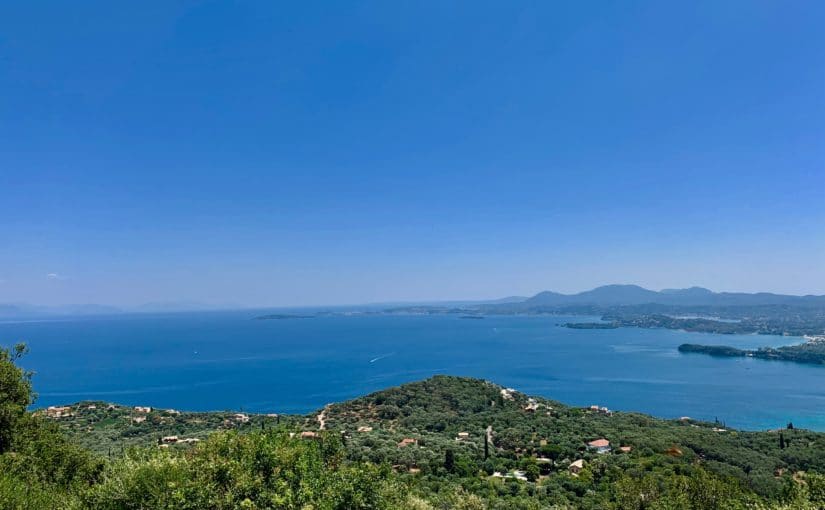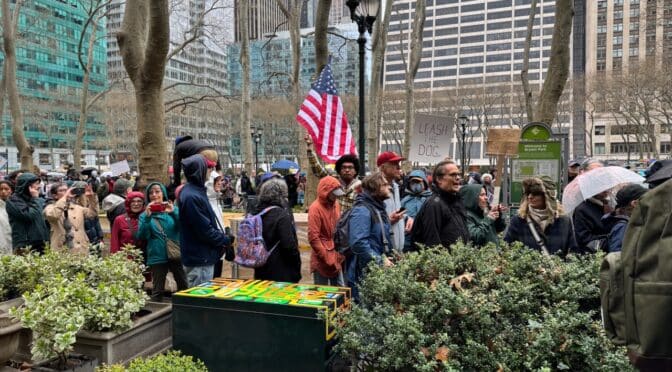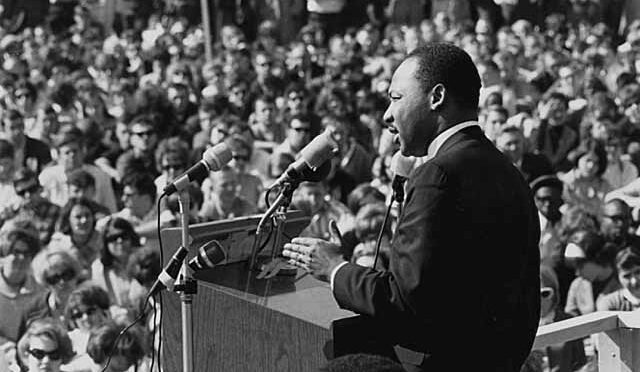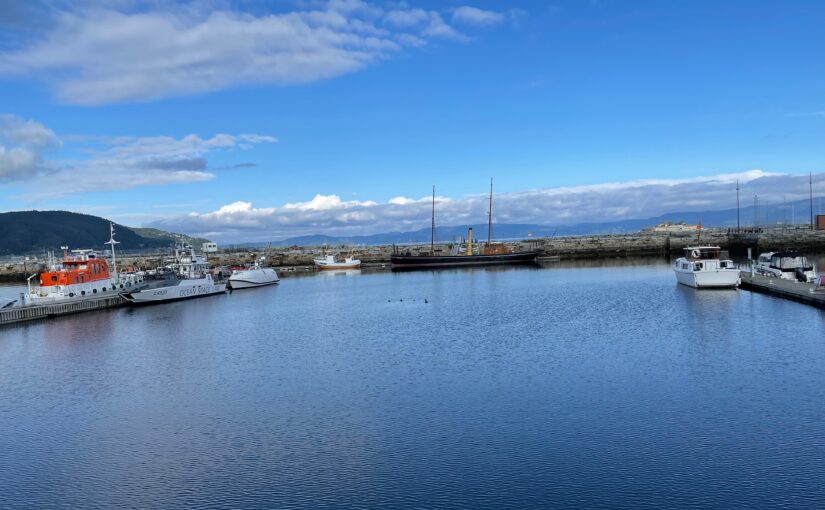by Nick Taylor and Barbara Nevins Taylor
A native of Corfu told us it was beautiful and a good alternative to the Aegean Greek Islands. We were just a day’s drive away in southwest Greece on the Peloponnese peninsula.
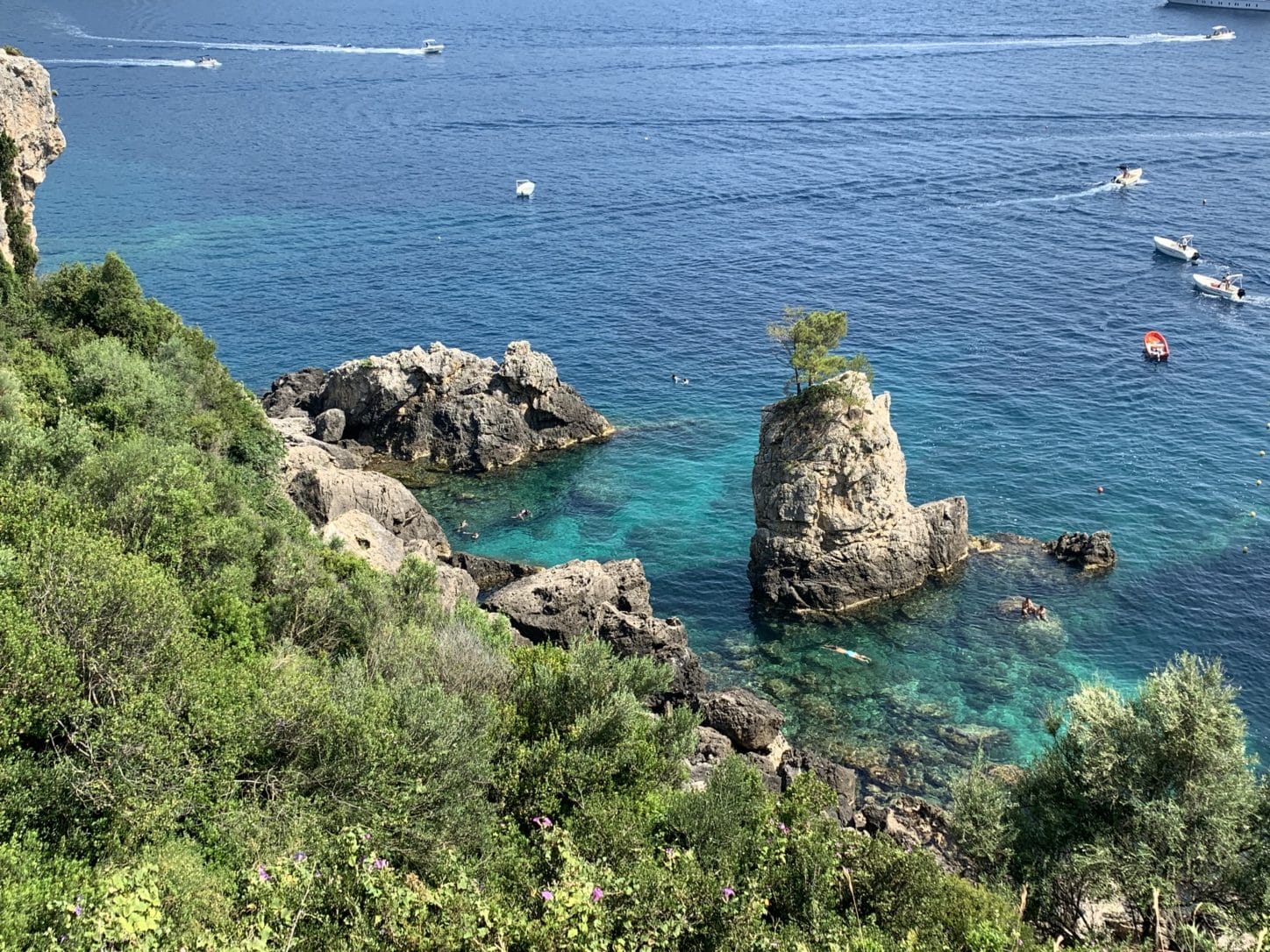
And when we looked a map, Corfu seemed like the perfect island stop.
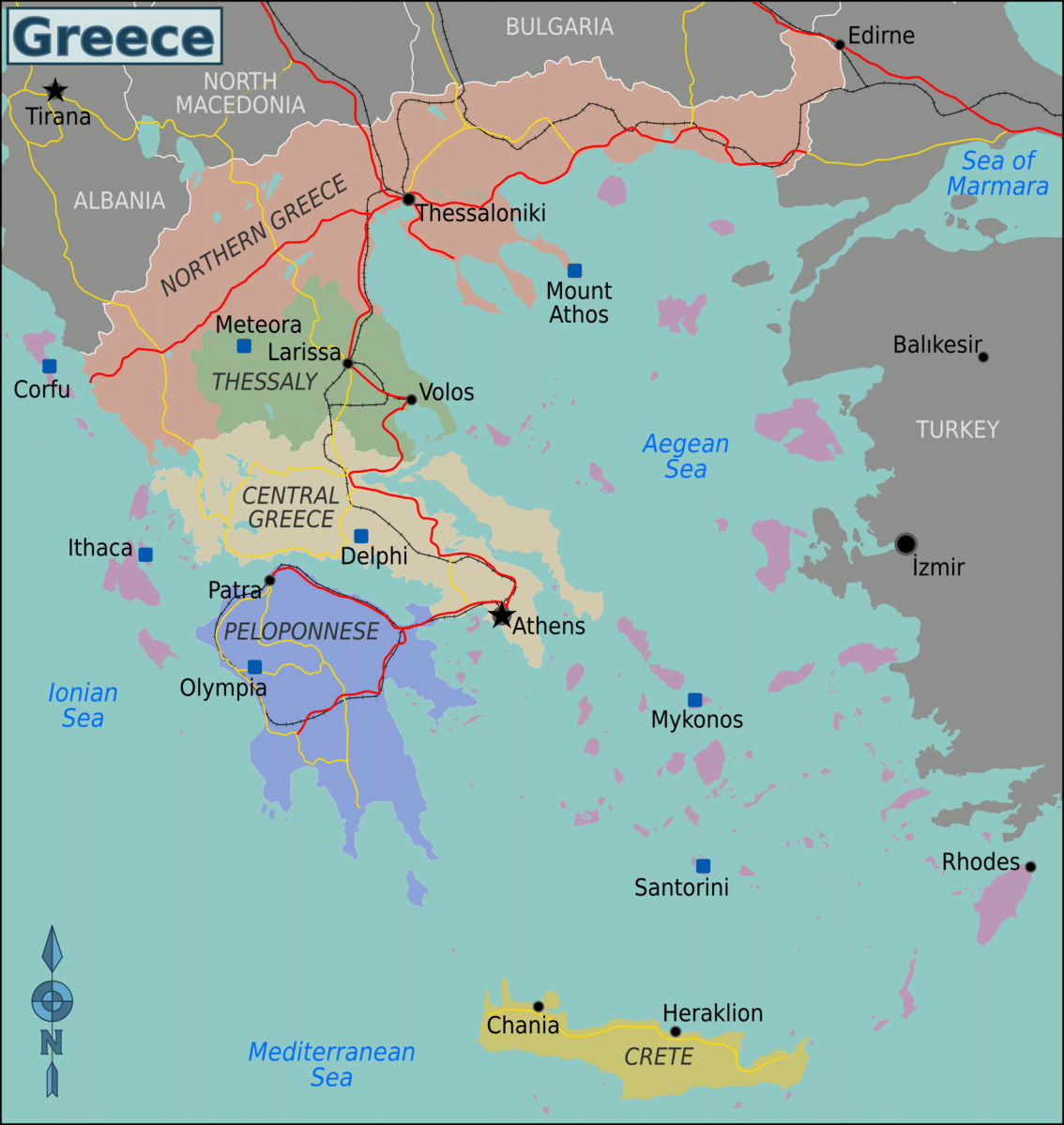
Most Americans know Corfu from Masterpiece Theatre’s “The Durrells in Corfu,” from Gerald Durrell’s book My Family and Other Animals and its sequels. A widowed mother takes her three sons and a daughter from bleak, rainy England to a sunny Greek island where they hilariously stumble, change and grow. Why should the Durrells have all the fun? we thought.
The road from Nafplio put us on the tollway toward Corinth, where we made a westward swerve and followed the Gulf of Corinth toward Patra.
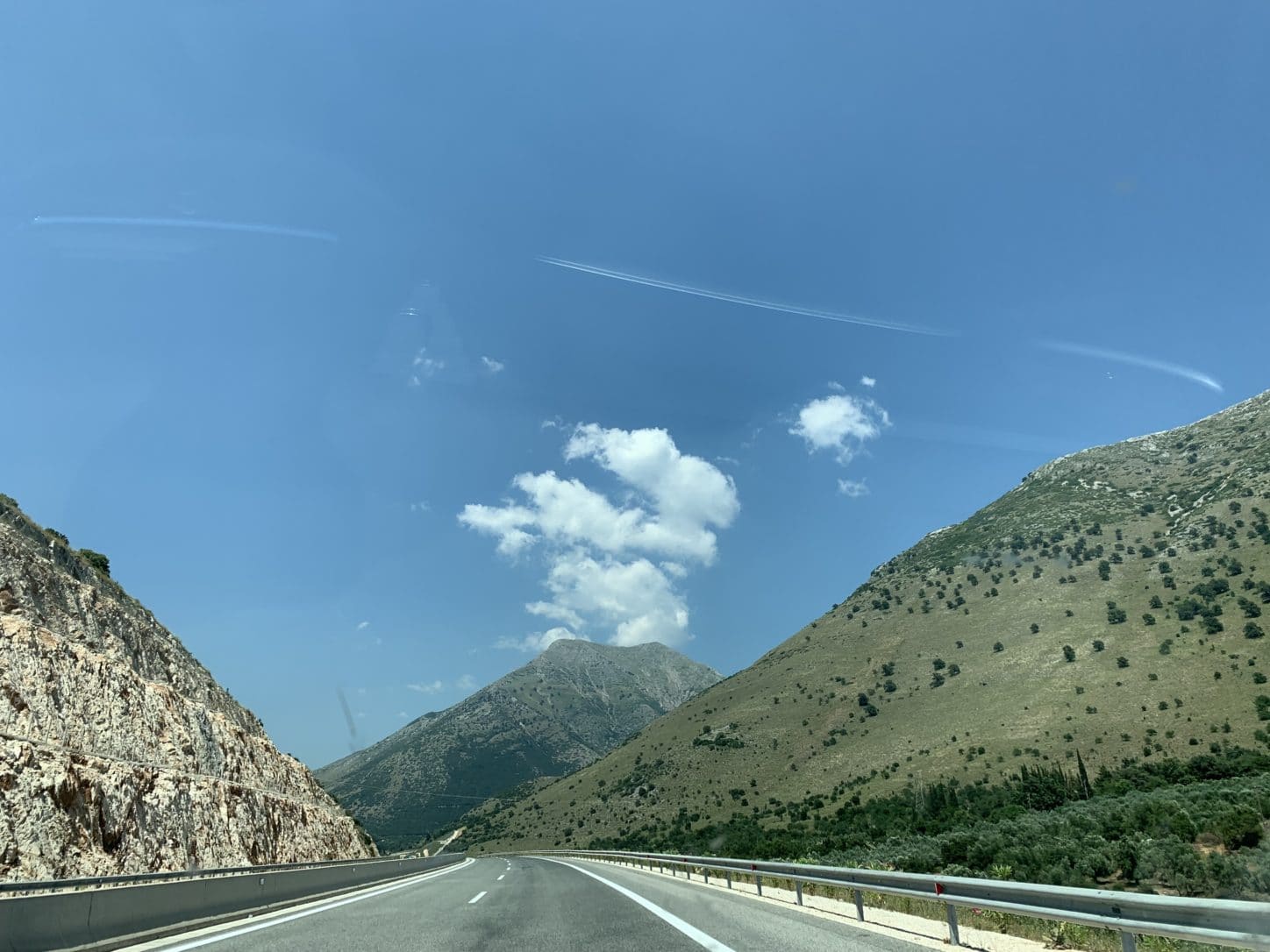
At Rio, the mile-and-a-half Rio-Antirrio bridge spans the the gulf’s cinched waist and we turned north toward the Greek mainland. The 13.50 euro bridge toll reminded us why we had the road almost to ourselves.
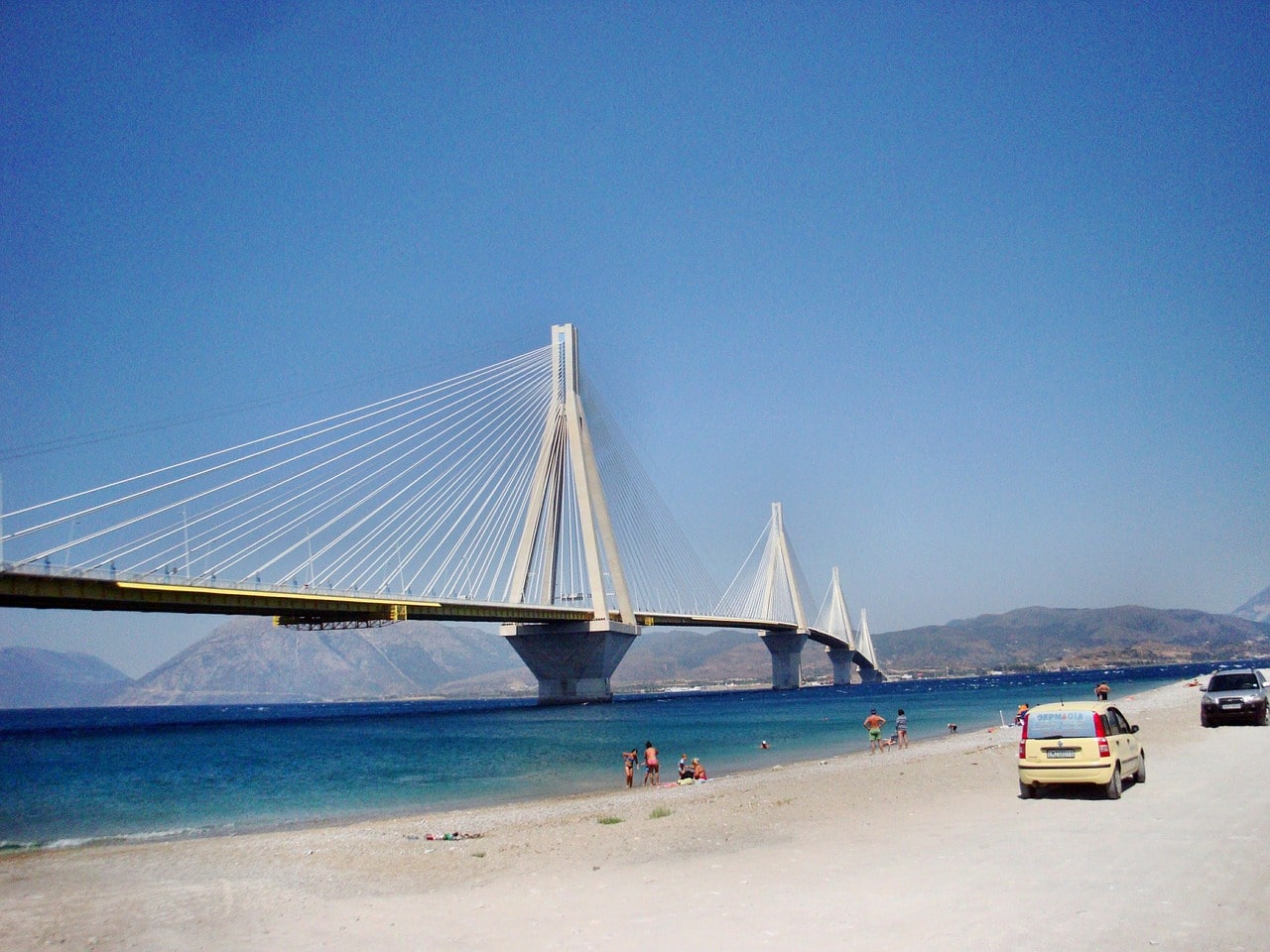
On the far side, the road carried us northwest to Igoumenitsa and the ferry to Corfu.
The huge KerkyraLines ferry waited nose-to at the dock, its bay doors open and pedestrians and drivers beginning to line up to board.
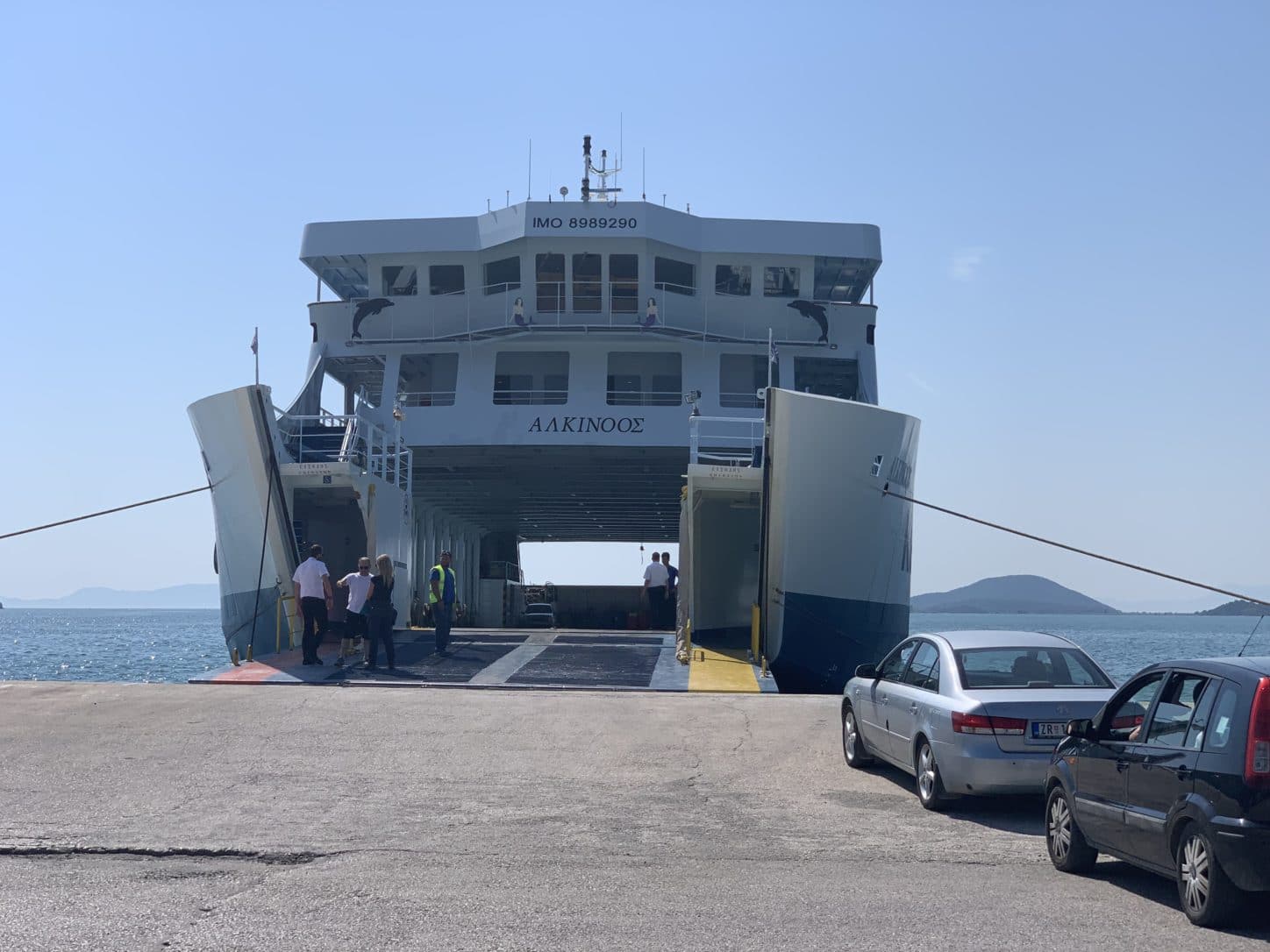
Barbara had to walk back to buy tickets before we could drive on.
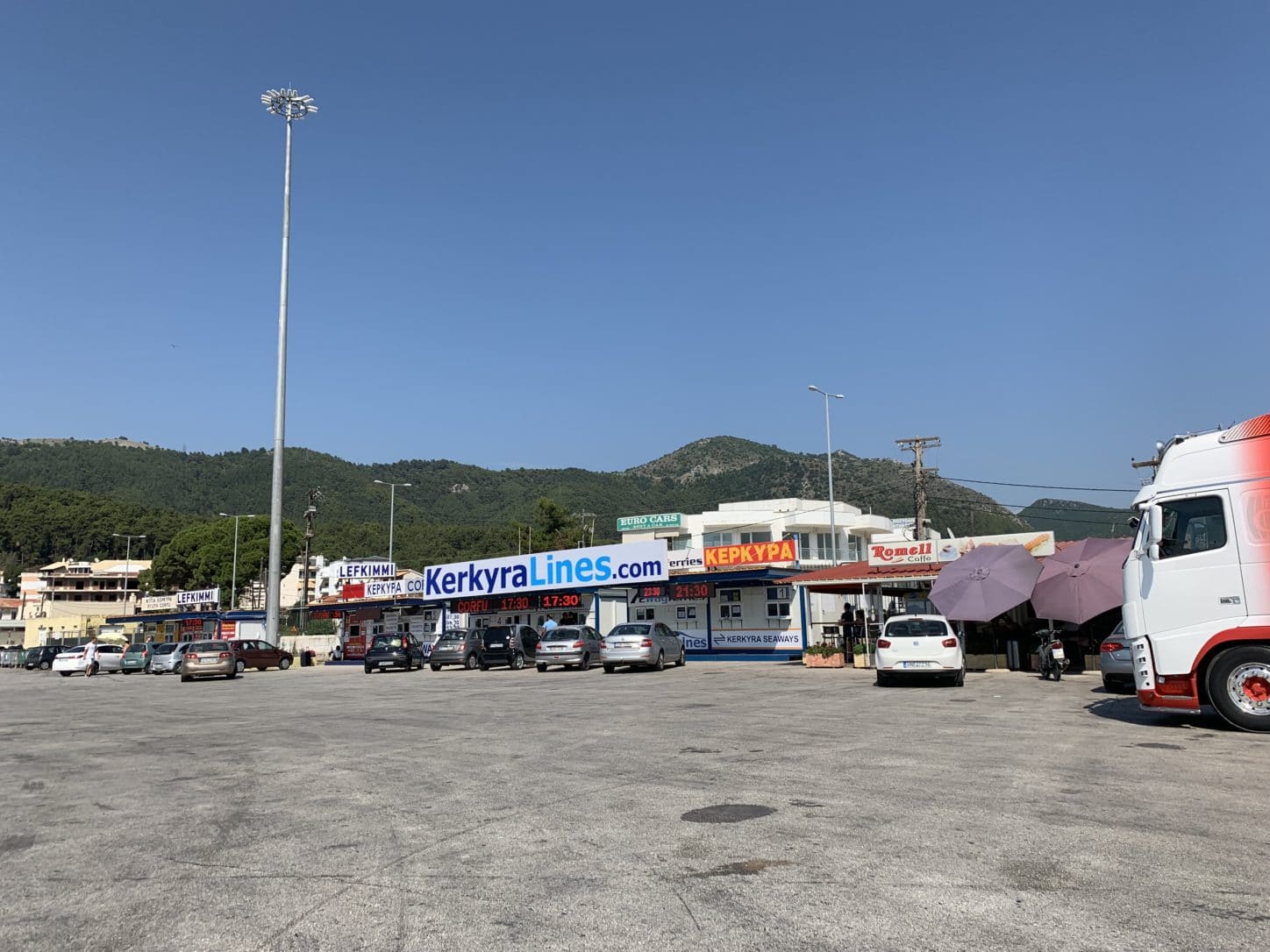
The ferry workers started waving us aboard. They directed the drivers to line up so close to one another they had to climb out before their neighbor parked so as not to get trapped inside.
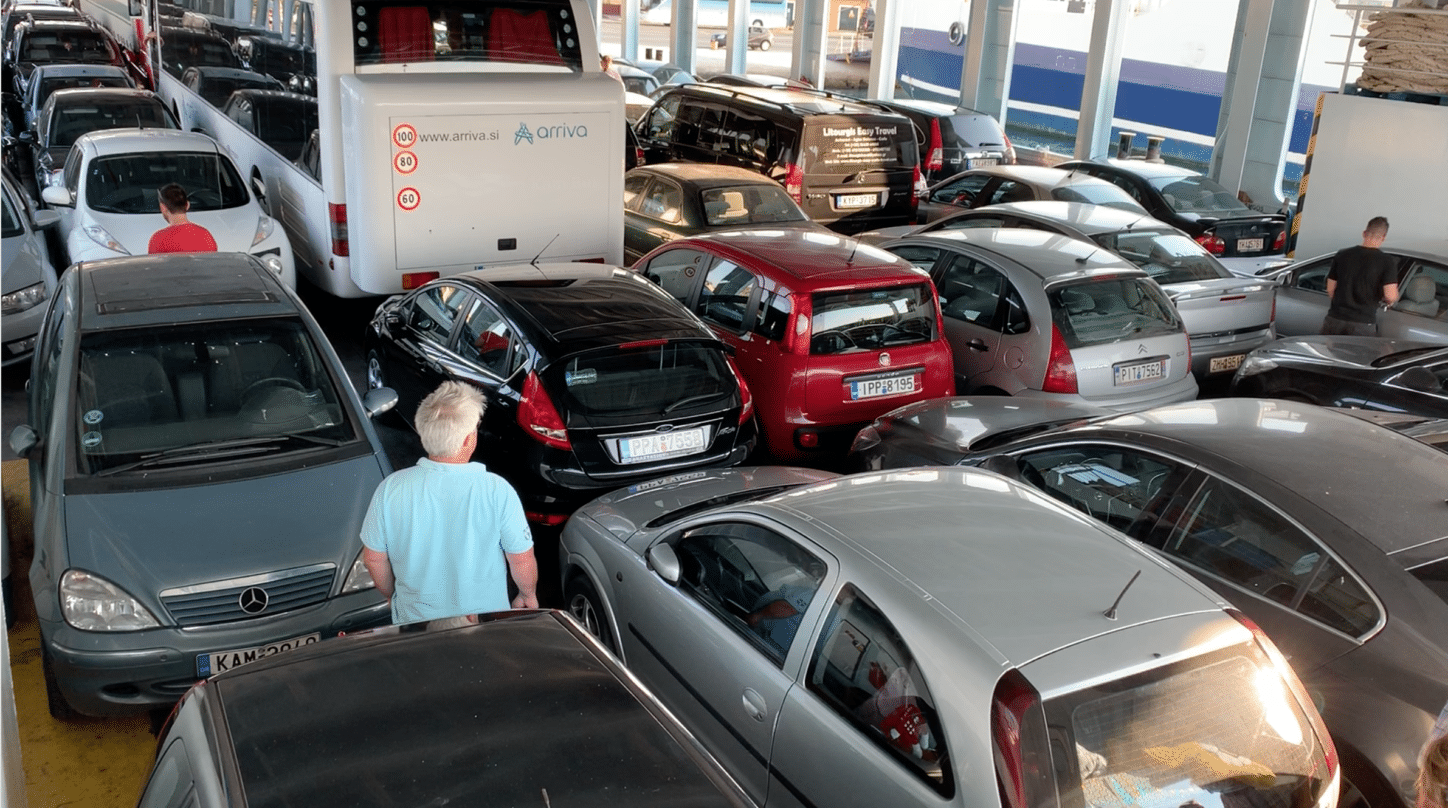
We found a table in the air conditioned passenger lounge and sat side-by-side reading Barbara’s tattered copy of Edith Hamilton’s The Greek Way. She’d read it first as a student at the City College of New York, where she now teaches. The cover price was 50 cents. Soon the boat horn blew and the ferry eased away from the dock on its 5:30 departure. On a summer Friday afternoon, weekenders crowded the lounges and deck areas and we had a lot of company inside.
A couple with a young son and daughter sat down at the table next to ours and the kids, trying to get comfortable, tumbled into us. We started to talk and learned they were from Thessaloniki and were headed to visit the woman’s parents on Corfu. Her stepfather had been a Veterans Administration doctor in California and Boston, but after his wife died he rekindled a childhood romance with the woman’s mom and moved back to Greece and Corfu.
The children warmed up as they watched their parents talk and laugh with us. The little boy began to practice his English, stuck out his hand to Barbara, “I’m Spiros from Thessaloniki,” he said. The little girl offered hard candy from a box she kept in her doll’s pocket, and when Barbara spoke to her, she turned to her mom and said in Greek, “She’s speaking English to me!”
All our attention turned to port windows as we neared the island. Corfu first appeared as a lump on the horizon across the ferry’s bow.
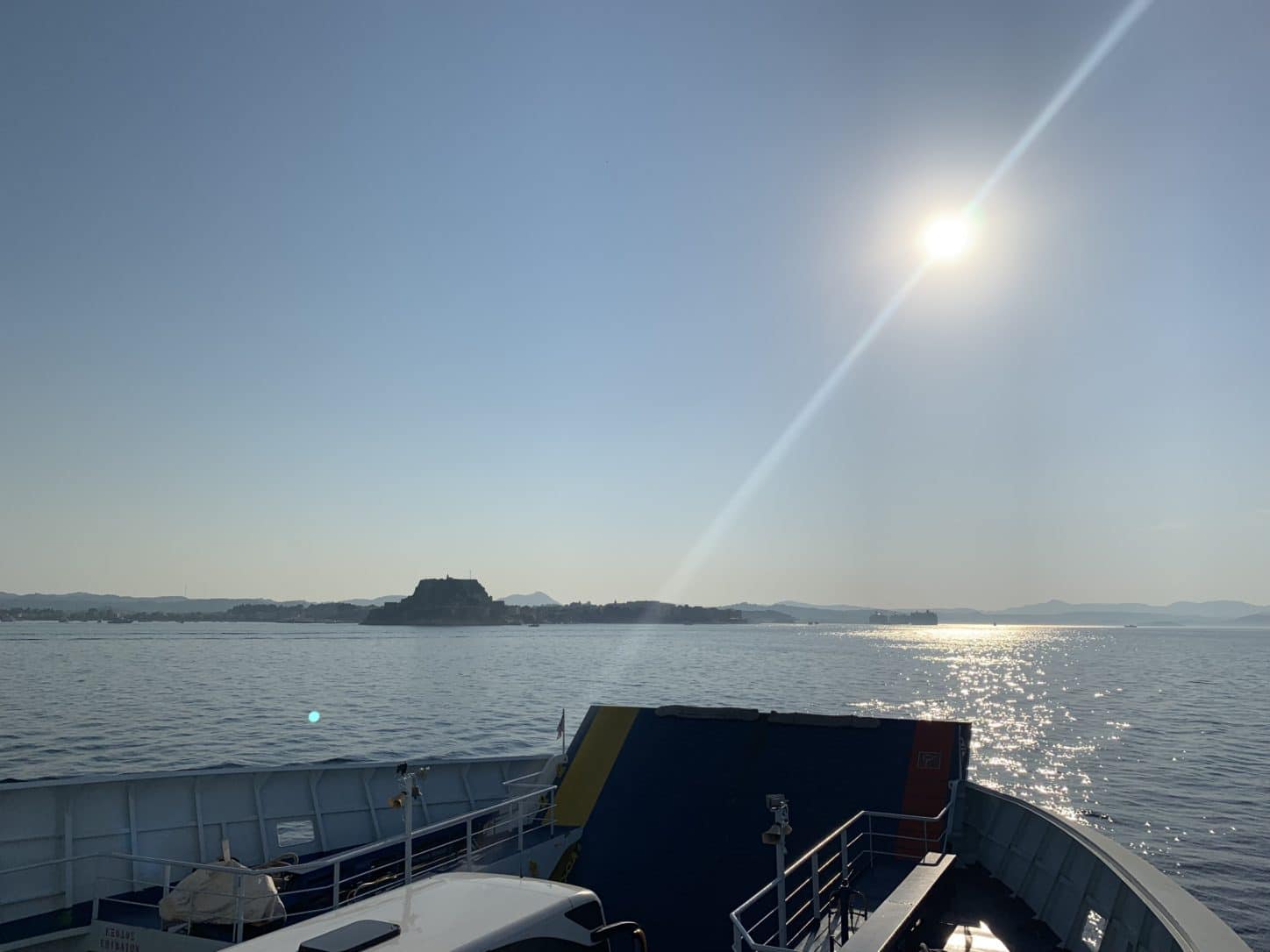
When we got closer the pastel colored buildings of the City of Corfu, the Old Town came into view. Some of the Venetian-style buildings date back more than 400 years when Venice began to rule Corfu.
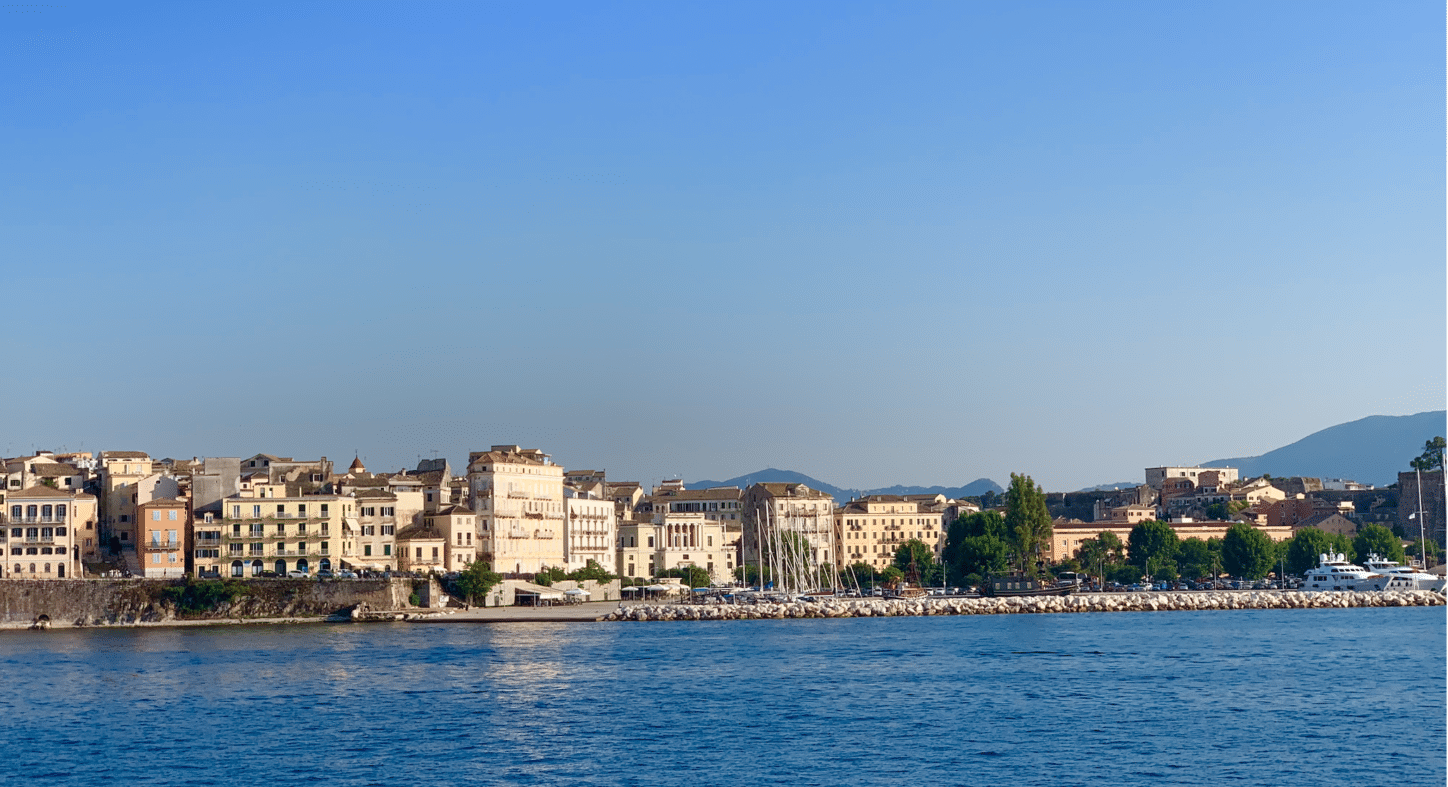
Corfu from the Ferry. Photo by ConsumerMojo.com
The lump we had seen at first resolved into the Old Venetian Fortress, predating the 16th century when the New Fortress was built, and together they held off three Ottoman invasions. Its twin towers gave the town its name by a roundabout path.
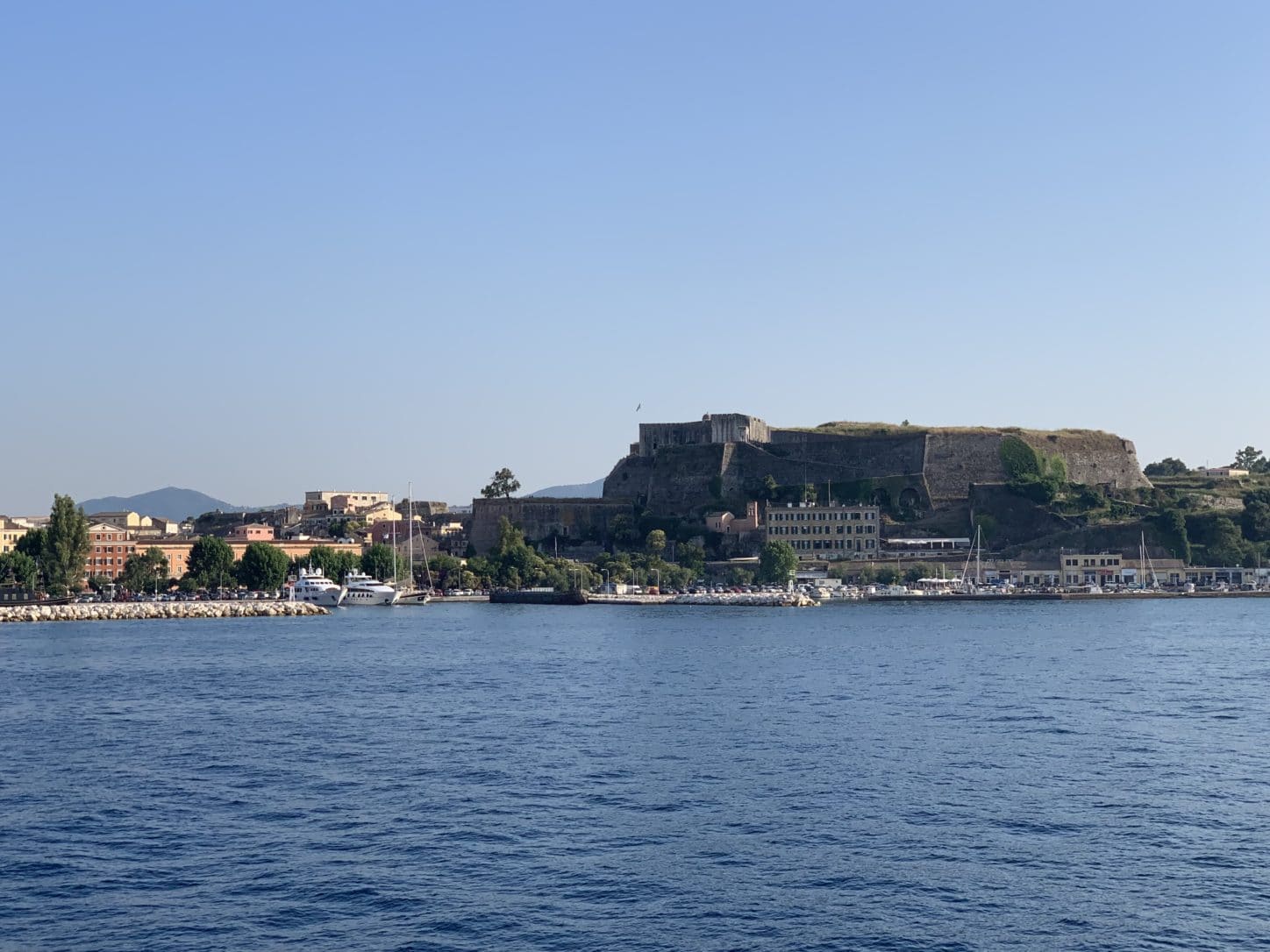
The town and island’s Greek name, Kerkyra, evolved in Byzantine Greek to Korypho, which some sources tell us means City of the Peaks referring to the Old Fortress. Corfu is the western version. The American cult TV name would have been Twin Peaks.
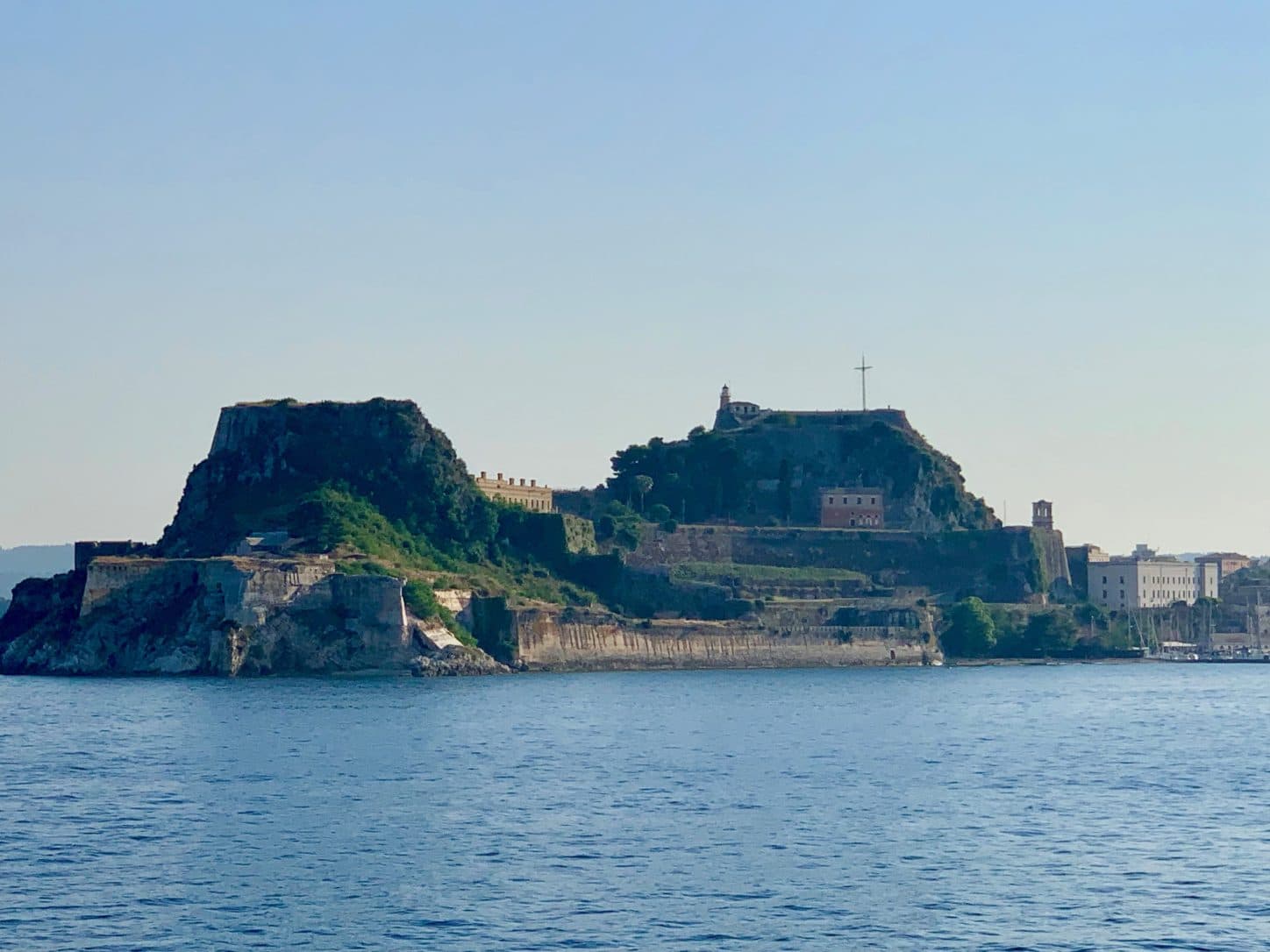
The origins of its name aside, we were at Corfu. It’s the northernmost of the Ionian Greek islands and the second largest, roughly 40 miles from north to south and 20 miles across at its northern bulge. Picture it as a ragged ice cream cone leaning left.
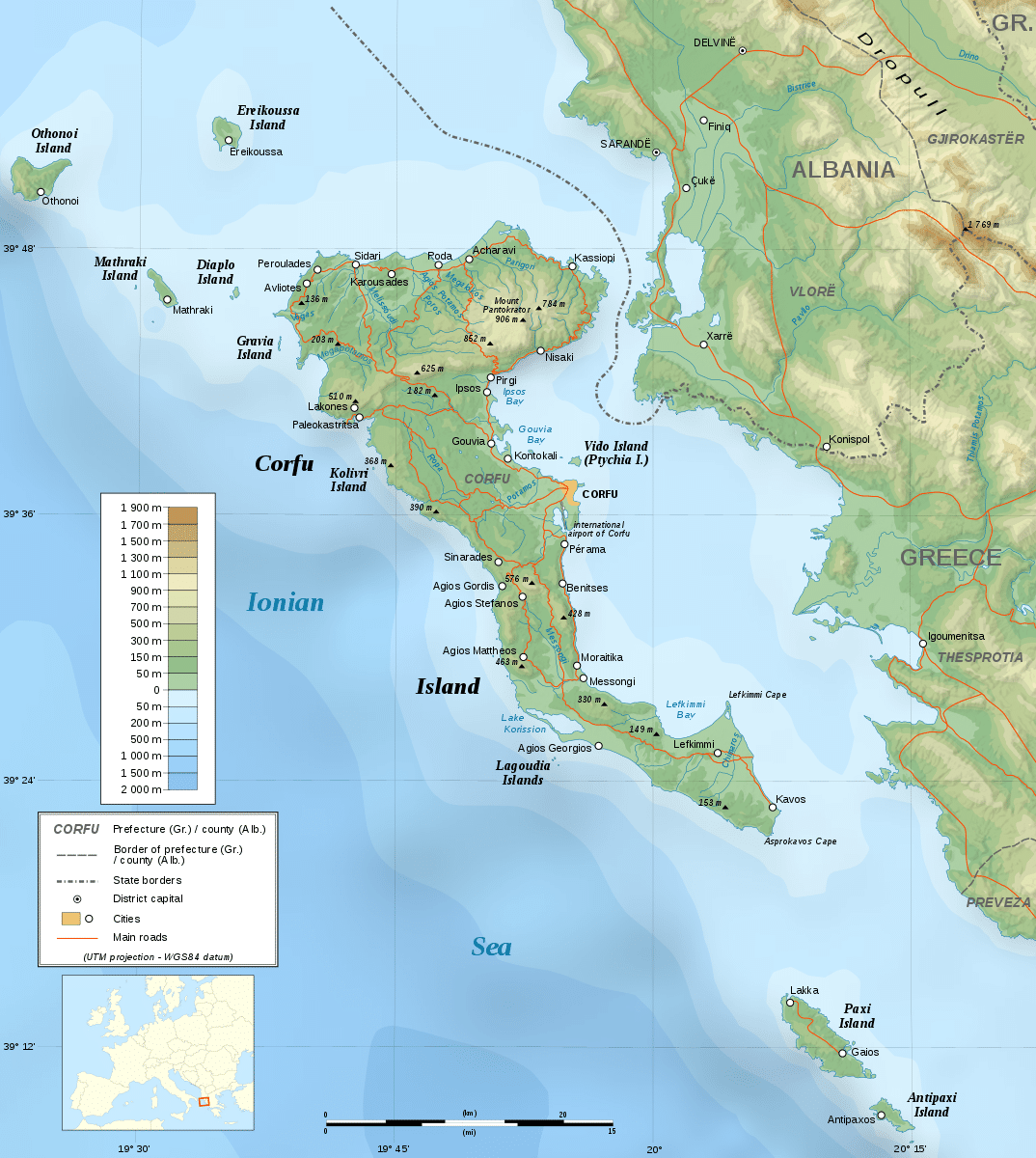
Corfu Town, the island’s capital and port, lies on a bay below the bulge and is closer to Albania than Greece. The island is also close to the heel of Italy’s boot across the Ionian Sea.
The ferry clanged into the dock at a little after 7 in the evening, with the sun still high and bright. Shouts and waves from the ferrymen directed a slow procession off the boat.
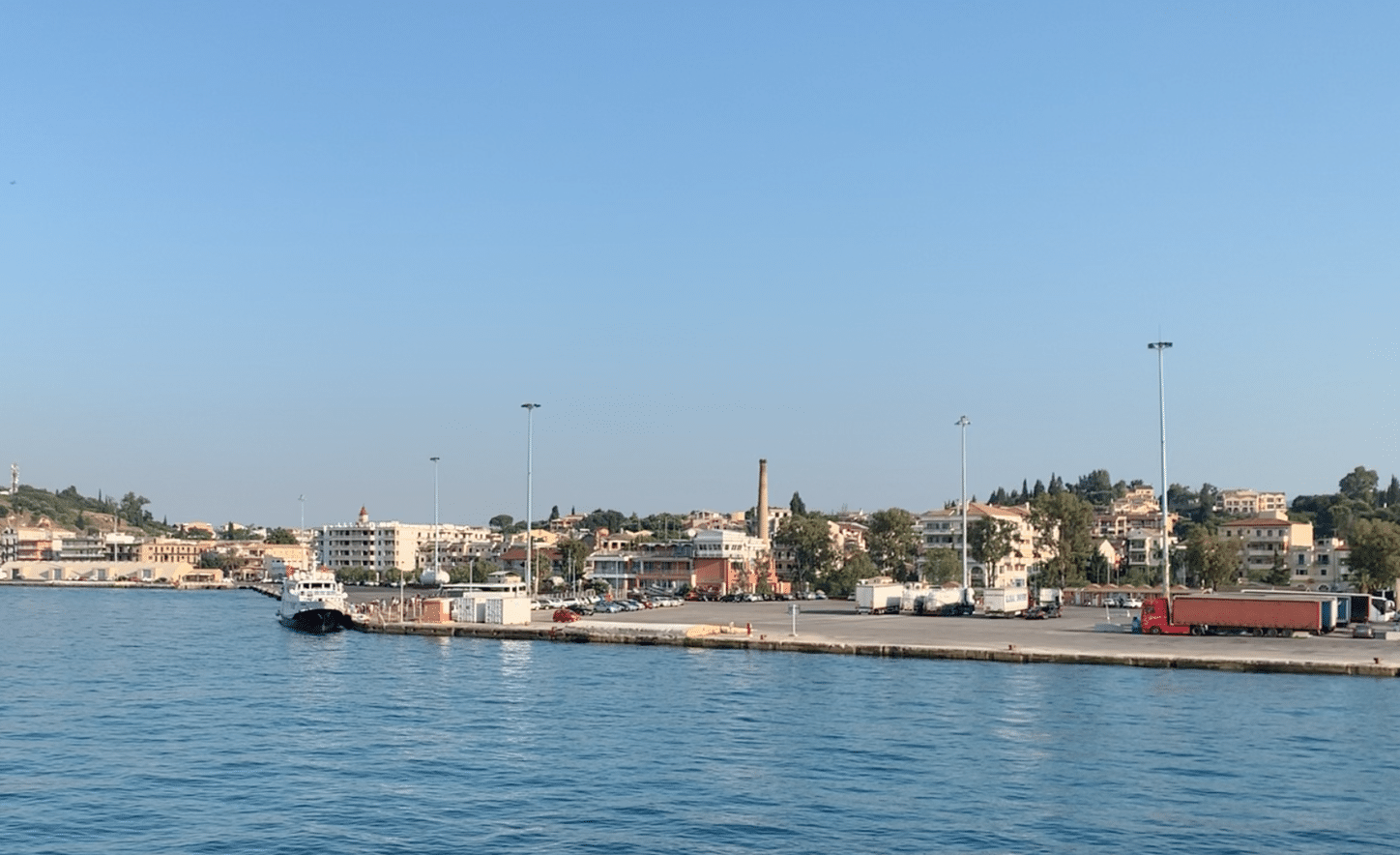
Then we were in traffic with Google and the satellite guiding us to an area called Kato Korakiana and our hotel, Castello di Vista. If we thought this would be like finding the Hilton in Midtown Manhattan, we were wrong.
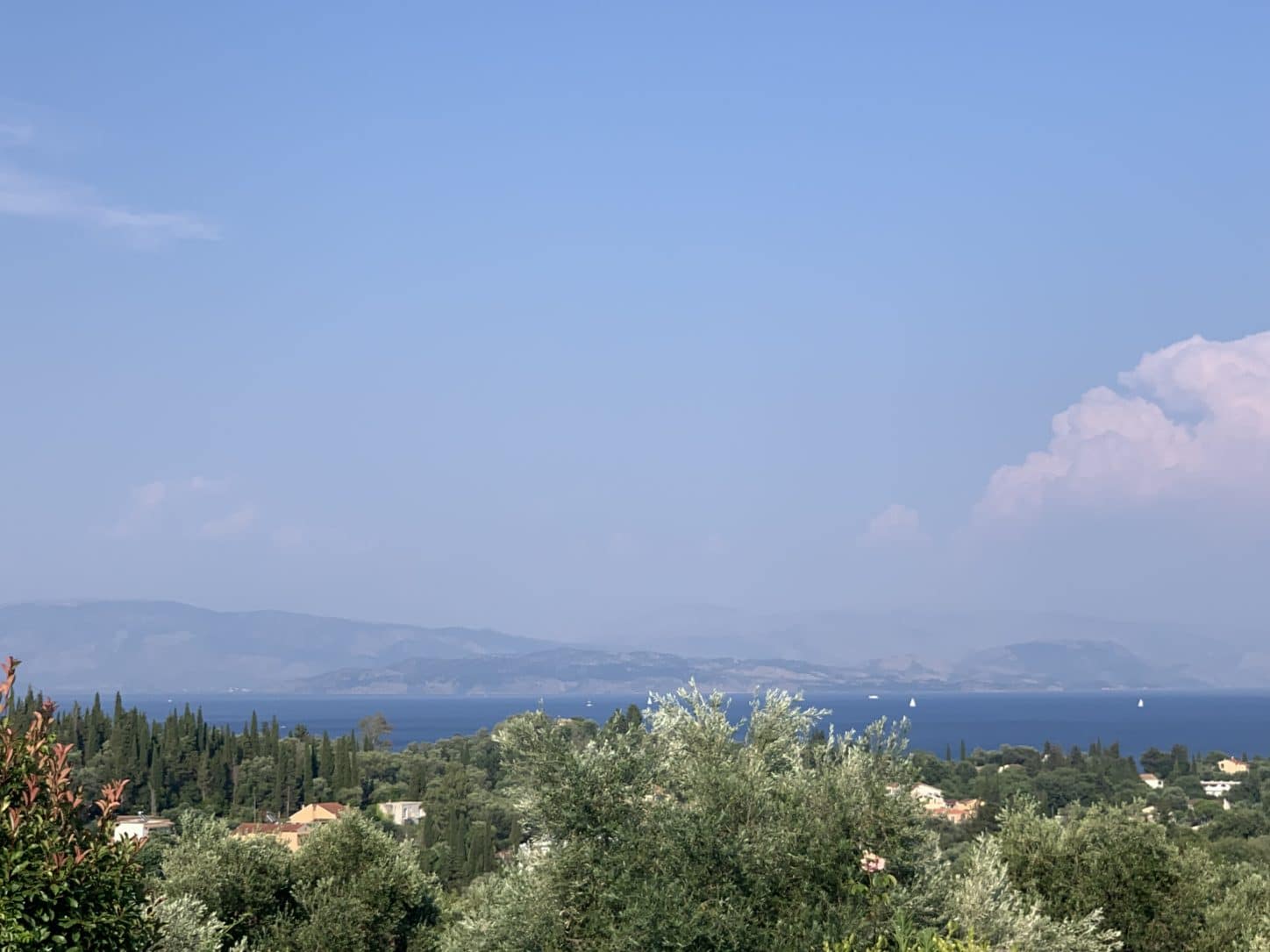
The road took us north along the coast with other traffic. Then the lady in the phone told us to turn left into the hills. Traffic disappeared along with signs and landmarks. A cafe-bar popped up, then a large square house. The road narrowed to one lane.
We turned up a sharp hill between intruding branches, then through somebody’s back yard where cars were parked. We reached a dead end, and a woman emerged from a house to see who the strangers were.
“Oh, Castello di Vista,” she said. “Nobody can find it. Go back and take the road to the right.” We finally found its gate and sign and took an uphill turn into an oasis of small detached villas. We saw no other cars and no people. “Maybe this was a mistake,” Nick said
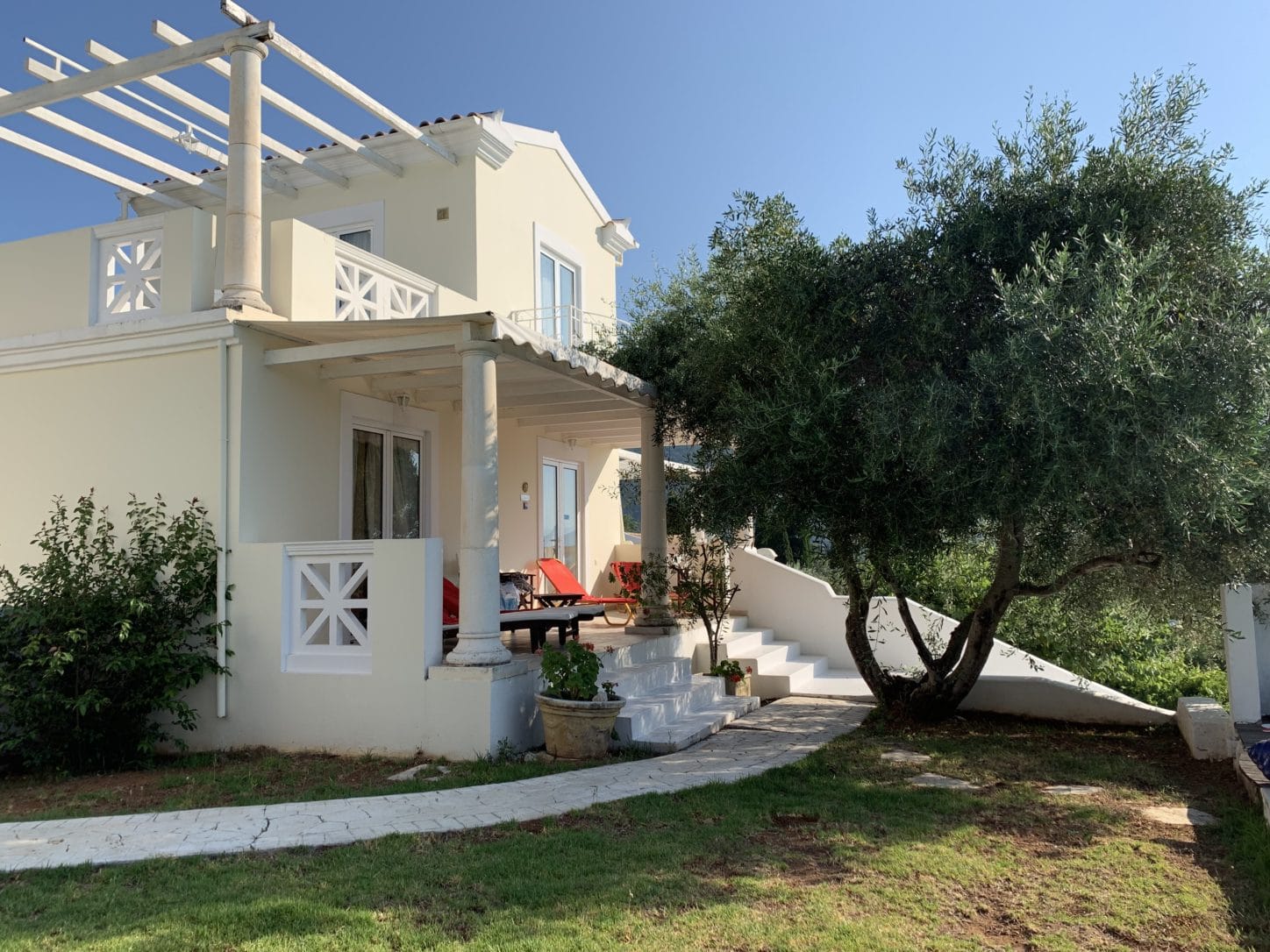
But then a woman with a broad smile came down the drive and opened her arms to hug Barbara in a warm welcome embrace. Nota Psarapolous introduced us to her husband George, who stood at the top of the sloped drive. He waved and ambled down to meet us. He and Nota built the unusual hotel and run it together in the summer when they take time away from their lives in Athens. George, we soon learned, was a world-class kibitizer. He chatted away, and joked as he helped roll our bags into our spacious suite. He turned three slim angel figurines to face away from the king-size bed and said to Nick, “In case. You know . . .
The wall of glass at the back of our suite opened to a small terrace, lounge chairs, and a walled lawn. Beyond, over the treetops glinted the Ionian Sea and the hazy Albanian coast.
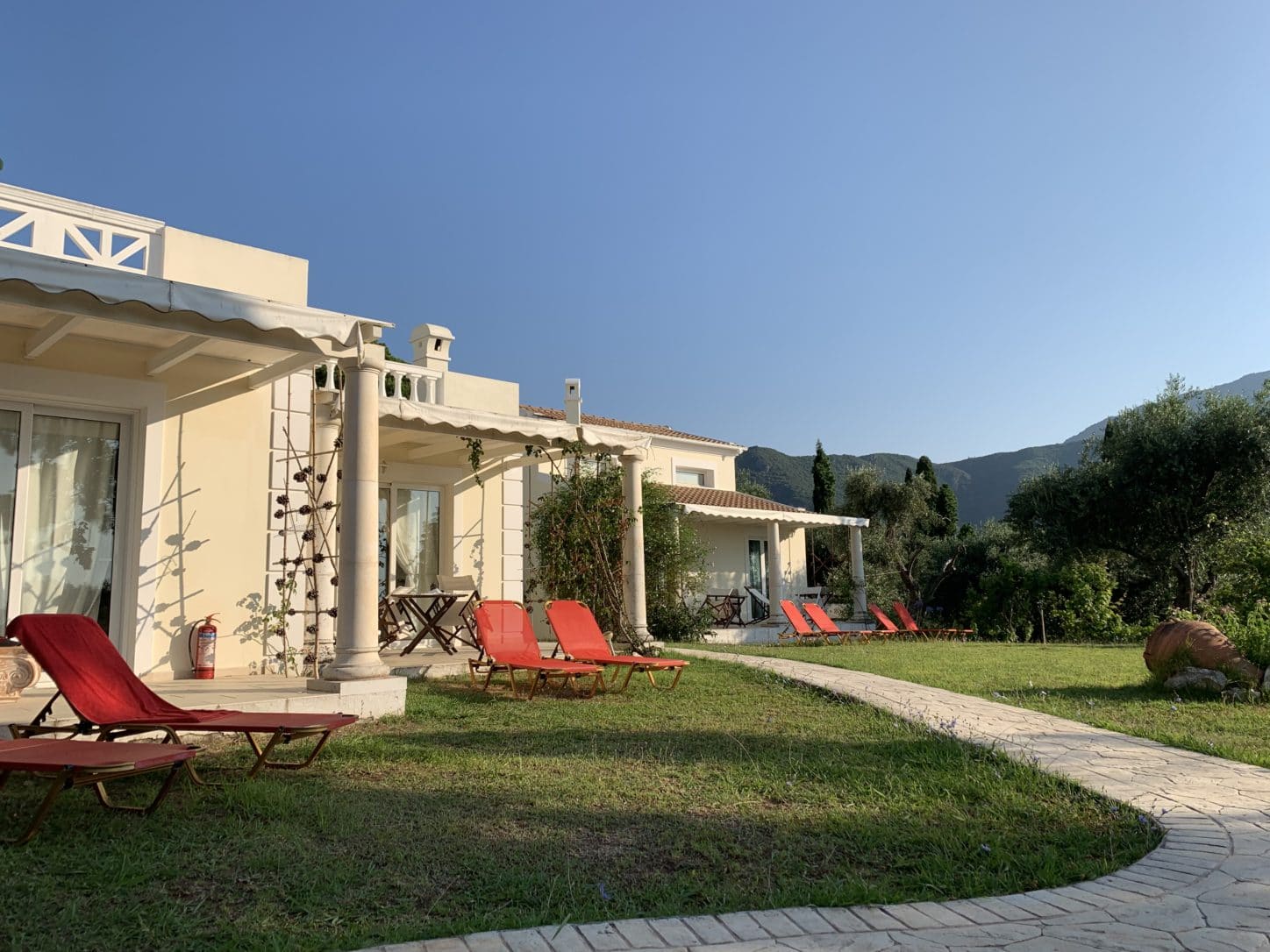
“Come up here,” George said. We followed him up some stone steps onto a terrace with a long glass table. Beyond this, an infinity pool ringed by lounge chairs and umbrellas looked out to the sea.
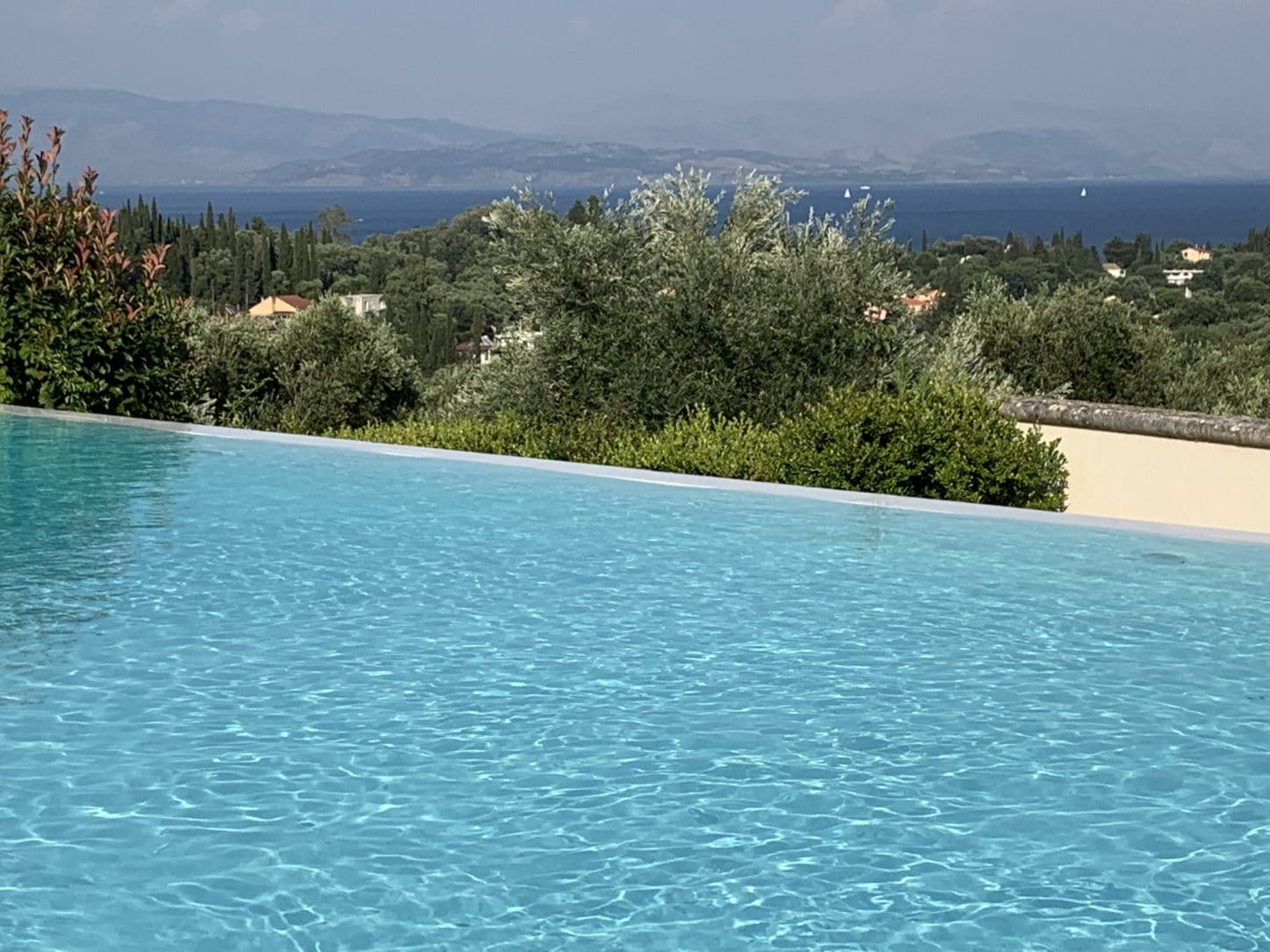
We sat down at the terrace table and Nota joined us. Oddly, Castello di Vista didn’t take credit cards. We’d reserved through booking.com and then had to wire a down payment to the Investment Bank of Greece. The wire transfer carried a $35 fee. Nota had come up with a balance of around 300 euros that we’d have to pay in cash. So a trip to an ATM was in our future.
As we talked, we learned Nota was a cancer specialist at an Athens hospital and a former Greek representative to the European Union. George had been a civil engineer. They had bought the land intending to build a house for themselves and a guest house. “She asked me for money for a house, and we ended up with a hotel!” said George in mock chagrin.
We had spent a long day on the road and it was getting dark. “Where should we eat?” Barbara asked. “Someplace close,” Nick added. “That serves fish,” we both said.
George and Nota came up with a name. “It’s just at this end of Ipsos Beach,” George said. “Only ten minutes. I’ll let them know you’re coming.”
A combination of Google and Apple led us out of Kato Korakiana’s hills to a long, shallow arc of beach. Lights were starting to come on in the string of hotels, restaurants and shops behind the road along the beach. The Asterias restaurant was next to a marina at the close end, and we took one of the open tables at the edge of the terrace nearest to the water.
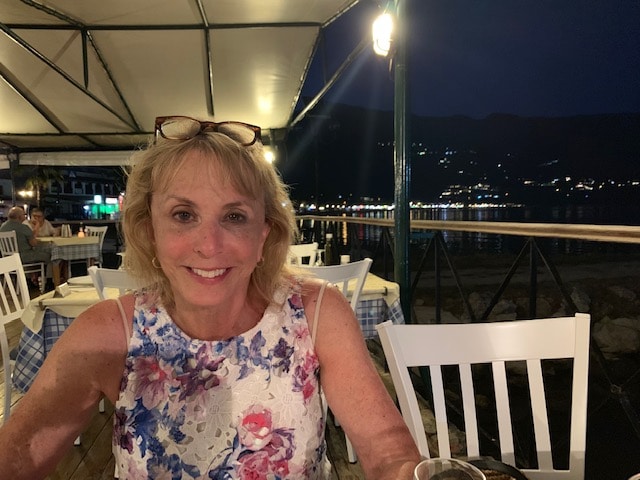
Exhausted from the long day, we enjoyed the setting as Barbara ate swordfish and Nick grilled tuna, accompanied by a modest amount of house white wine because Nick had visions of getting lost in the Kato Korakiana maze and wandering till daylight. But we found our way back to Castello di Vista with no problems.
The sun woke us the next morning and a dip in the pool finished the job.
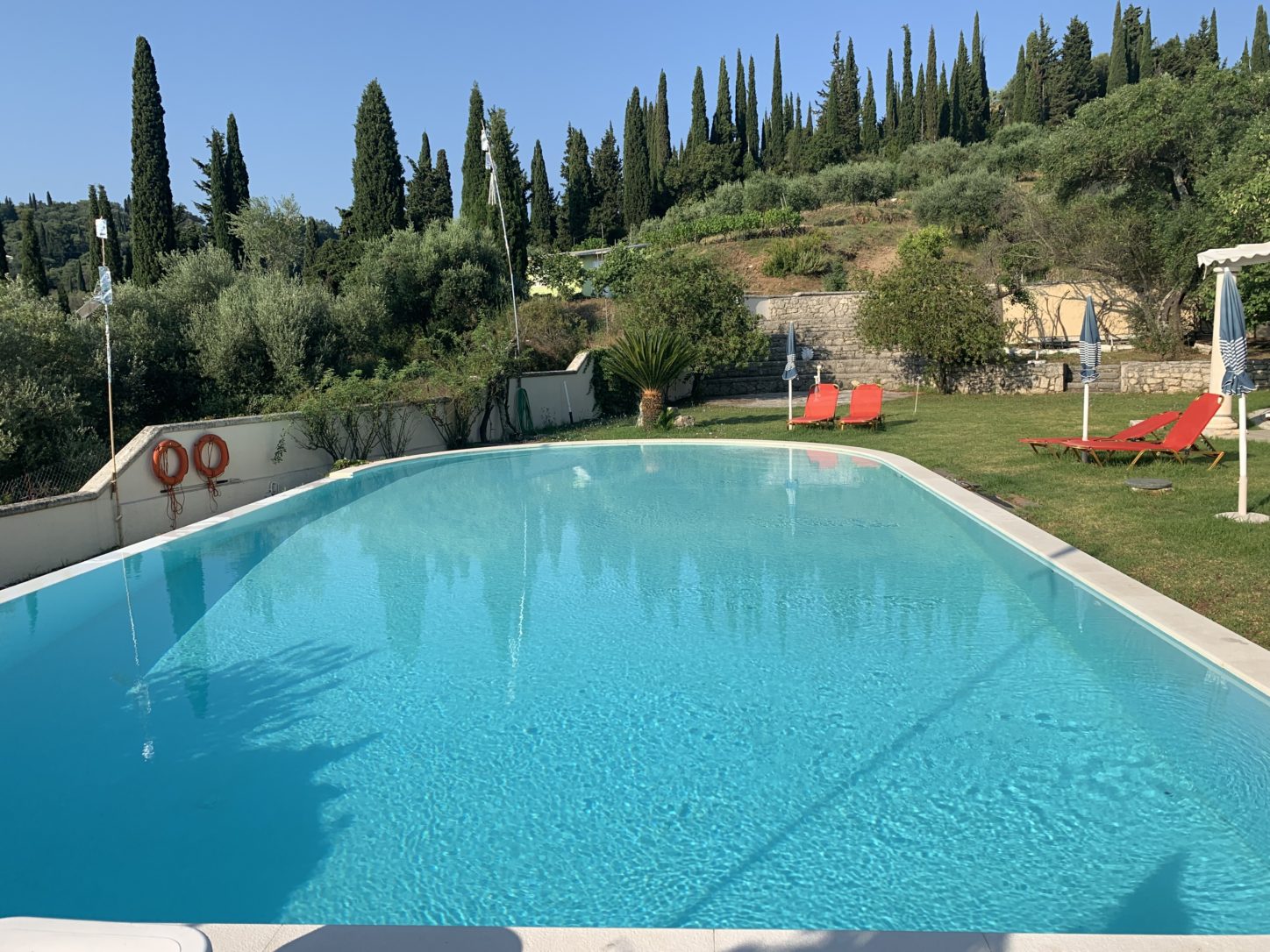
Then we joined George and Nota for the second shift at breakfast on their terrace. A card at our place read: “Reserved for the best couple of the hotel.” We decided that was just George being over the top. Also, it looked like all the other guests were families with children. “You made a fatal mistake,” George informed us. “What’s that?,” we asked in unison. “You did not pull the blackout curtains. Without that the sun comes into your room, and you will roast.” We fixed that problem and George added a standing fan to circulate the air conditioning at night.
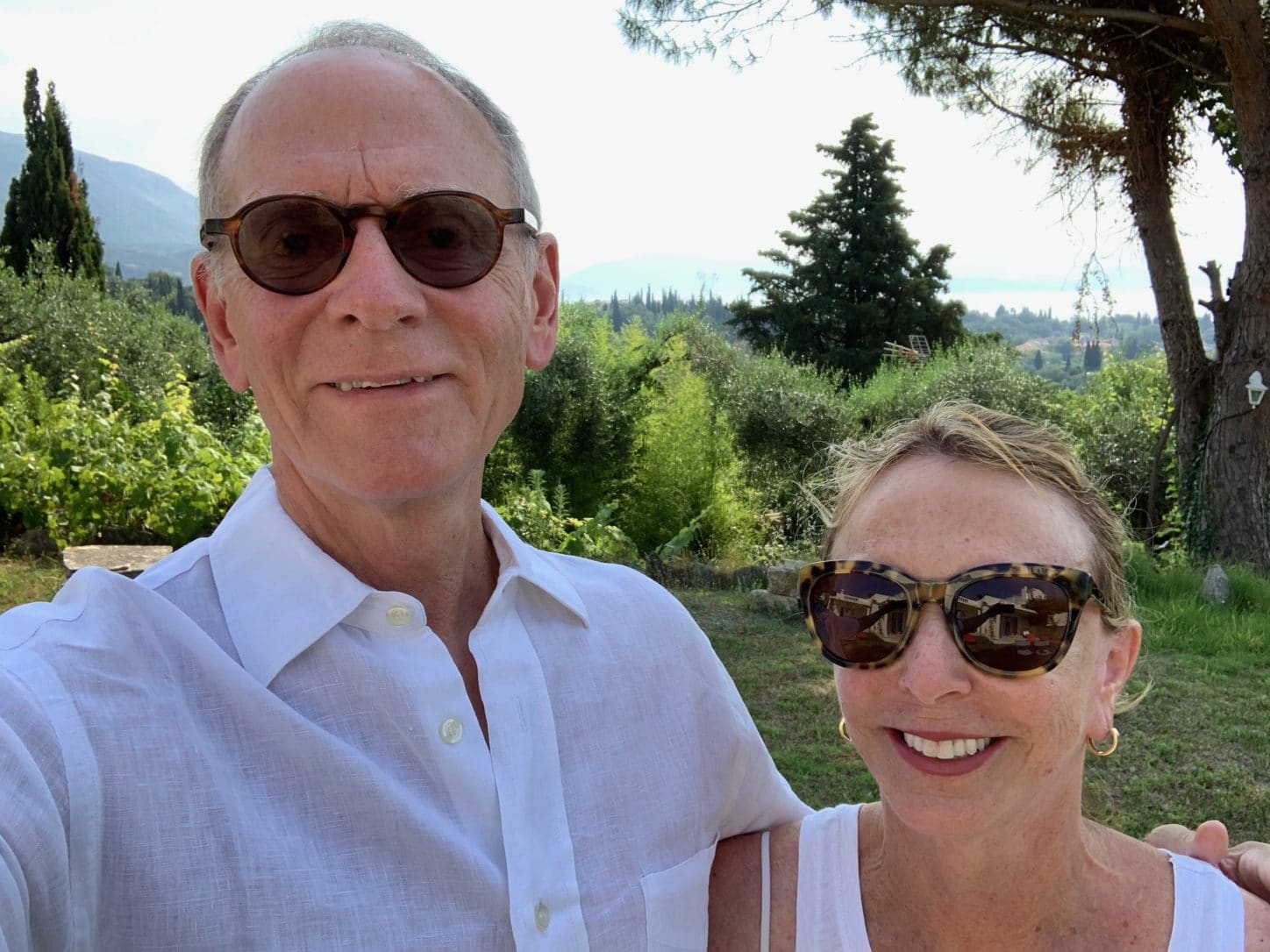
We had come to Corfu thinking we might see a little beach time. George and Nota recommended some spots and George loaded us up with an umbrella, a couple of mats and some beach towels. But first we decided to see what Corfu Town was like. We drove south, turned east into the town crowded with Saturday traffic, found police waving drivers away from the municipal parking lot, and captured an open roadside spot near the Old Harbor and close to an in-town beach.
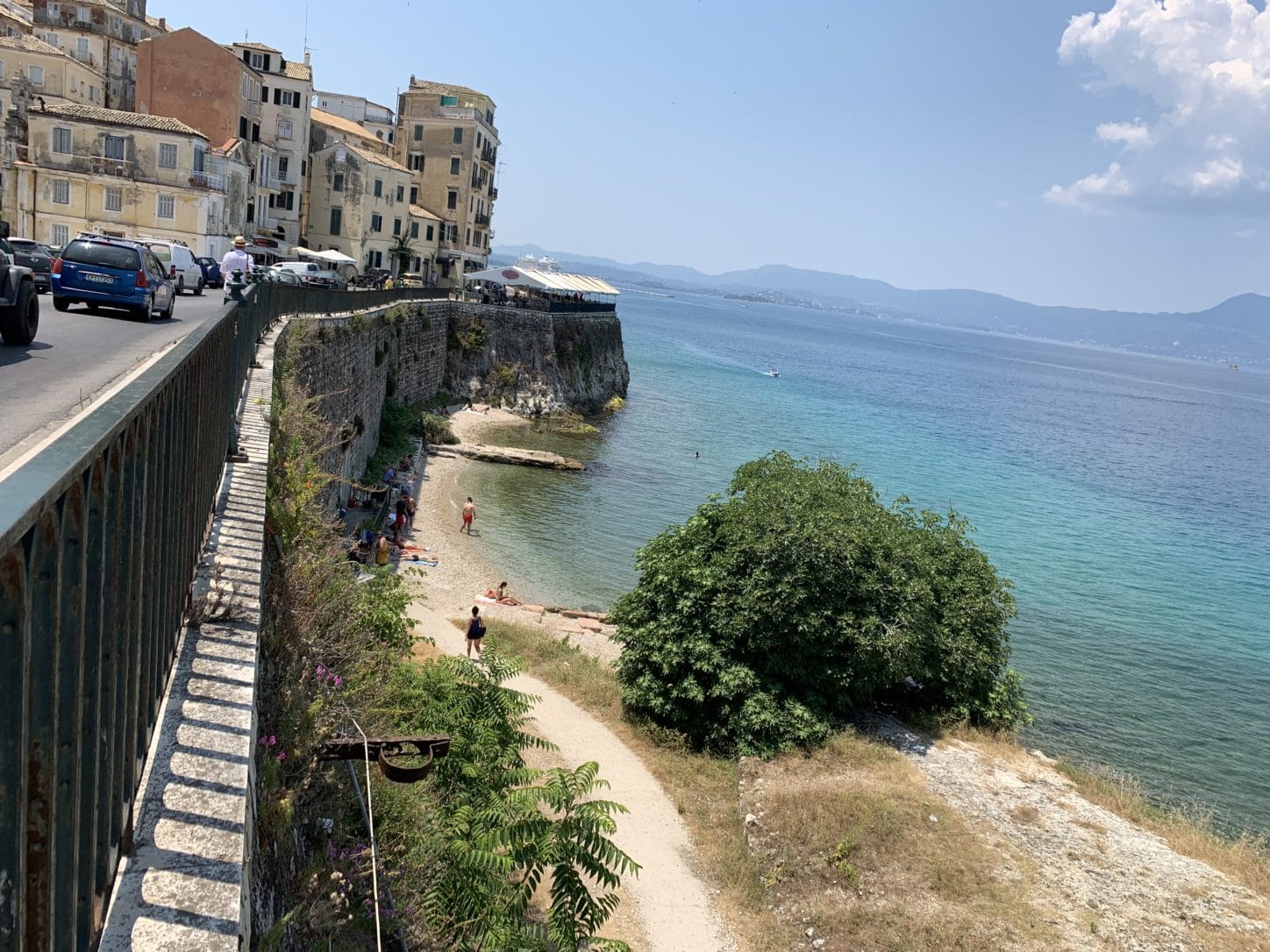
Nick went into a small hotel and got a tourist map. We found that all walks led up in the hilly town. The first thing we saw was Corfu Town’s Metropolitan Church, the Eastern Orthodox equivalent of a cathedral church.
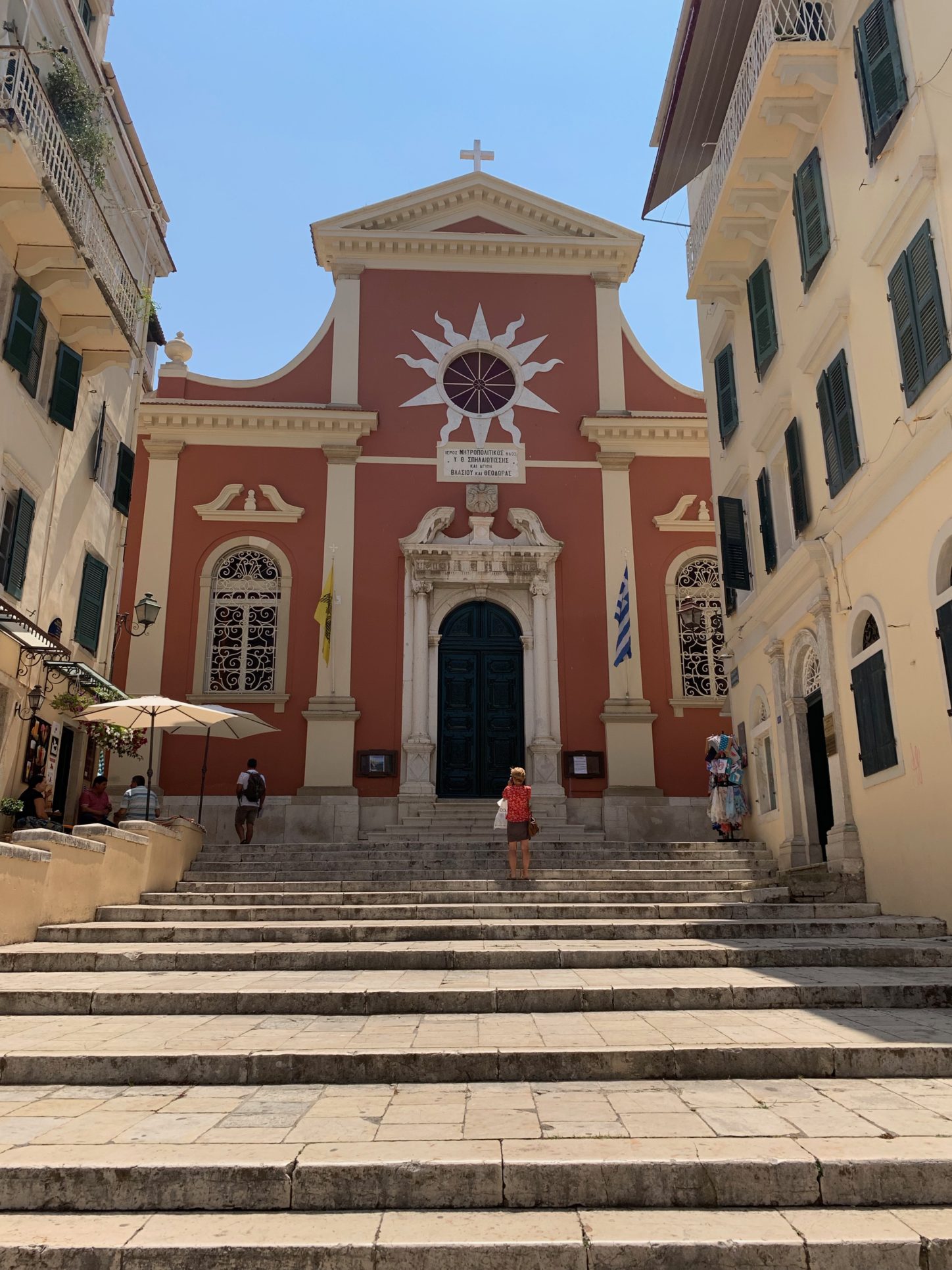
The church was closed up tight and we consulted our map and headed for the nearby Byzantine Museum. We got lost in the maze of streets and alleys and stopped a woman carrying groceries, and holding a leash for a small black dog. “I’m going that way,” she said. “Follow me.”
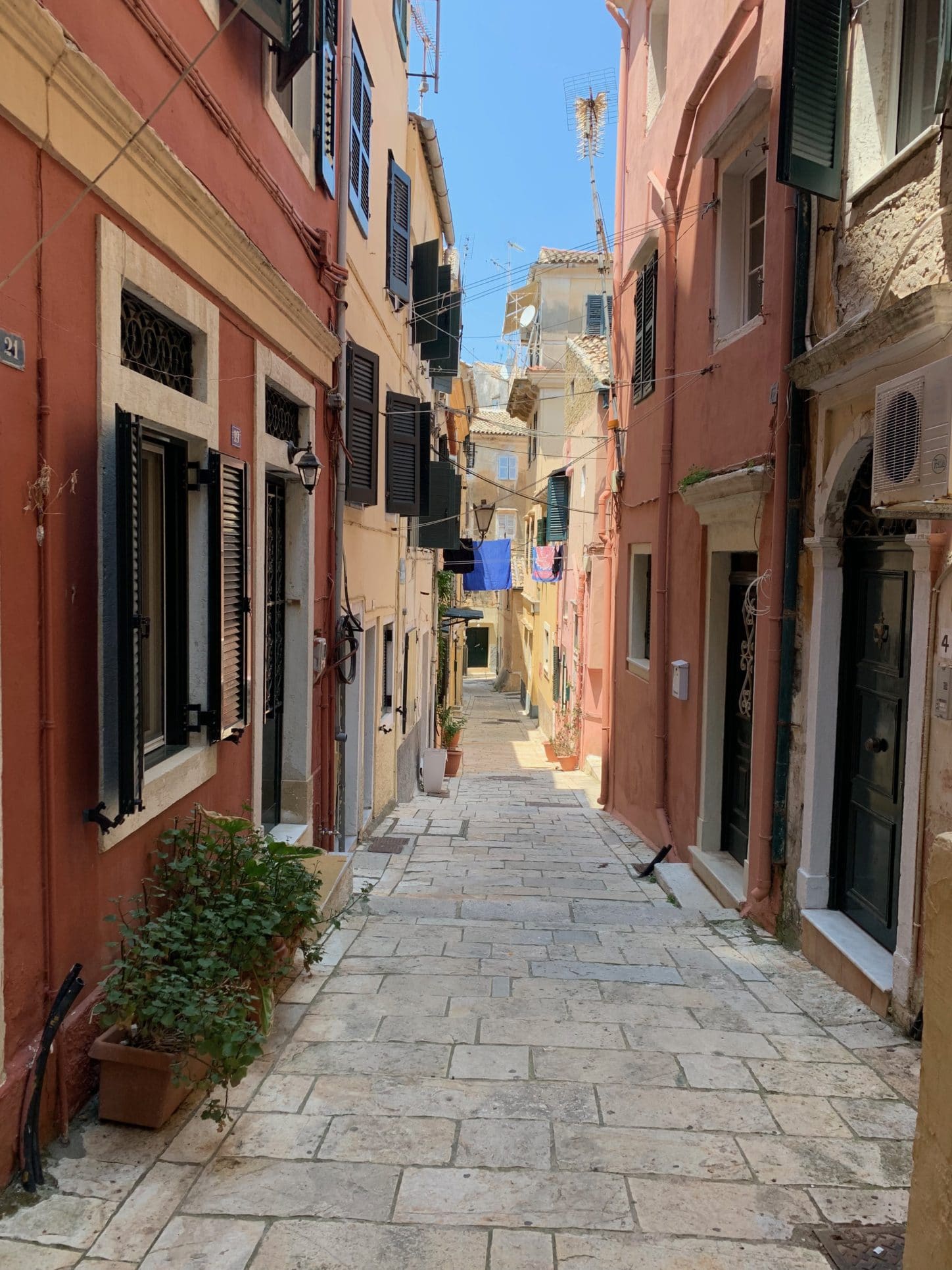
We wandered around a bit to find the entrance and the two people sitting at a small table, in dim light, took our 2 euro admission fees. Older people get a break. Usually the fee is 4 euros.
We realized quickly that we got a bargain and wondered why we were the only visitors. More people should visit this museum. It displays religious art and icons dating to the 16th century. It surprised us to see that artists depicted the baby Jesus with a mature face.
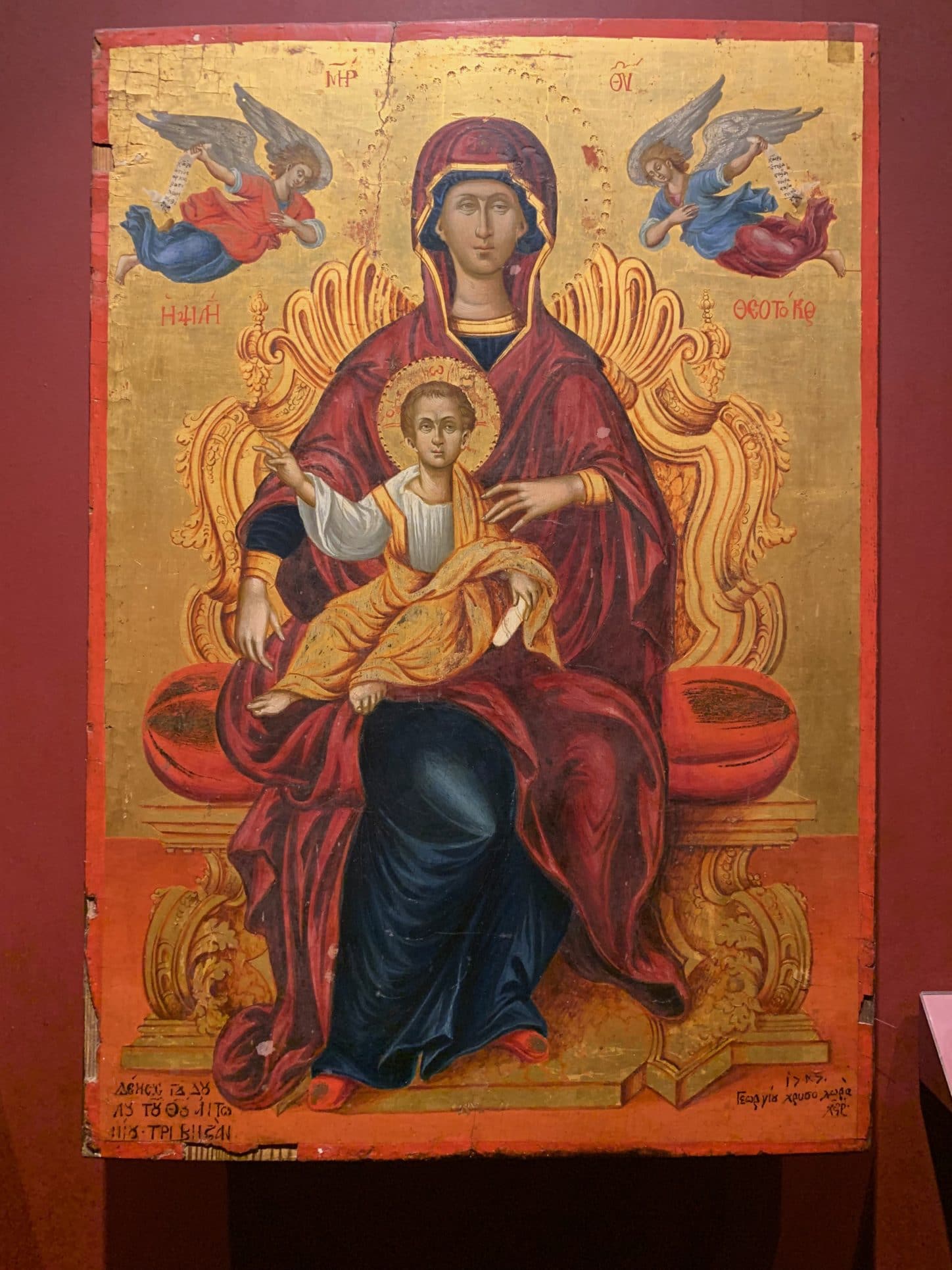
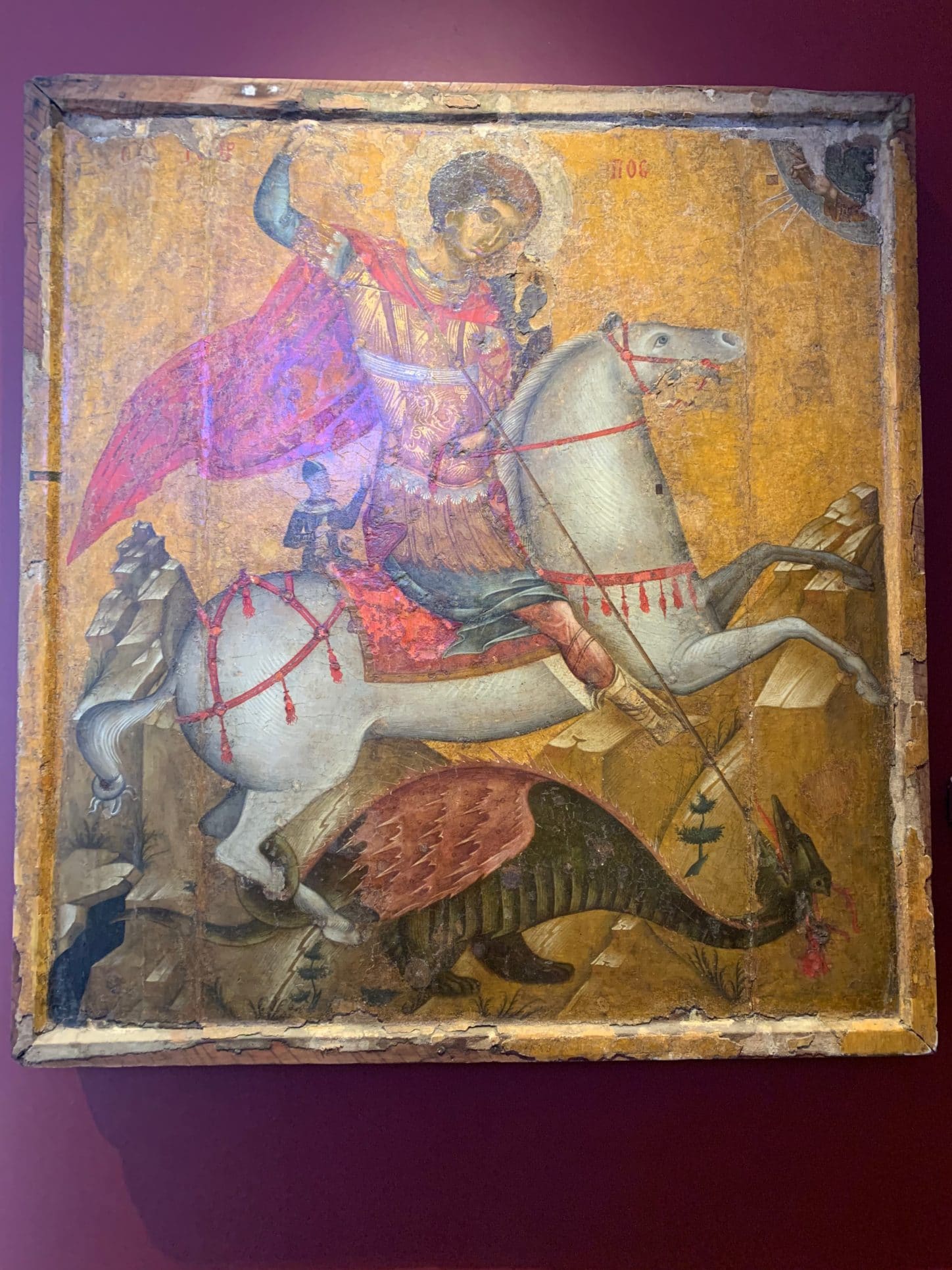
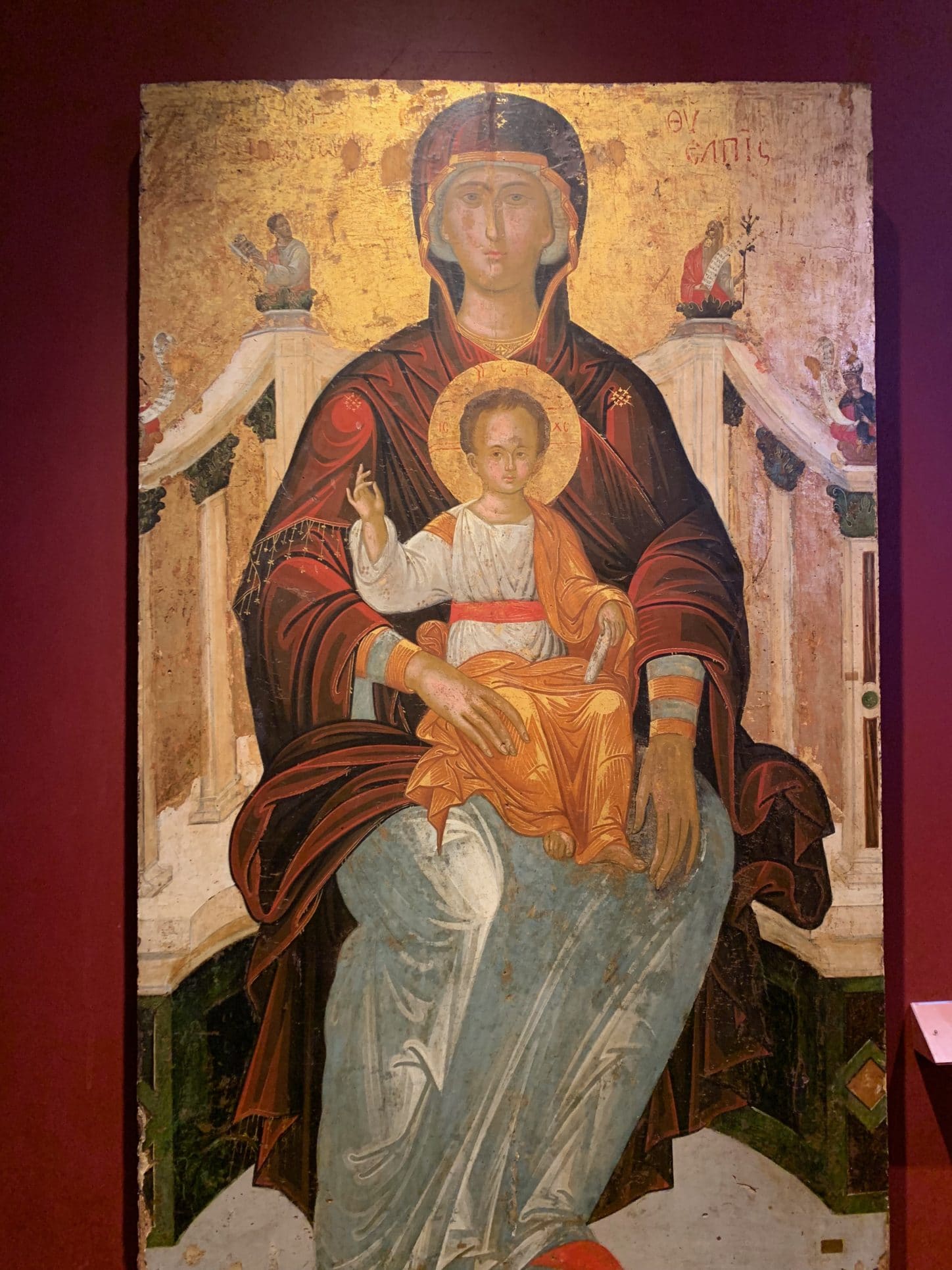
The place felt like a church because it had been one. Antivouniotissa, its pre-museum name, was a private church dedicated to the Holy Virgin. In 1979, three of the owner families donated the building along with its art, icons and heirlooms, to the Greek people on the condition it be used as a museum.
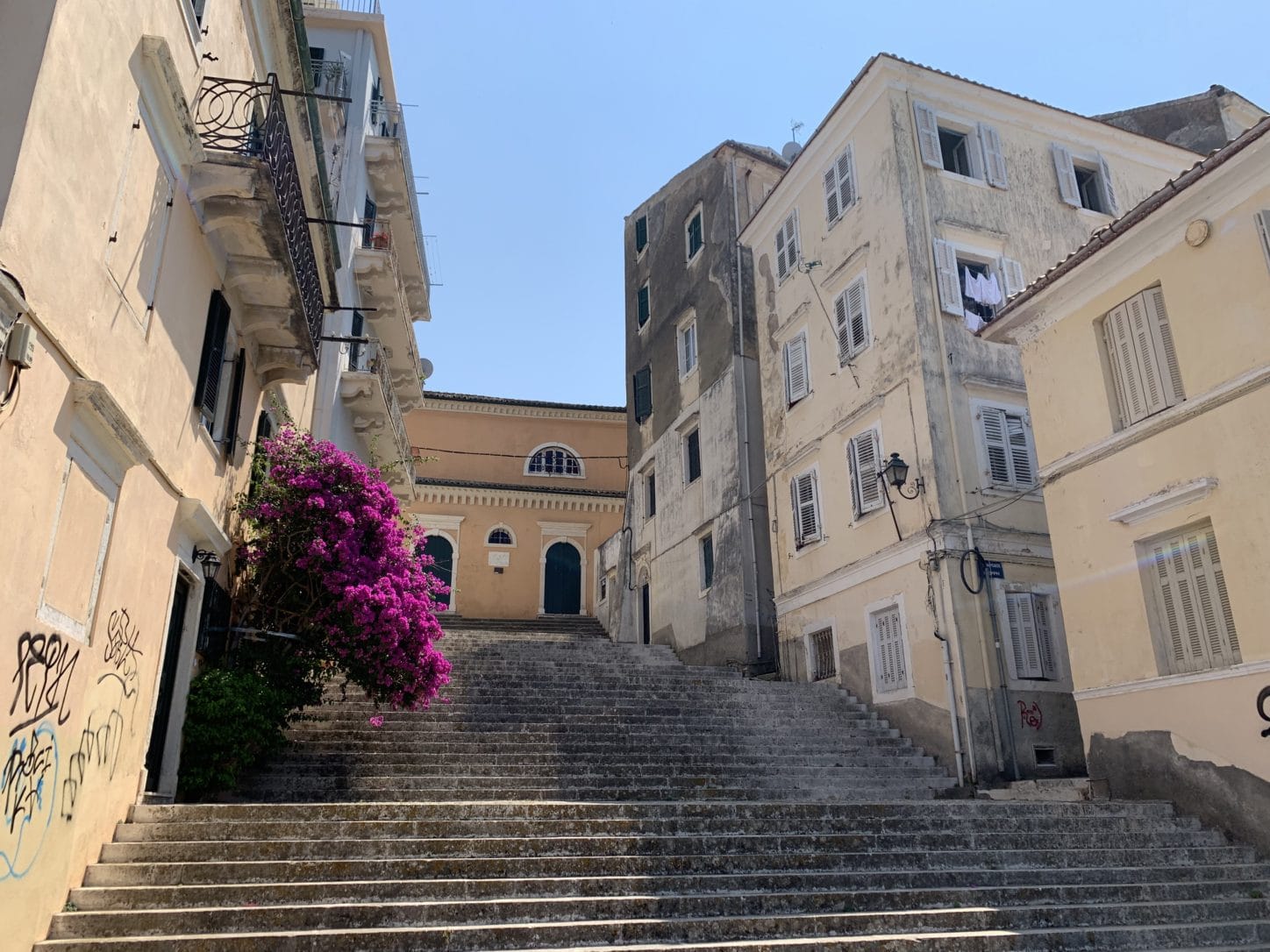
Actress Melina Mercouri, famous for her portrayal of a prostitute in the 1960 movie “Never on Sunday,” dedicated it in 1984 when she was the Greek Minister of Culture. And it’s still used twice a year, on August 23 and December 26, for religious services dedicated to the Virgin, making it Greece’s only church-museum.
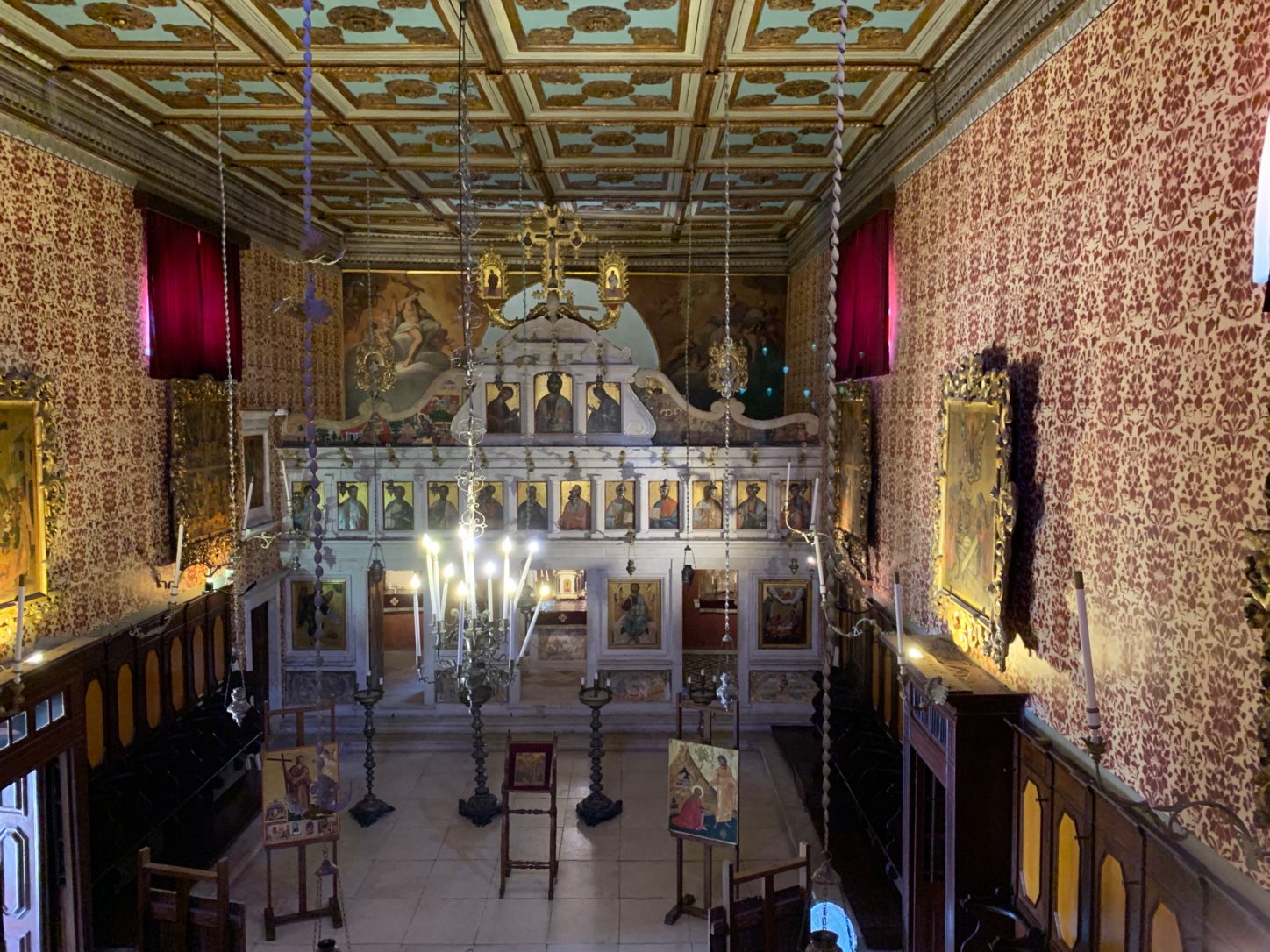
We stepped out into the bright sunshine and walked south and east along shop-lined pedestrian streets toward the Old Fortress.
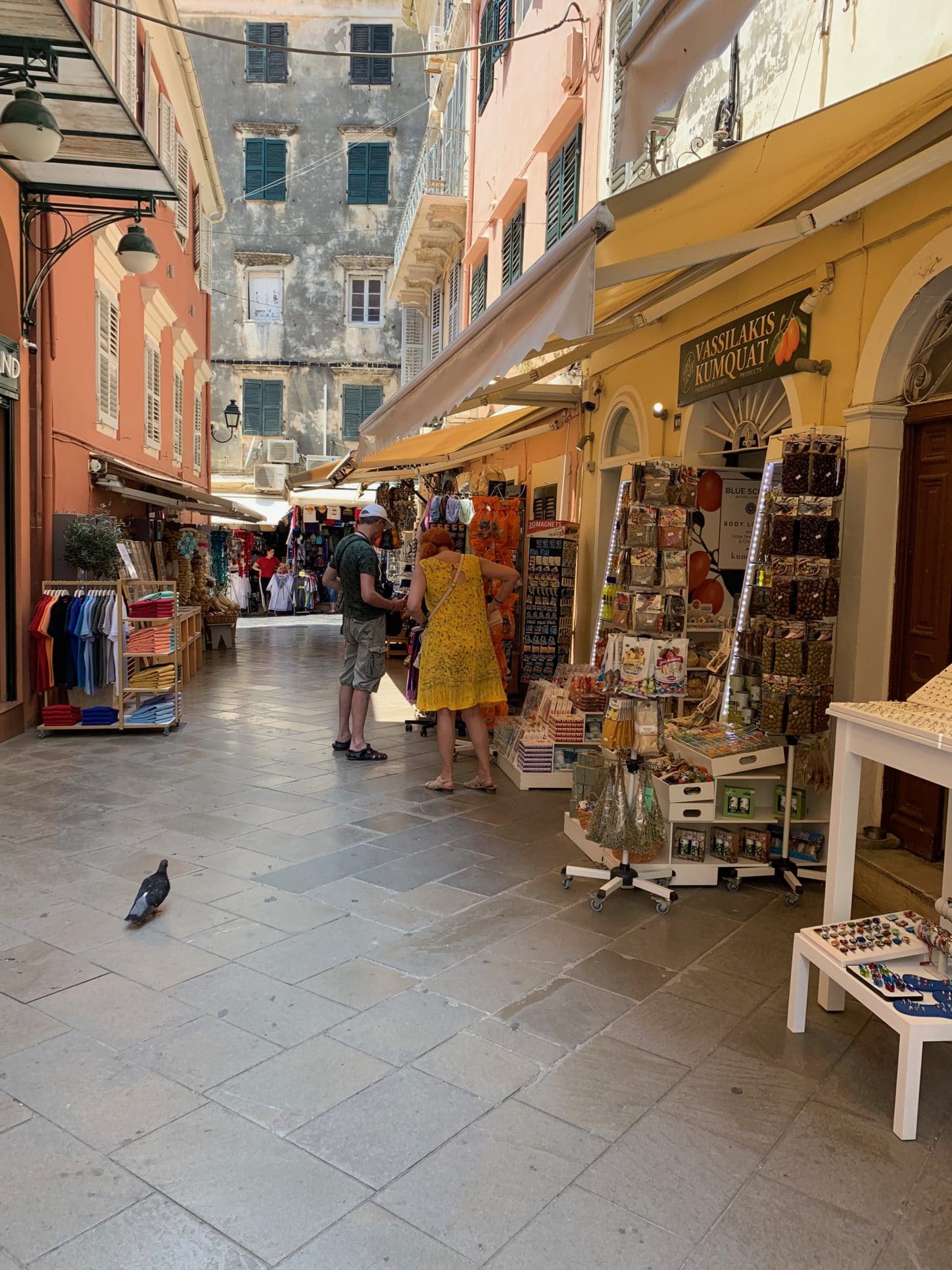
We began to think about lunch, and Barbara stopped into a store that sold eyeglass and asked for a recommendation. The woman thought for a minute. “Do you want to be near the sea?” she asked. “If possible,” Barbara said, and added that we wanted fish. “Ah,” she said knowingly and wrote down a name on the back of her business card. She directed us to head through Corfu Town through the area of the Palace of St. Michael and St. George, that from 1814 to 1824 was the home of the British Governor of Corfu. Turn left when we saw the water and we’d find the Veranda Taverna easily.
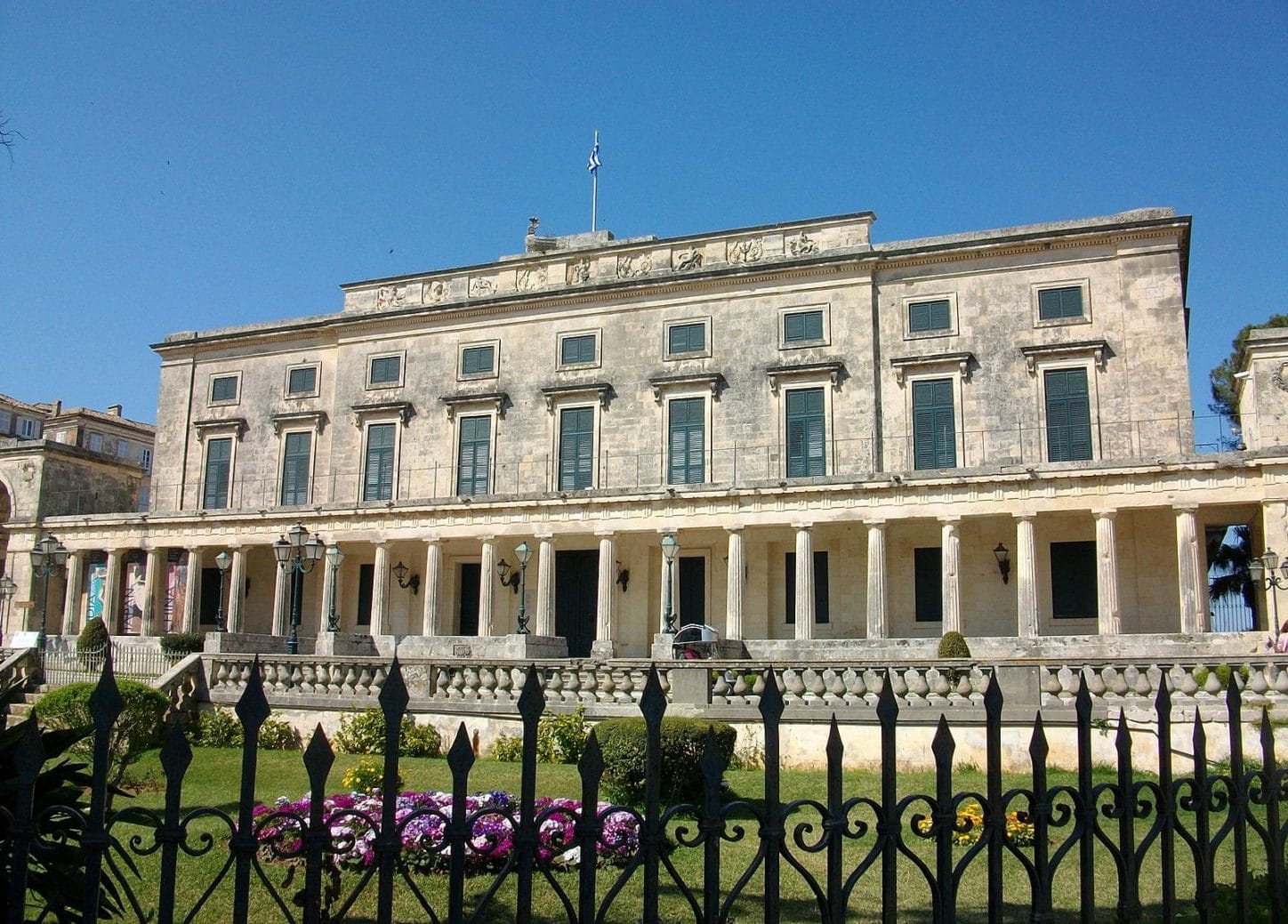
We walked through an archway out to the sea wall, wound our way around and there was a lovely restaurant jutting out over the water.
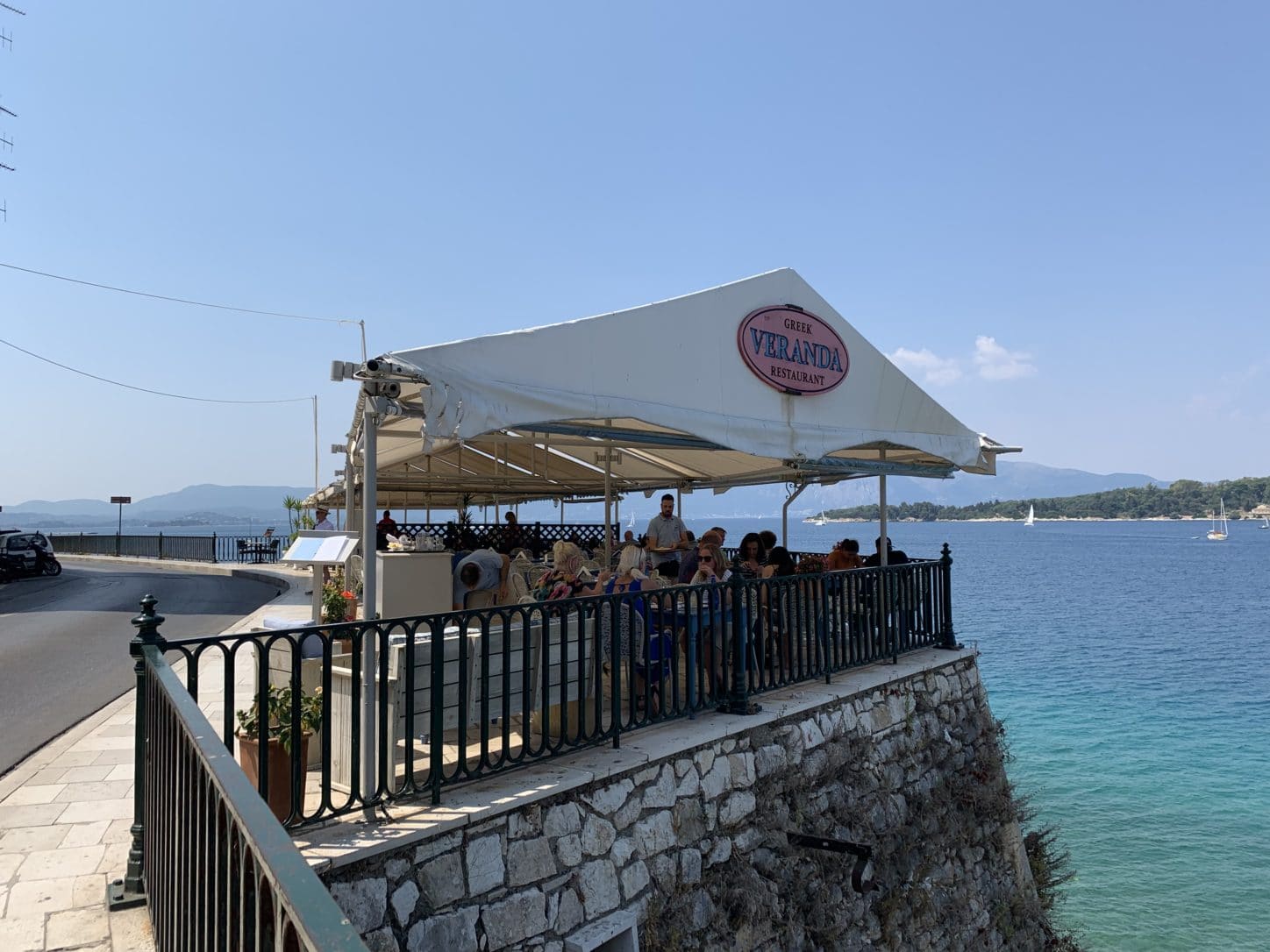
We took a table at the edge of the covered terrace and sat back to enjoy the view.
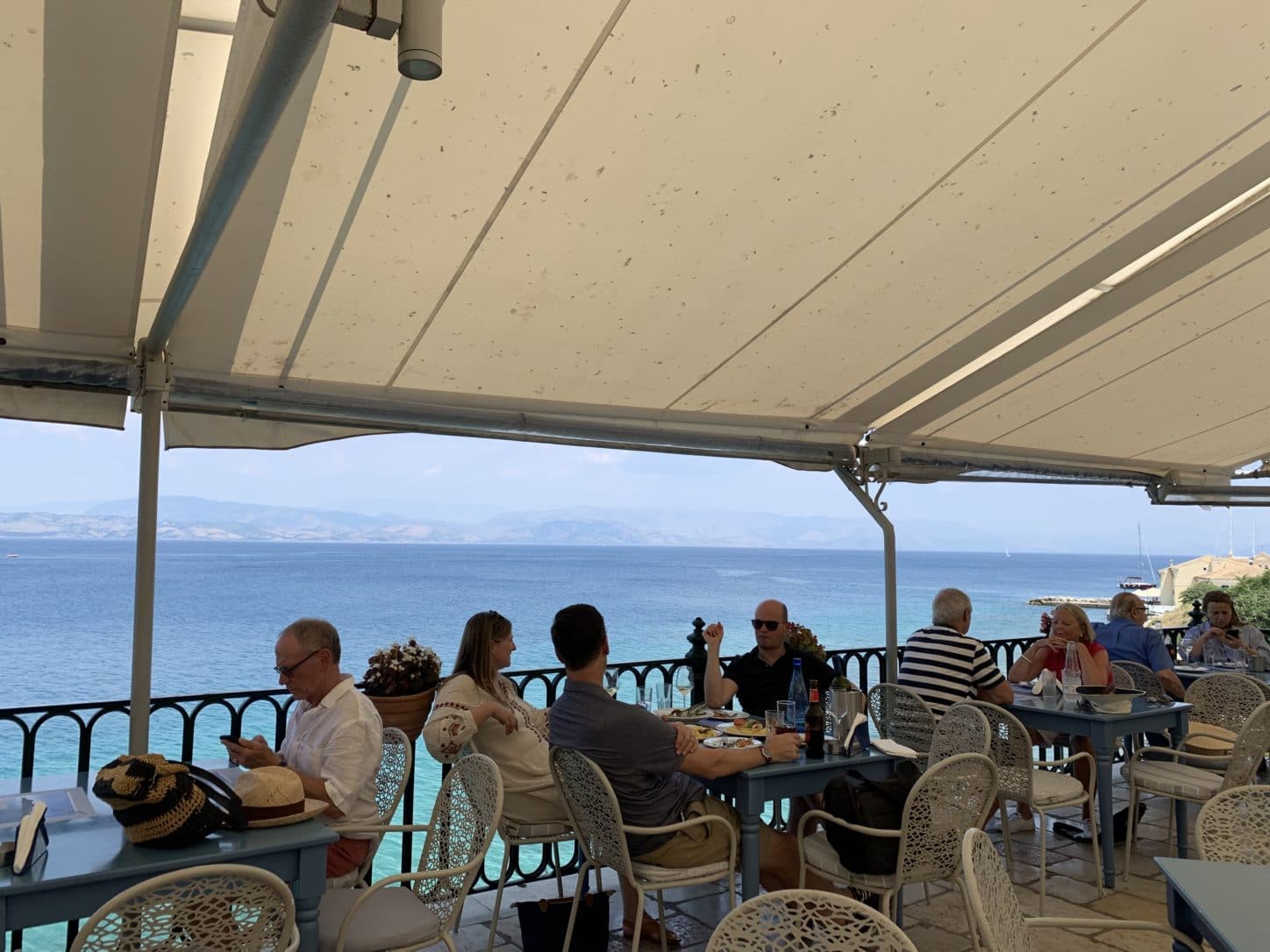
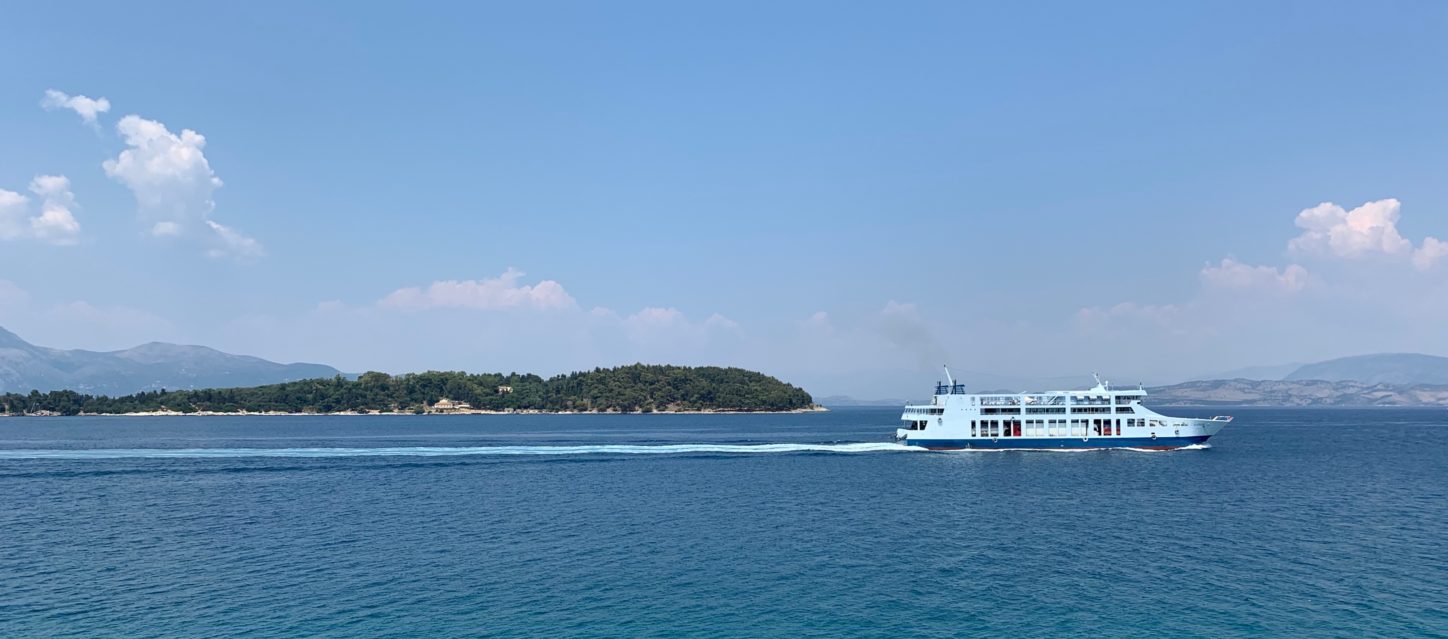
We split mussels in tomato sauce with feta and a couple of salads for a perfect lunch. We learned that Veranda Taverna is a family affair. Spiros Grammenos owns it with his dad and brother Michael.
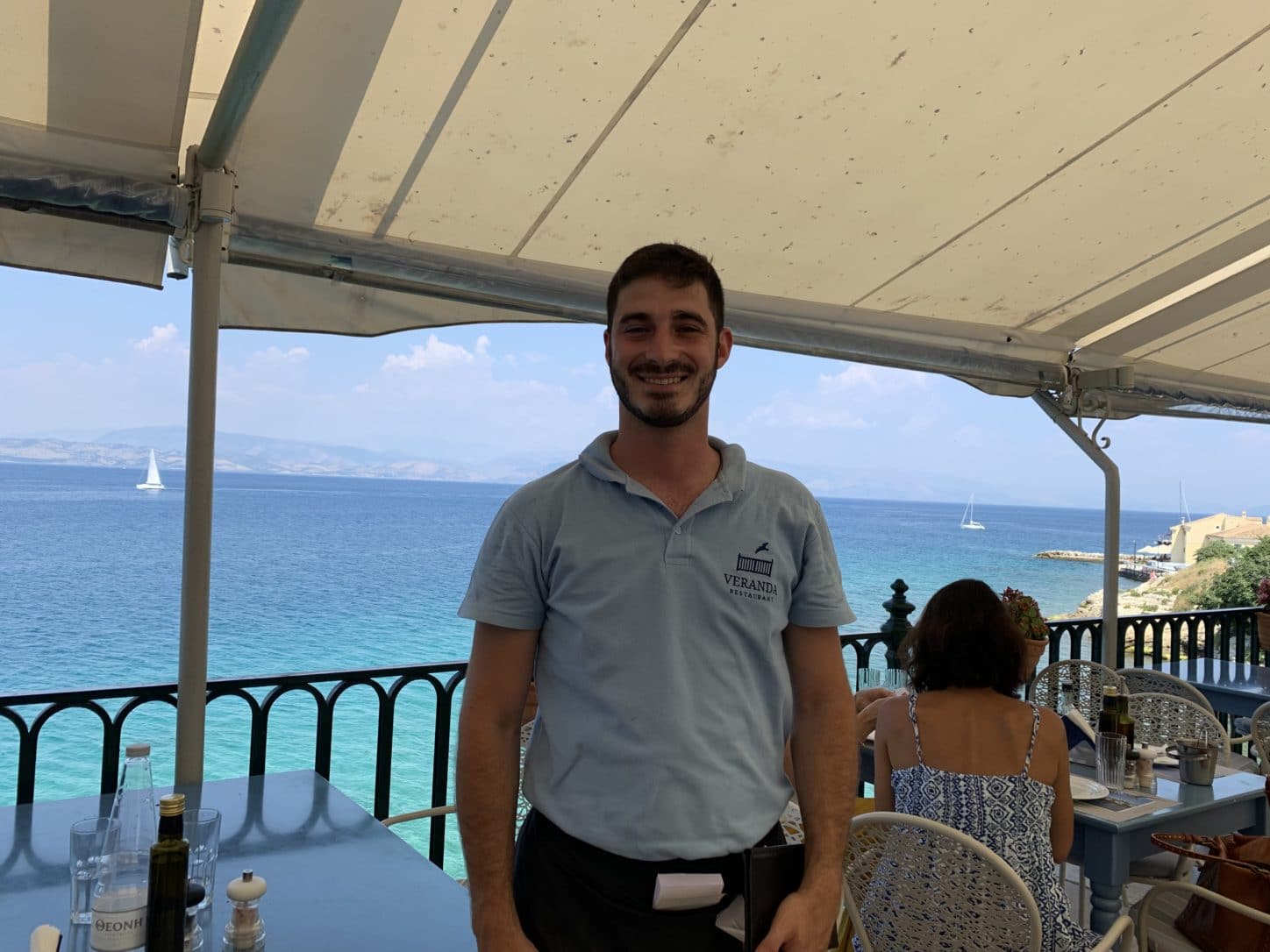
And in the kitchen Aunt Voula does the cooking.
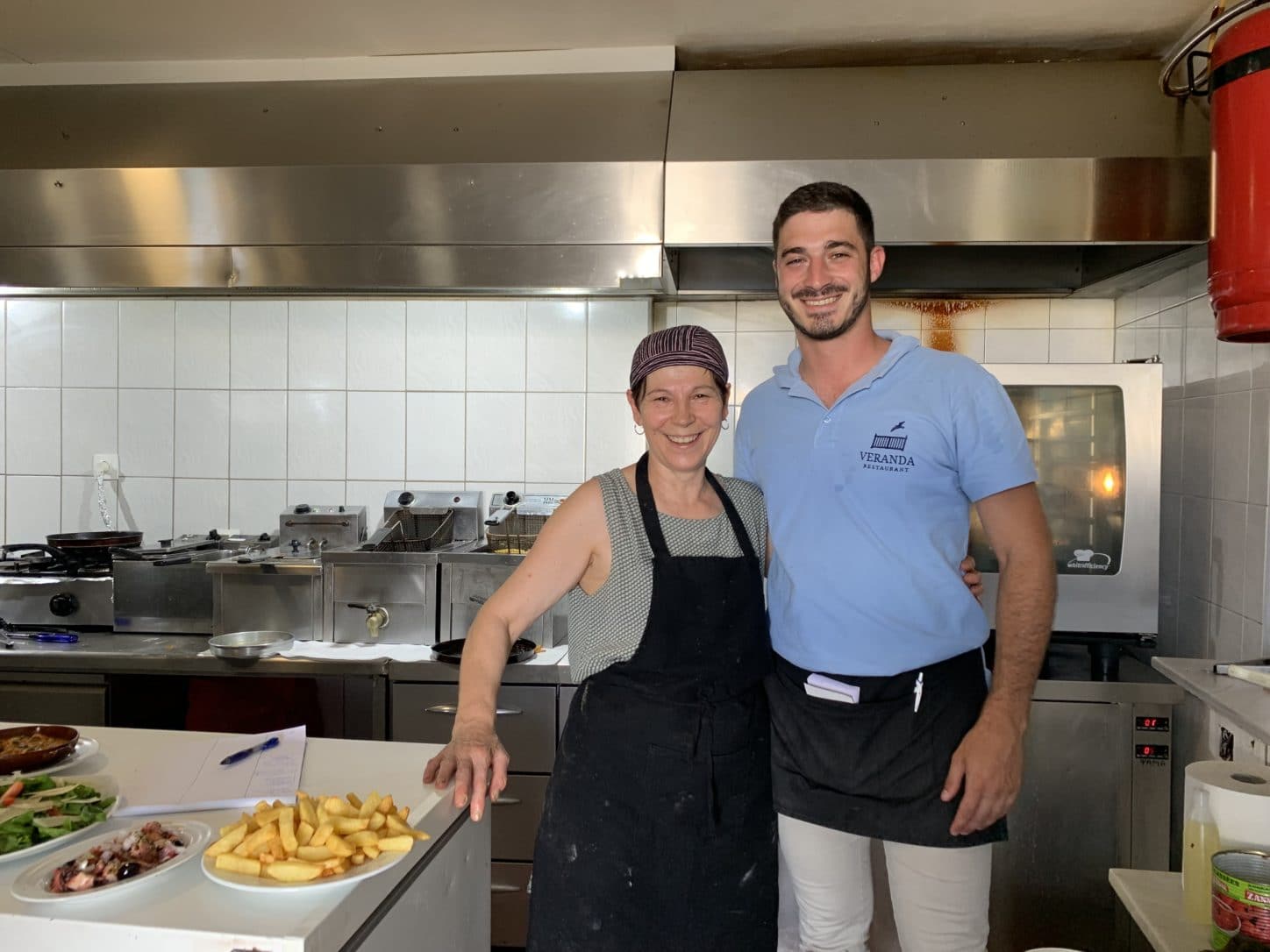
After lunch we headed north and across the island to the beaches George and Nota had suggested.
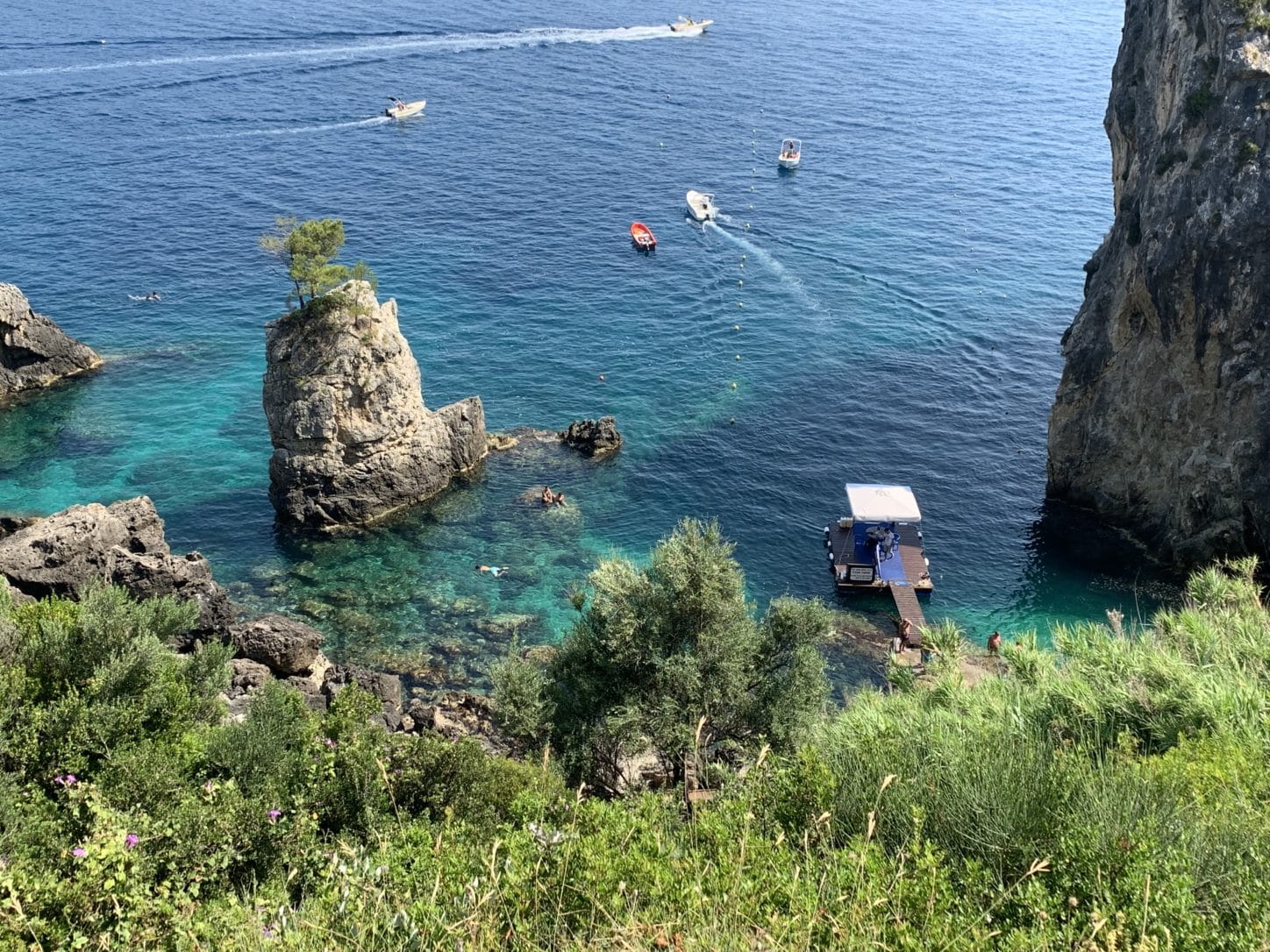
Half an hour later, we parked beside the road at Palaiokastritsa on Corfu’s west coast. Sounds of rock music rose from below, and from an overlook we saw a bar tucked into the creases of a steep hillside next to a sheer cliff. Blue water lapped at rock outcrops below the bar.
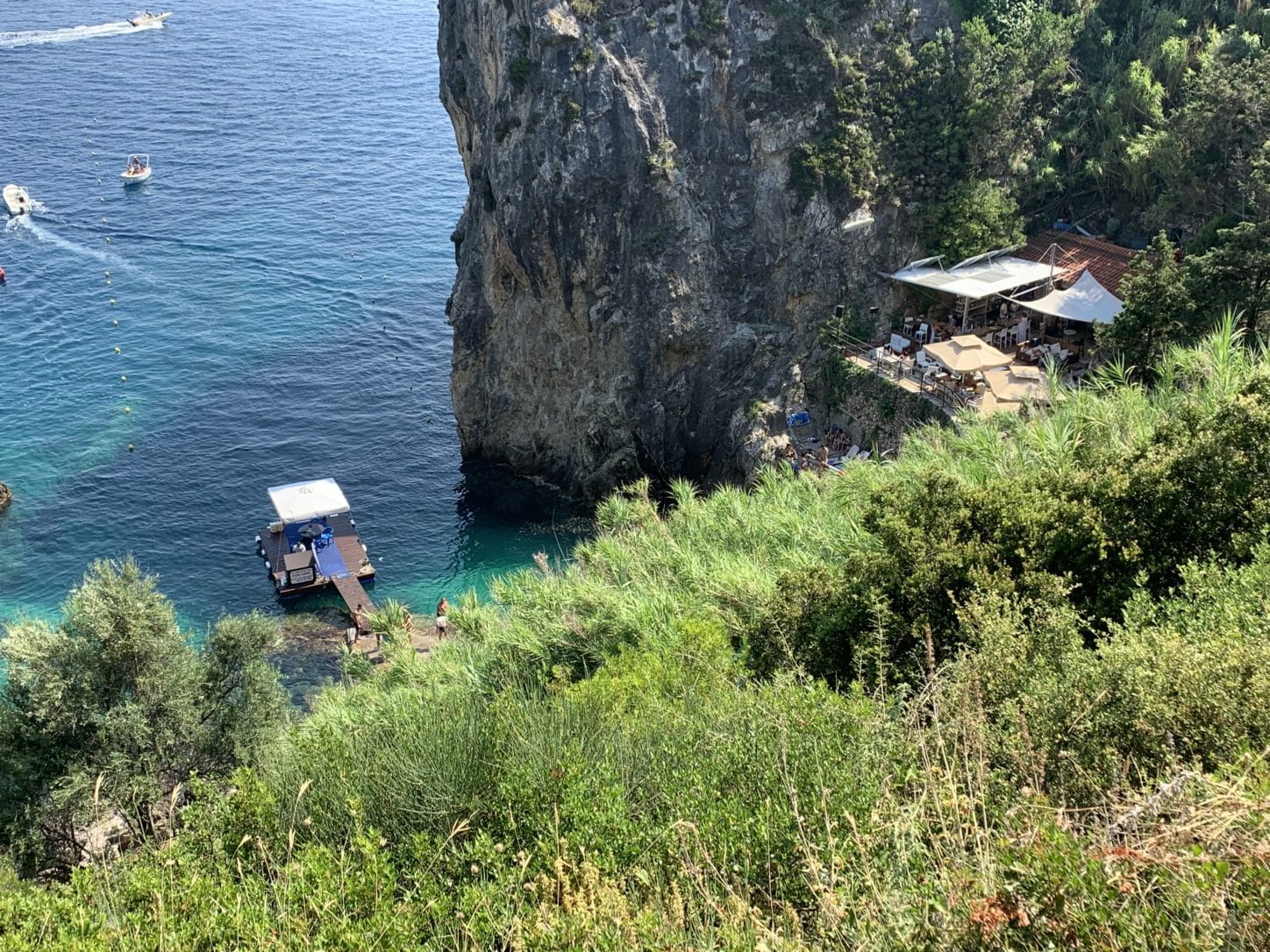
A small boat followed a straight line of white buoys to a square dock. People swam in the turquoise water and we were tempted but ultimately not so interested in the bar.
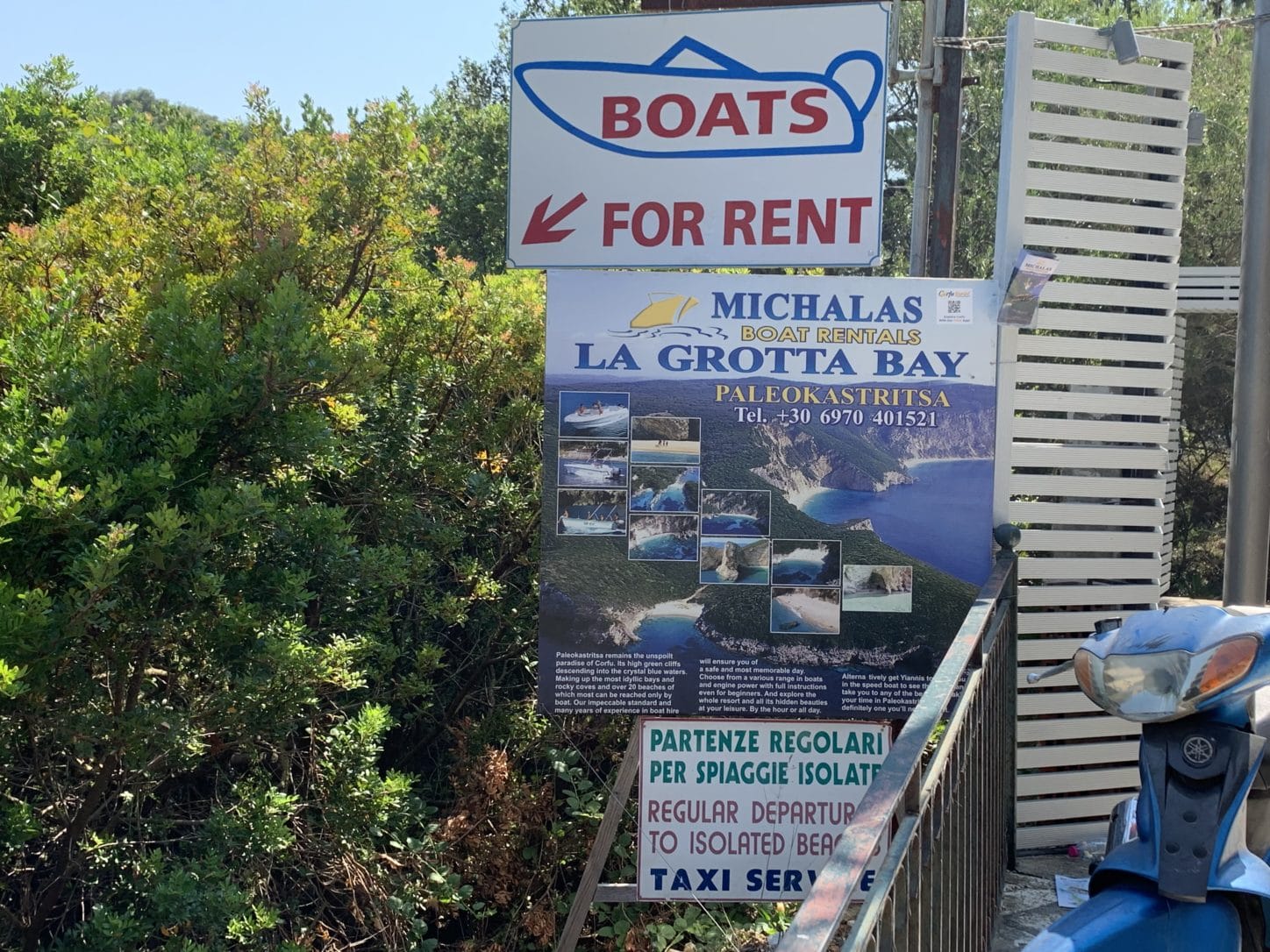
We followed switchback turns along the seaside cliffs to another stopping point. Here we descended a long set of steps to find a narrow beach with a rocky shore. It turns out a lot of the small beaches look better from far away.
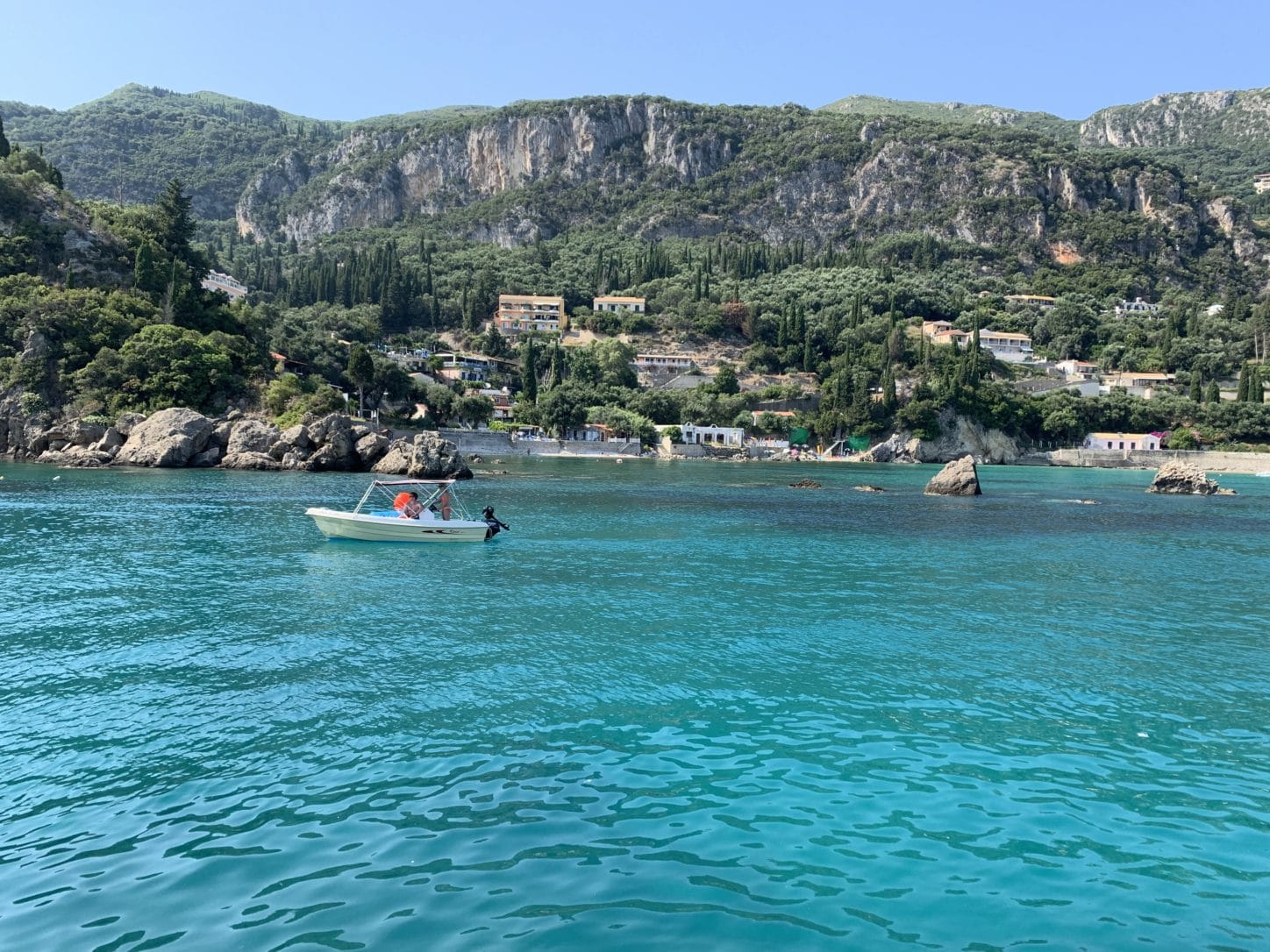
We like to sail and often see places from afar that look more intriguing than they actually are close up. But here on Corfu we persisted. A little farther on we turned into the Palaiokastritsa Harbor, where signs advertised boat rentals.
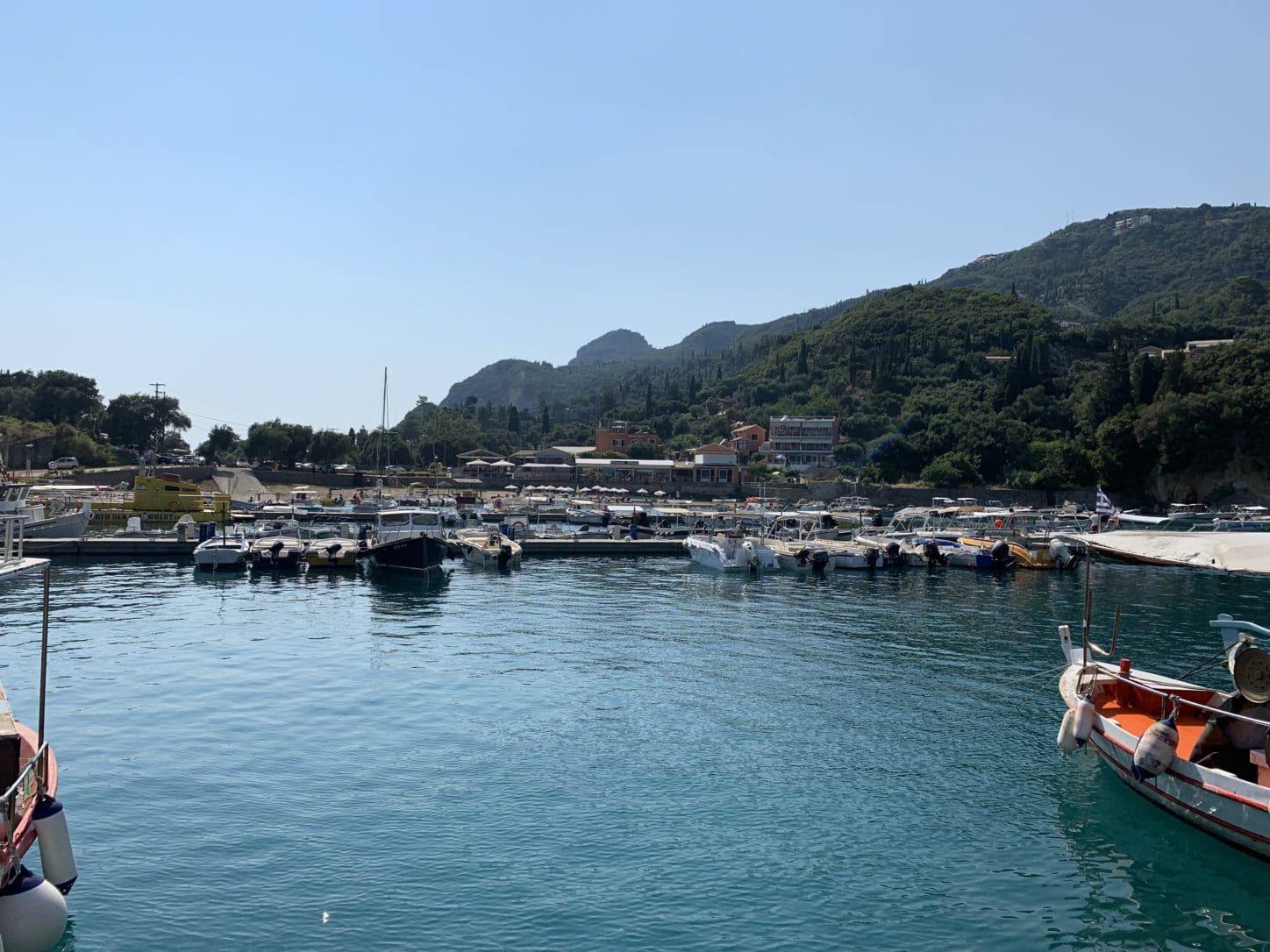
Fishing boats bobbed at the docks along with some private yachts and the small rental boats.
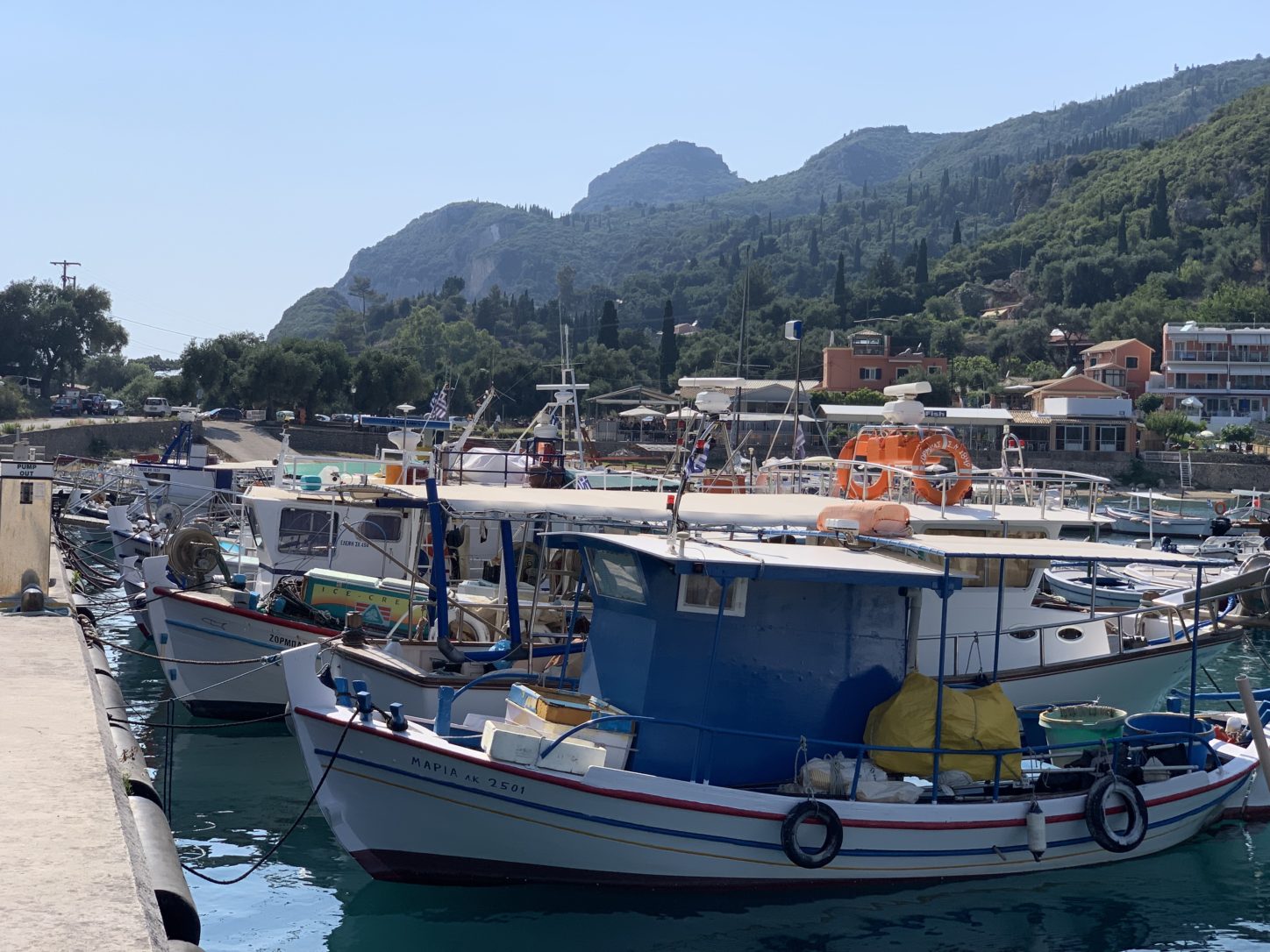
Boats shuttled in and out of the small harbor against the spectacular backdrop of Corfu’s rocky hills.
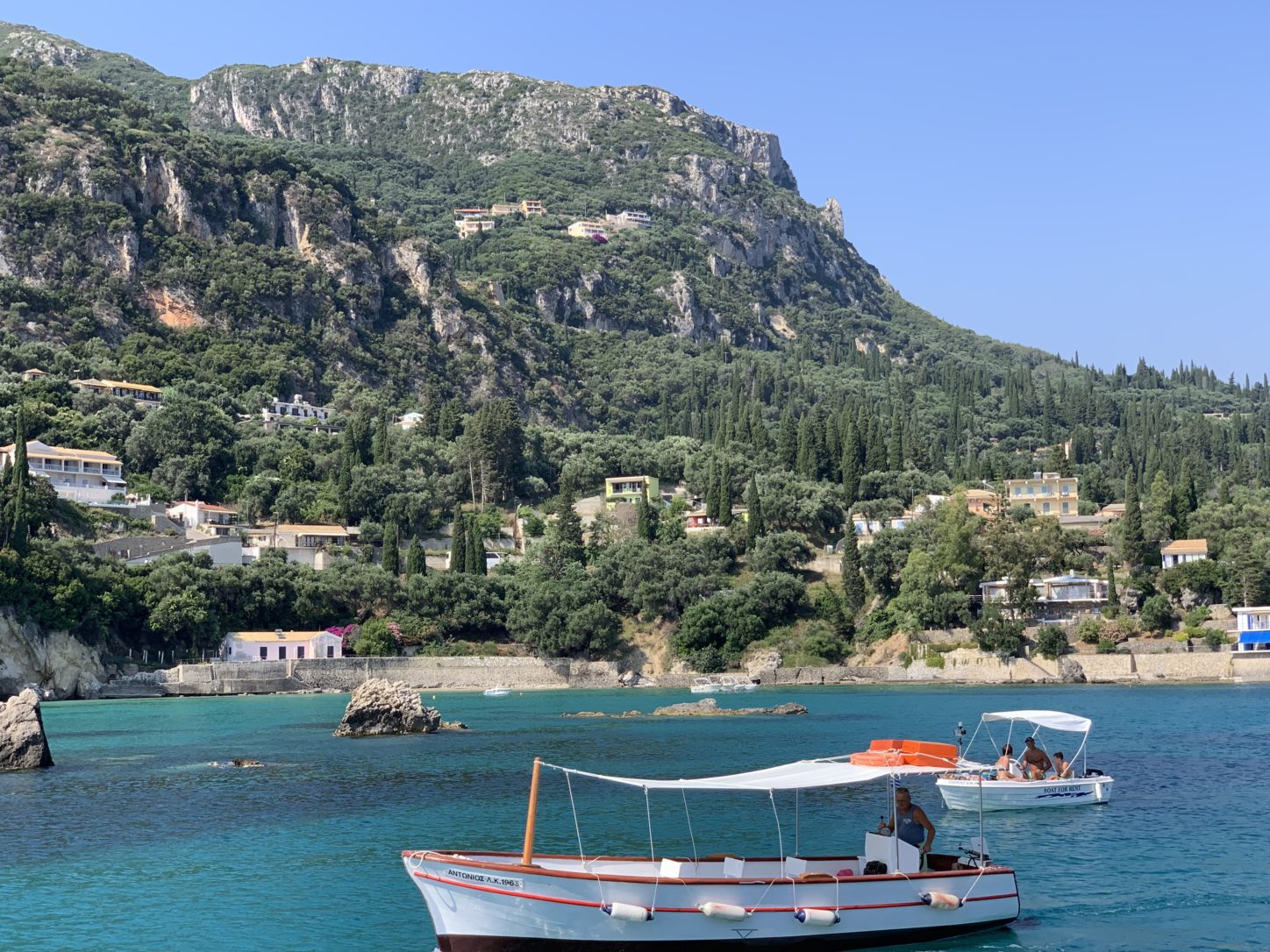
Now it was late, and we still hadn’t felt sand between our toes or walked on a rocky beach. But we decided the Castello di Vista pool was our best before-dinner destination and drove back across Corfu.
After some paddle ball in the pool and some down time, we headed out for George’s latest restaurant recommendation. He said this place had great food, spectacular views, and wasn’t far away.
We descended through the warren of Kata Korakiana to Ipsos, followed the beach north and rose through some new hills.
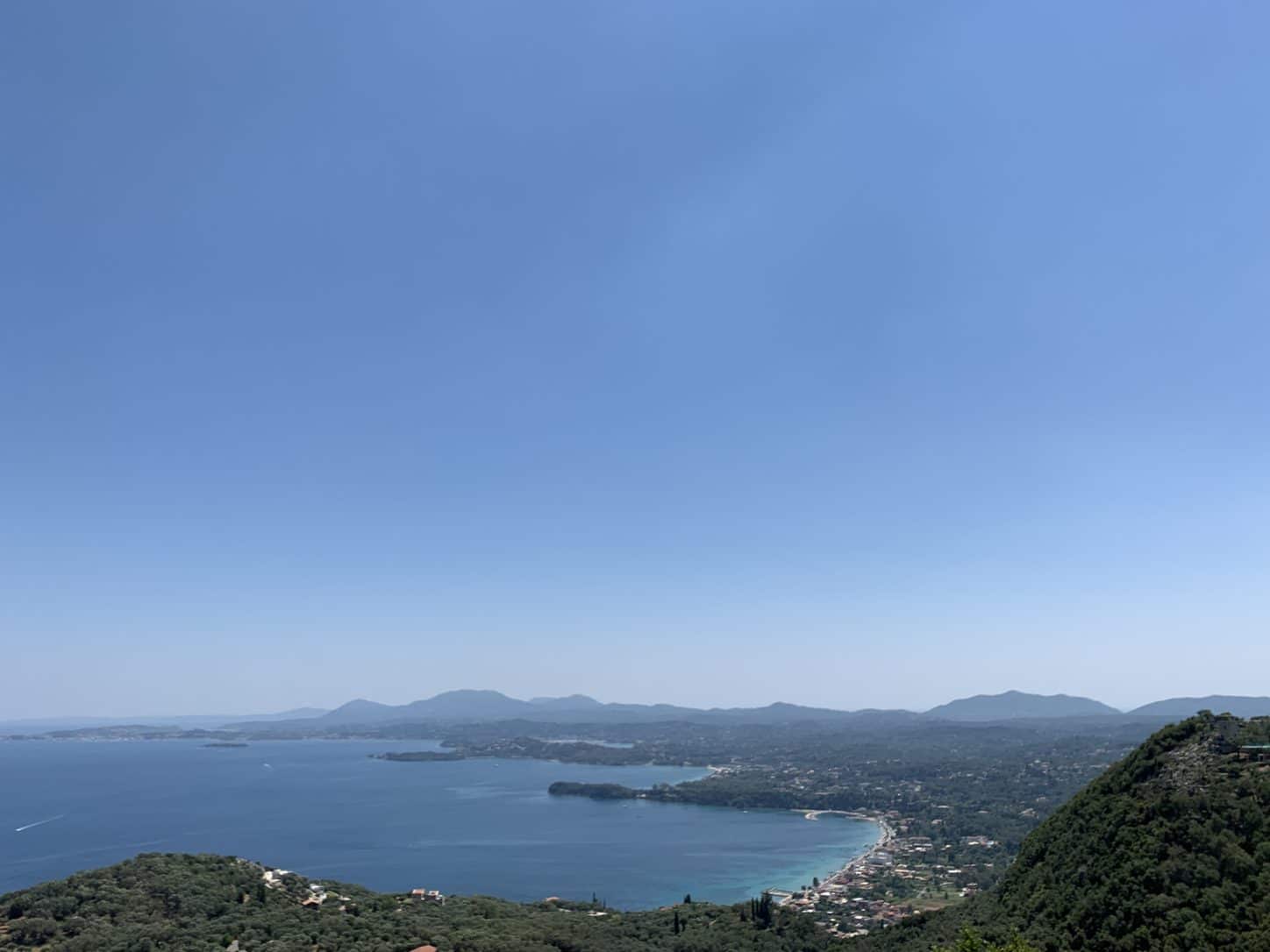
Another switchback road, hard twists of the steering wheel, up, up and up. And this time the satellite disappeared and neither Google nor Apple maps knew where we were going. We headed back down. Nick asked directions at a restaurant, which wasn’t the one we were looking for. We turned around and went up again. Finally prudence took hold. Wherever this Taverna Agnadio was, we weren’t going to have dinner and wine there and feel safe getting back to the hotel.
Down we went, all those switchbacks again, and came out at the north end of Ipsos Beach. The lights ahead advertised a wealth of possibilities.
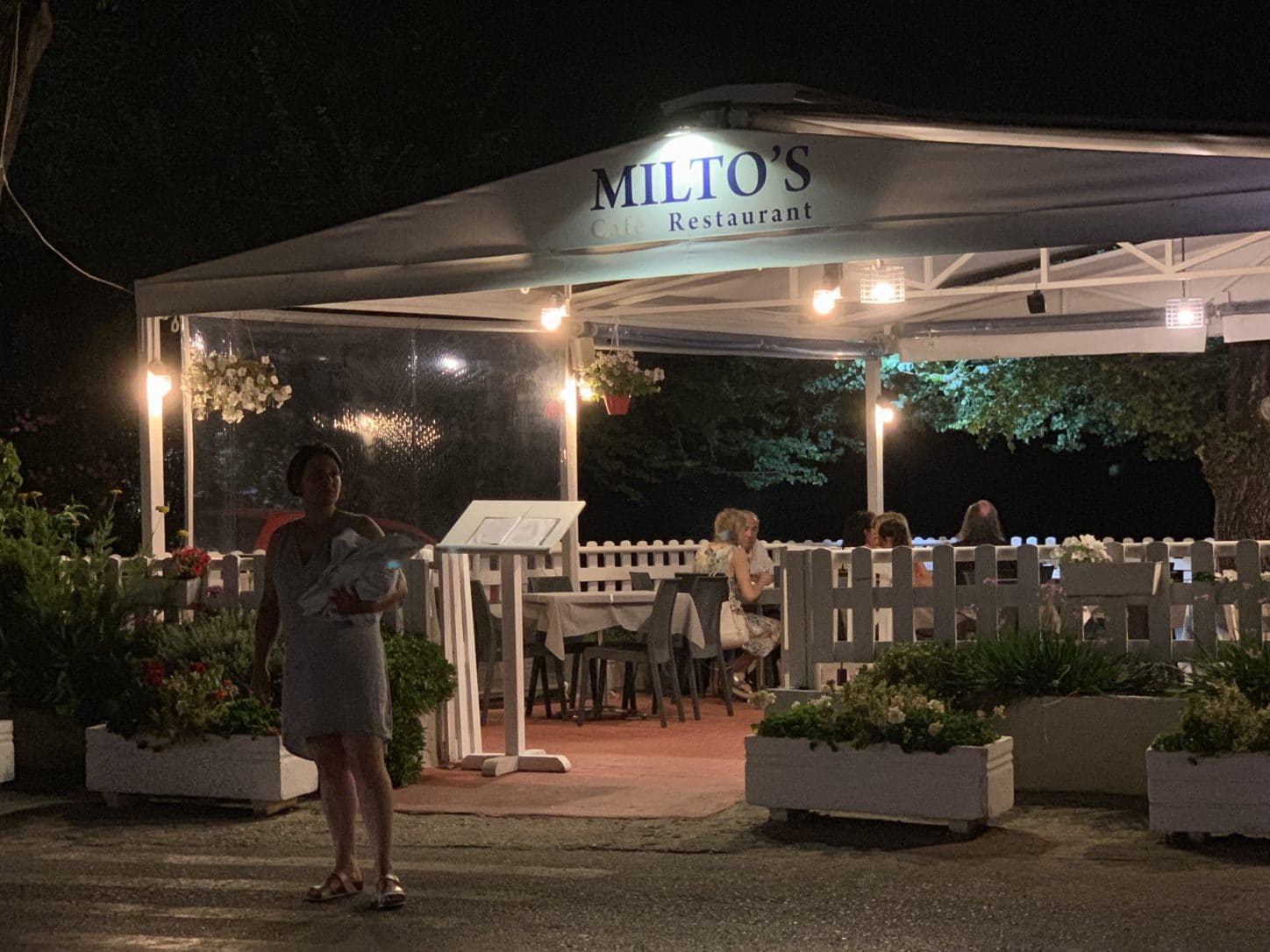
We parked and randomly chose the Miltos family taverna over the place next door. “I don’t want to eat at a place called Moby Dick,” said Barbara. A terrace table put us at the water’s edge with a view of a blue velvet night sky.
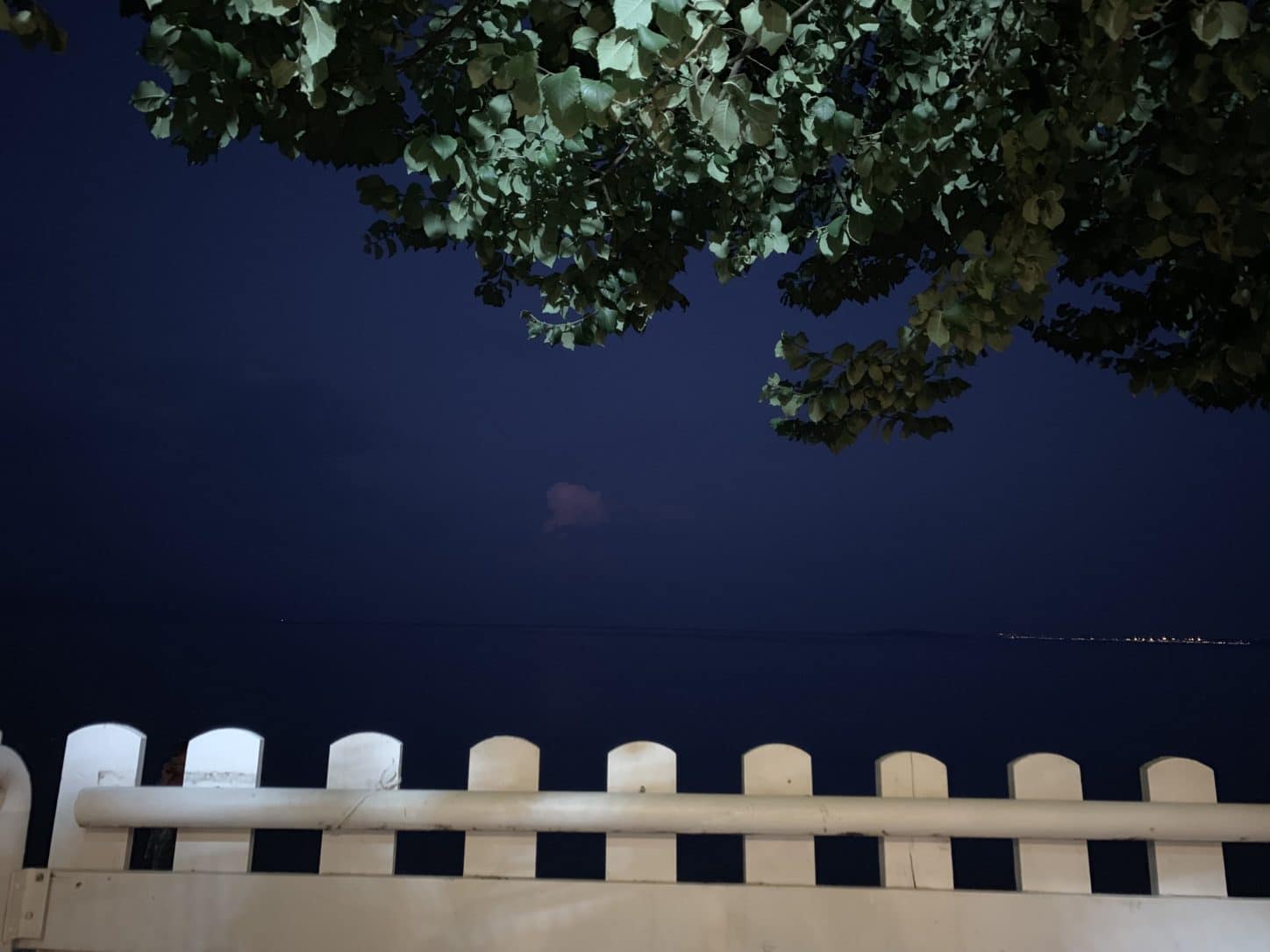
We ate grilled fish and drank Assyrtiko and enjoyed the night.
Technology toyed with us on our way back to the hotel. So far it hadn’t made a difference whether we used Apple maps or Google maps for our GPS directions. This time it did. We didn’t know which one was the culprit, but in the maze around Castello di Vista we found ourselves on roads that didn’t look right and the dashboard voice told us we’d have to park and walk to our destination. That wasn’t going to happen. Barbara, the navigator, switched programs and we eventually found our way
The next morning, George asked us how we’d liked his restaurant recommendation. “We didn’t get there,” Nick explained. “The road was too much. We decided we didn’t want to come down the mountain after drinking wine.”
“Oh,” said George. “Is it far up?”
“You’ve never been there?” Barbara asked, her voice rising with incredulity.
“No. Other guests have said it’s nice,” he said, shrugging off the conversation. Then a family with two young girls appeared asking for beach gear. So he was off the hook.
We planned to head up again in the same direction. Our destination for the day was Mount Pantocrator, Corfu’s highest point. The wordsmiths in us wondered about the name. Christ Pantocrator is the Eastern Orthodox image of Jesus, holding the Gospels in his left hand and offering blessings with his right. In this context it means “all powerful lord of the universe.” It can also mean “ruler of all,” which we supposed could apply to the island’s highest point. Also, there was an Orthodox monastery there, so the meanings were all jumbled.
We had to go through Ipsos again to get there.
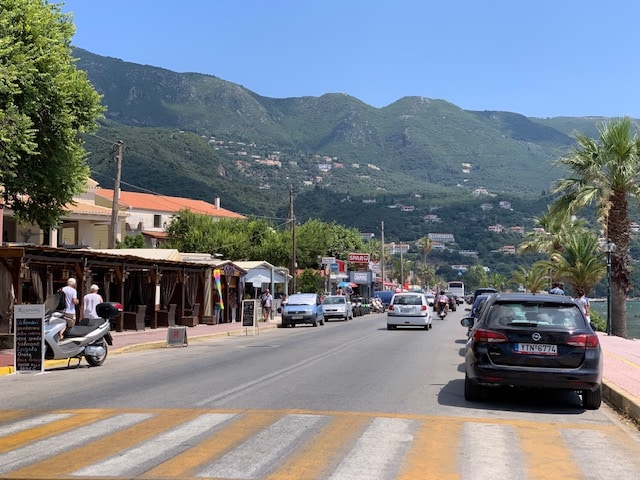
And we realized the long pebbly beach was as nice as any we had seen.
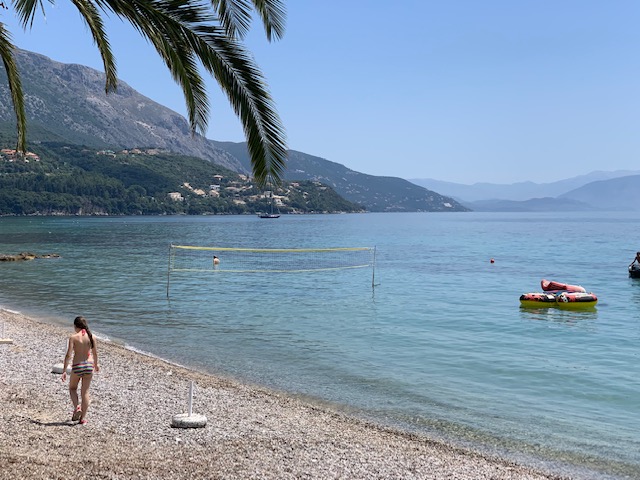
But we had other ideas for the day and drove up the same mountain road we were on the night before.
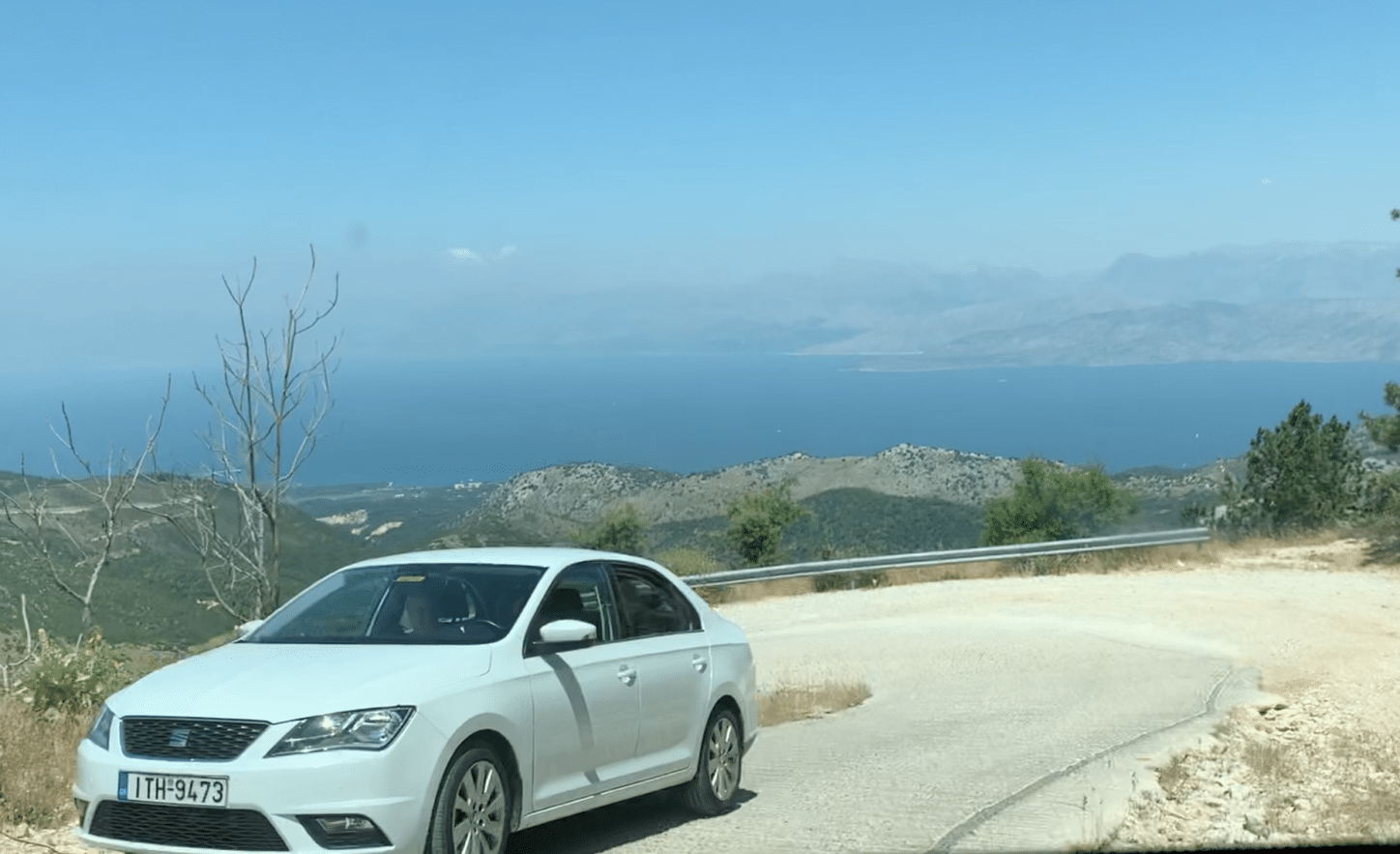
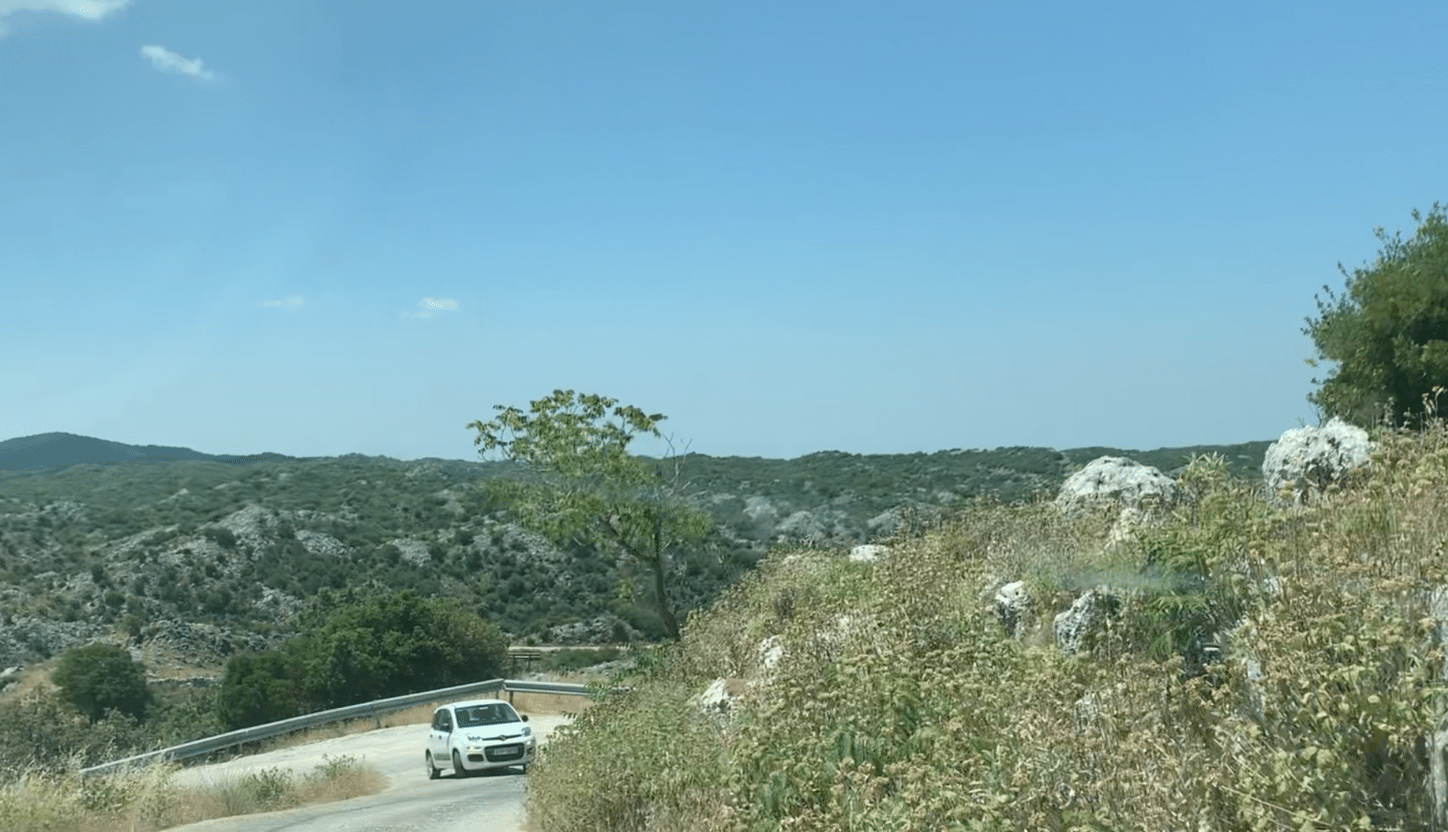
The hairpin turns and switchback climbs felt just as exciting in the daylight as they had in twilight.
We finally came upon the Agnadio Taverna, yet we kept climbing.
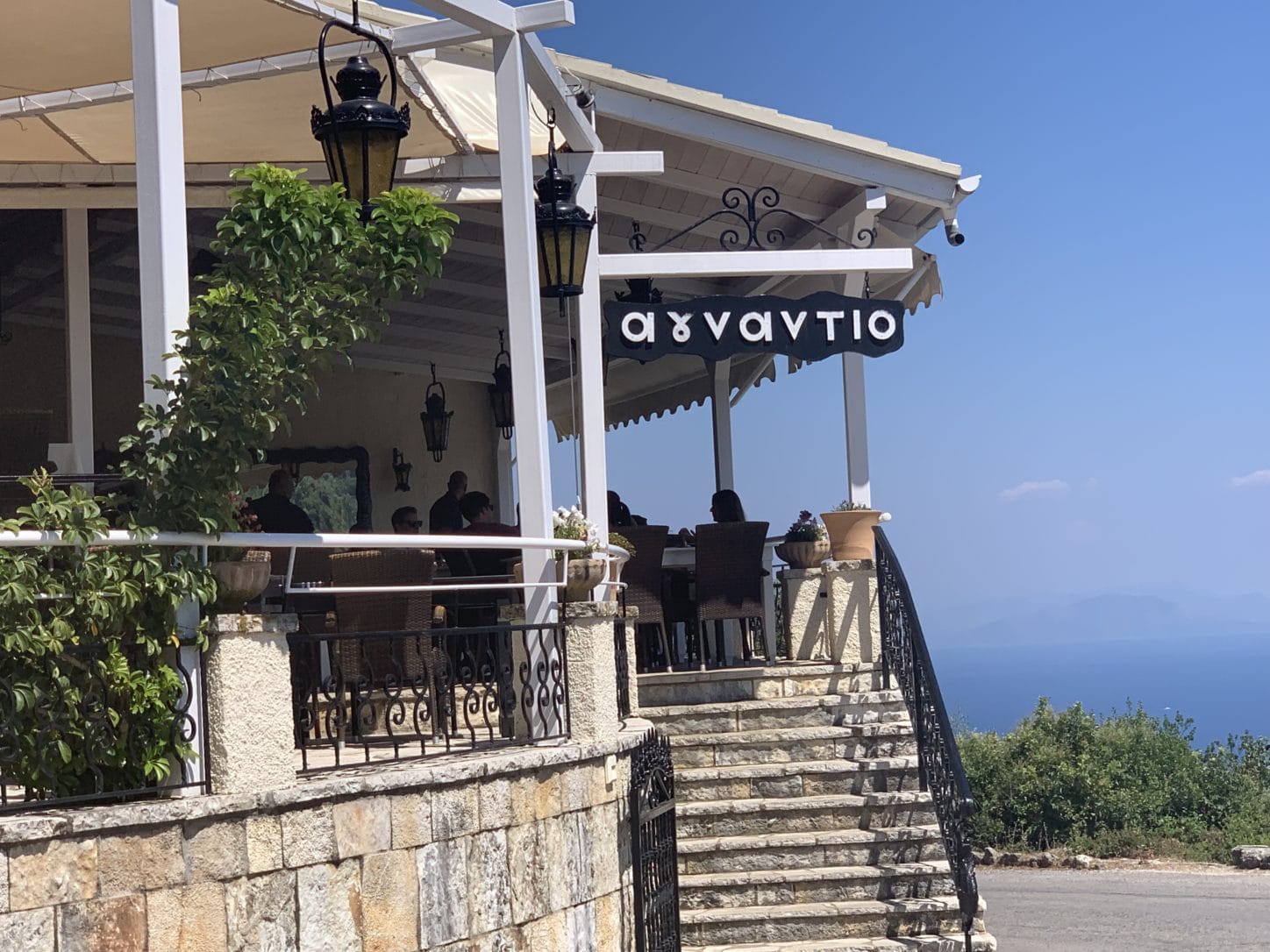
When the road leveled out it seemed like we were on top of Corfu. But we saw our destination far ahead, still higher.
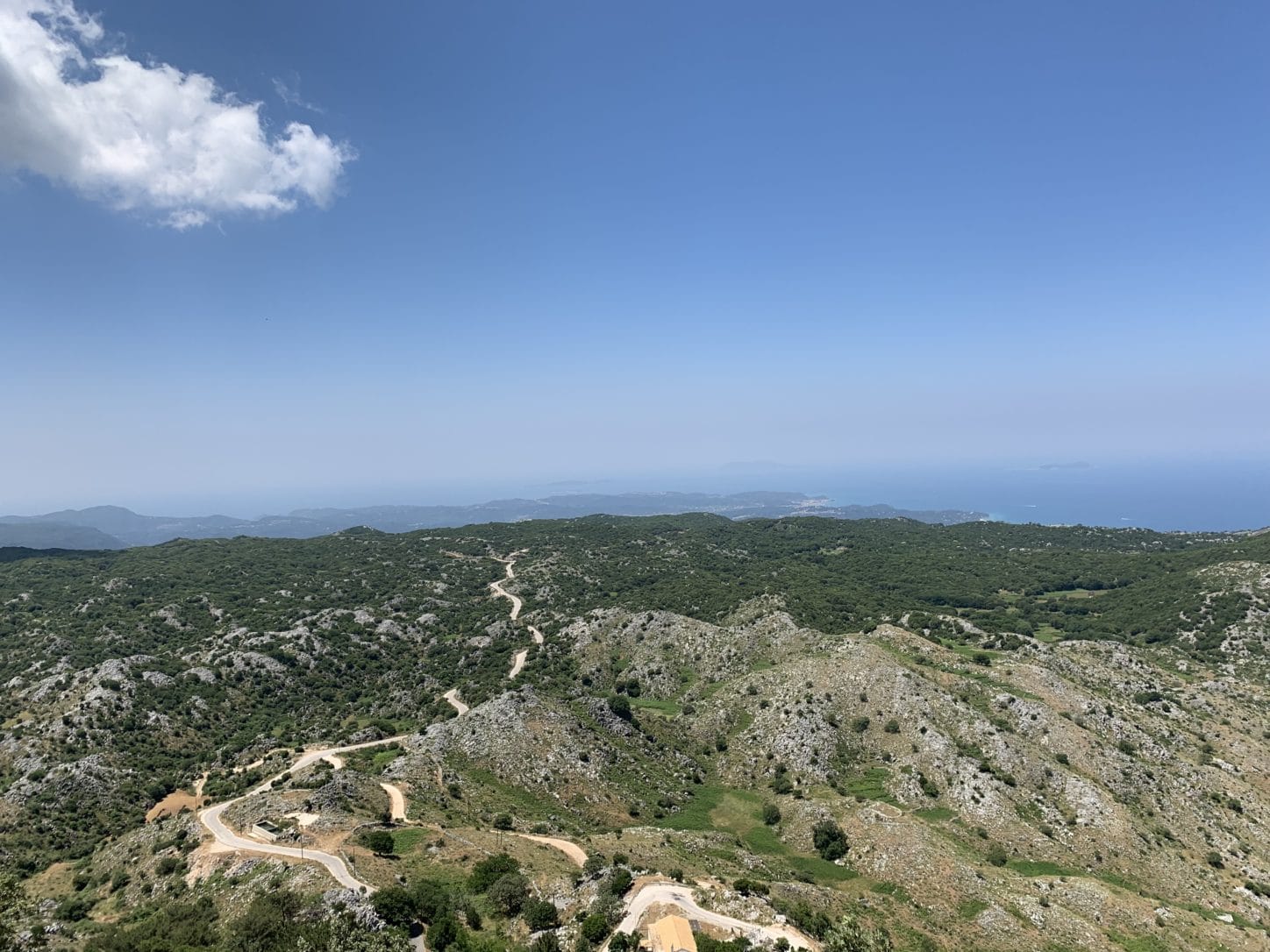
And the butterflies began to appear. Maybe they are drawn by the altitude, the breeze, the foliage, or Pantocrator. Who knows.
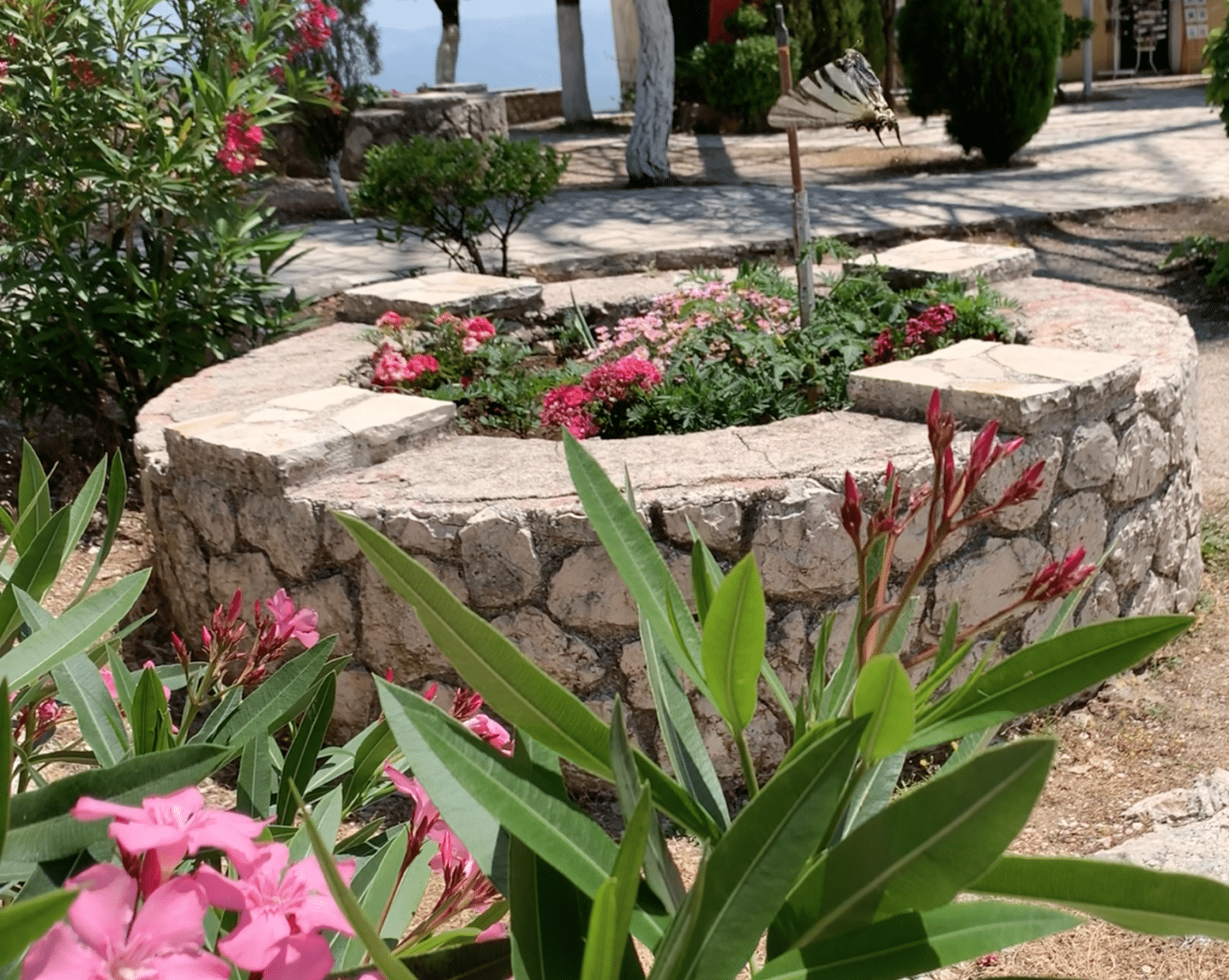
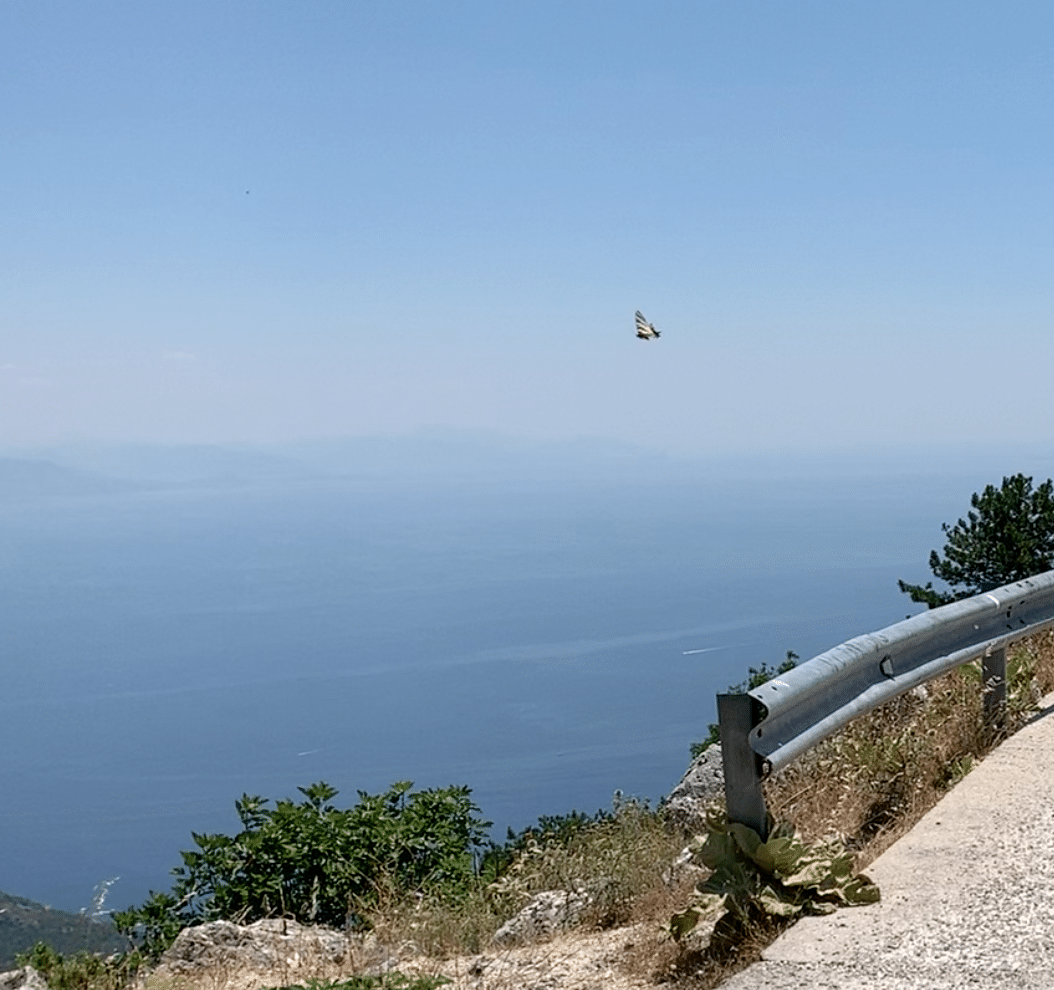
The butterflies didn’t slow down for photos and we found them hard to capture on digital anything. But they were everywhere.
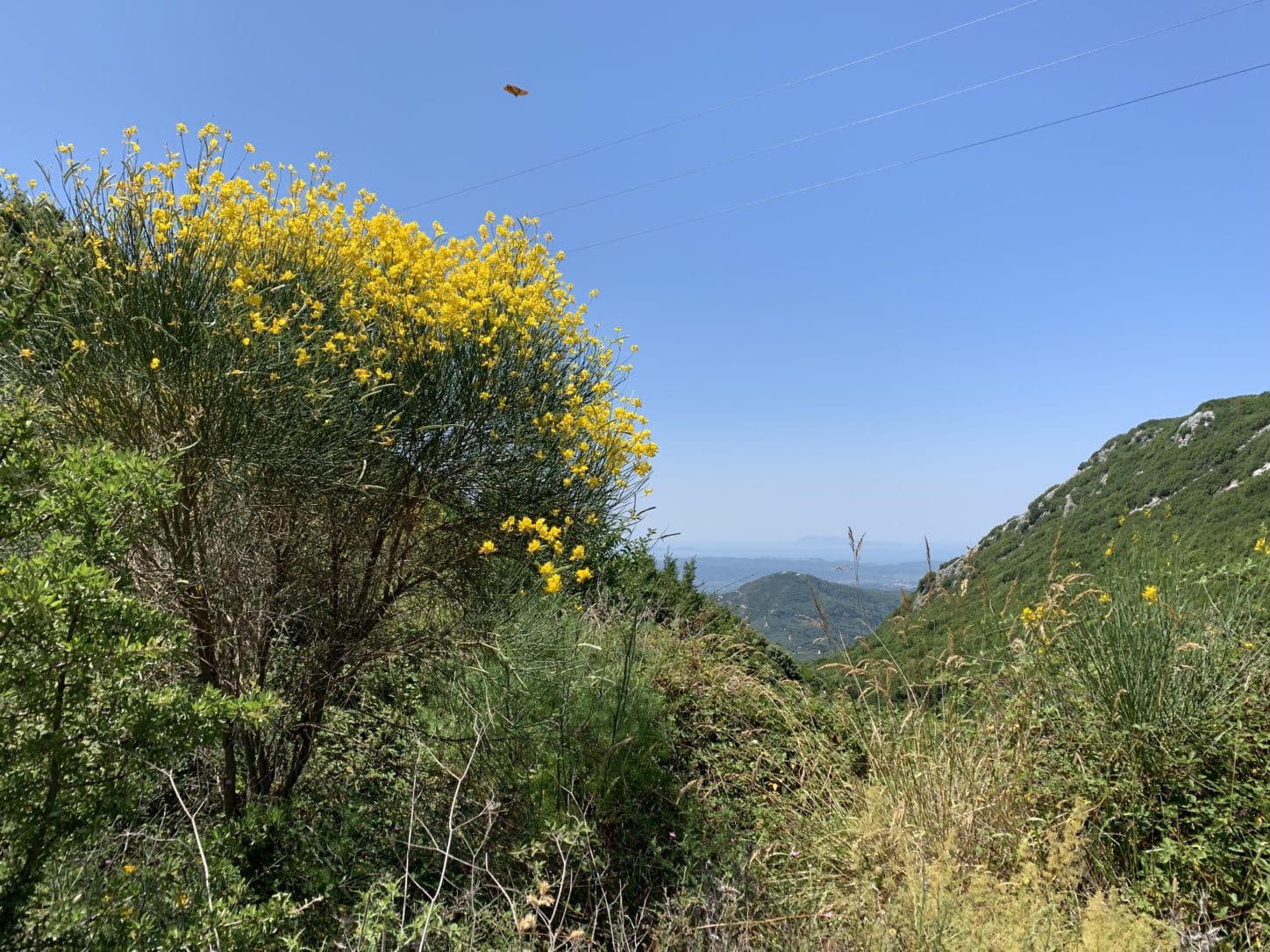
Approaching Pantocrator, we saw the secular world’s intrusions on this spiritual ground. The hilltop bristled with antennas. “Nearer, my God, to thee” in the words of the old hymn, is also better for communications.
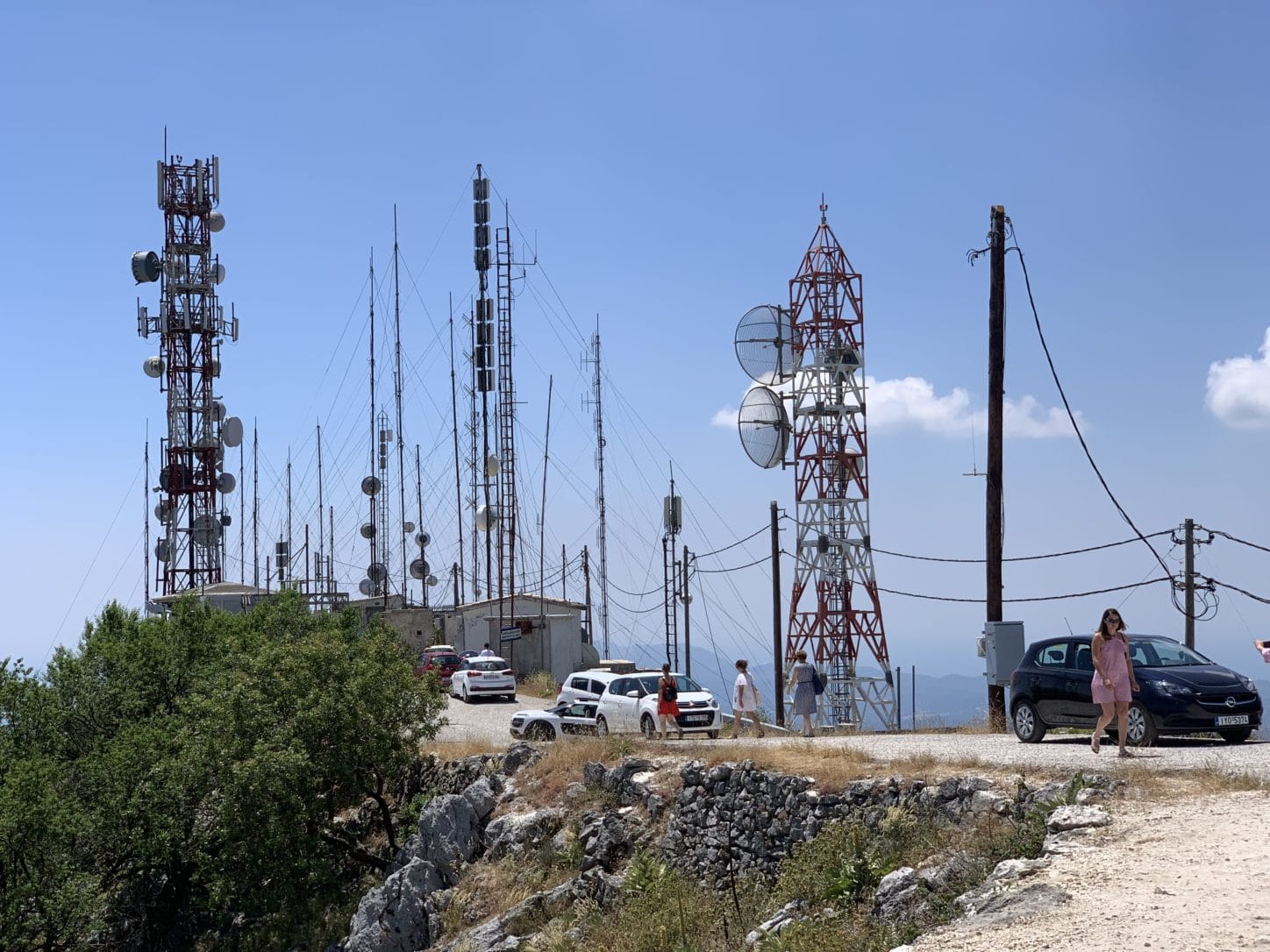
The tallest of these communication towers rose directly over the monastery at the summit.
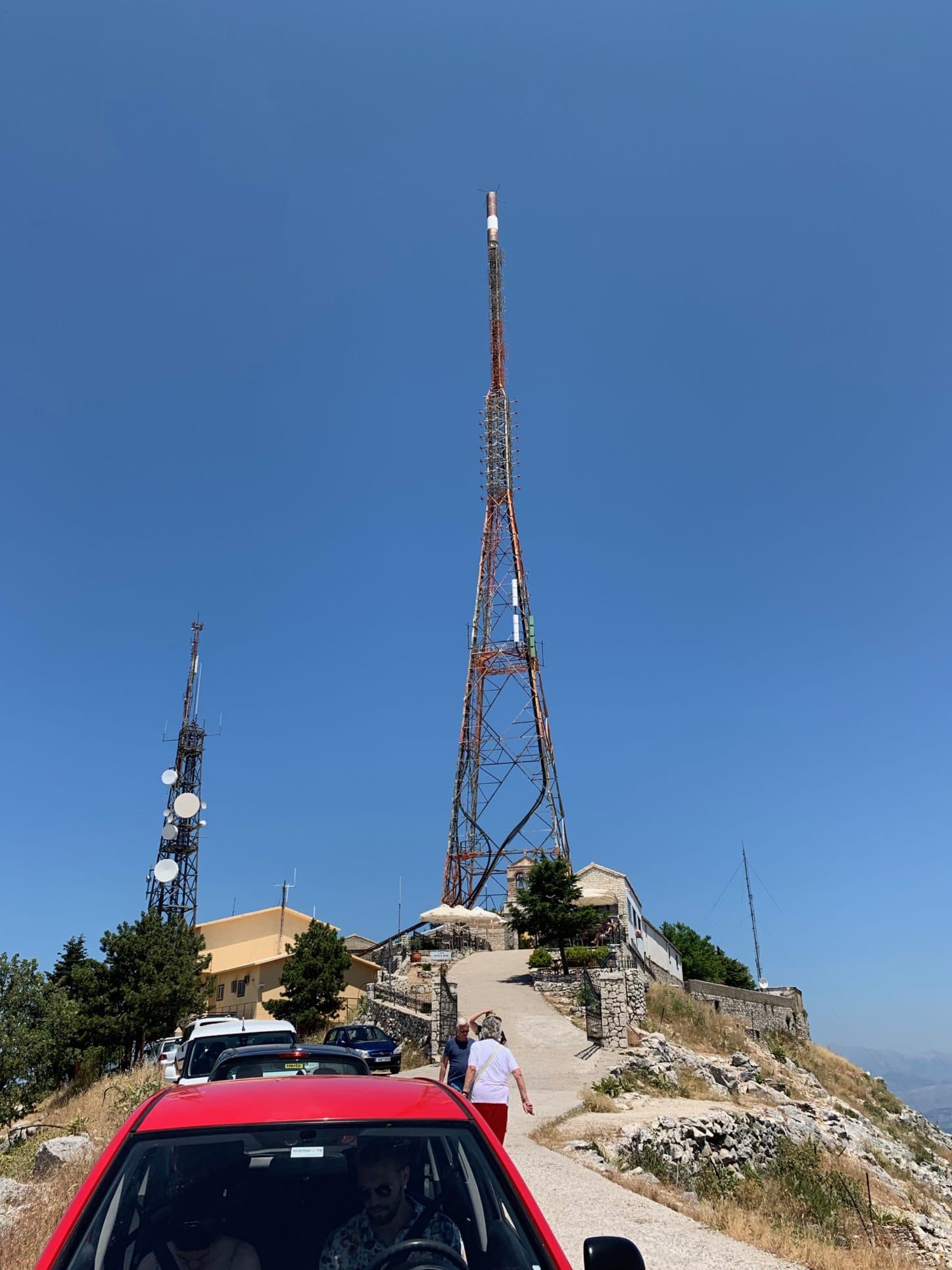
It did seem as if the monastery had its own hotline to heaven.
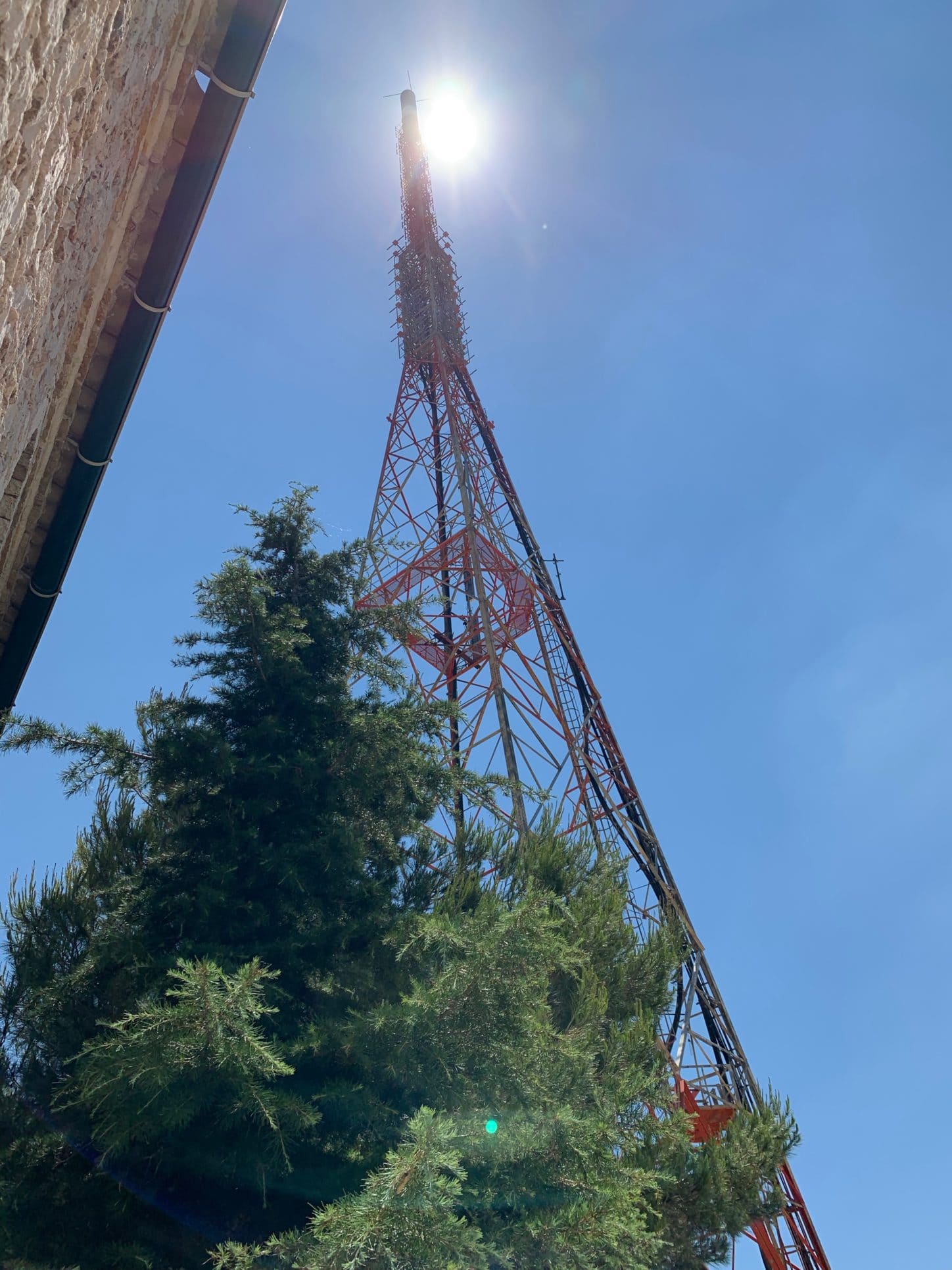
The grounds of the small monastery managed to be beautiful although the four legs of the antenna bracketed it.
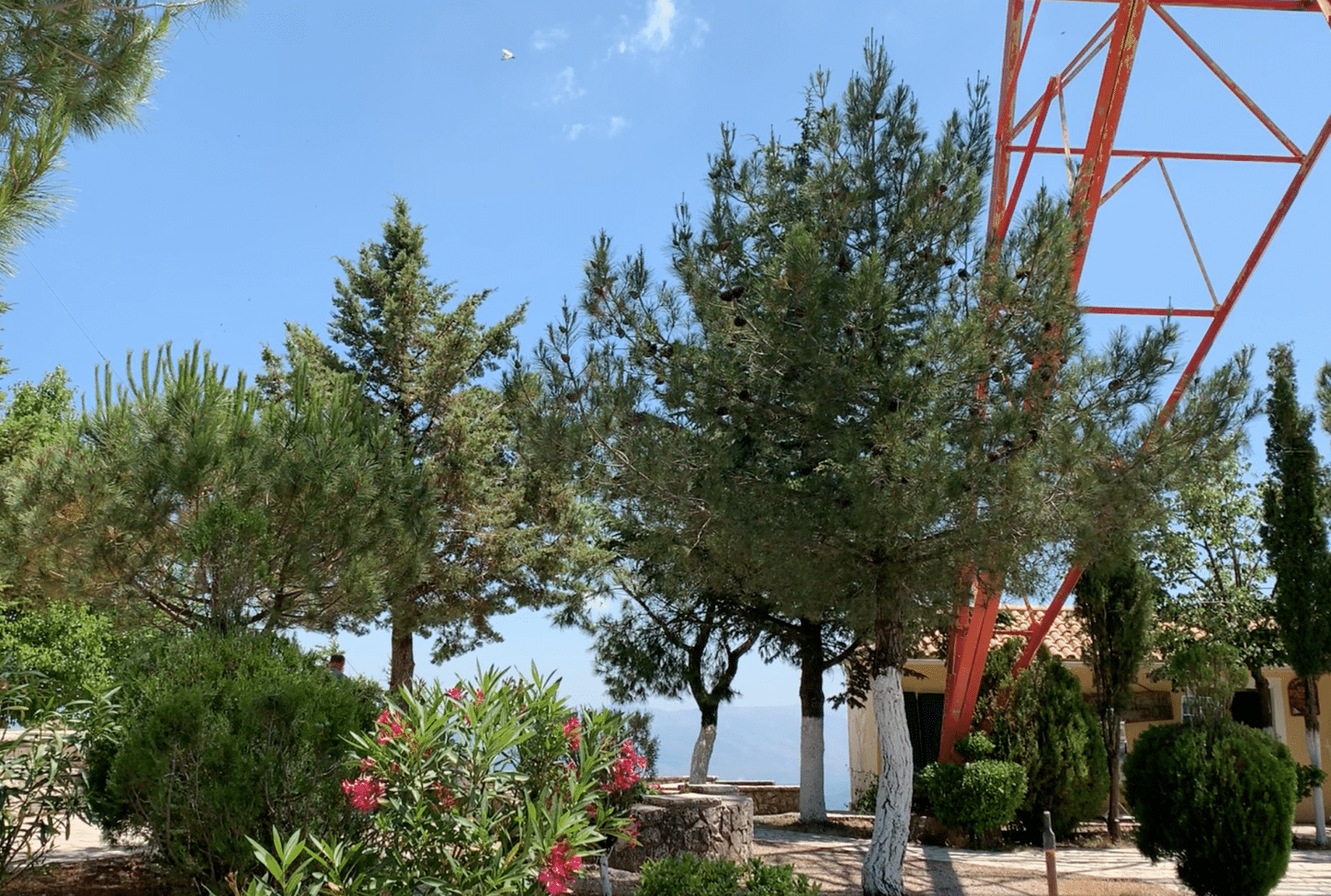
Nick’s fascination with the antennas turned to awe when we forgot them and looked to the horizon. This bright sunny day gave us a spectacular view east across the Ionian Sea to Albania’s Butrint National Park.
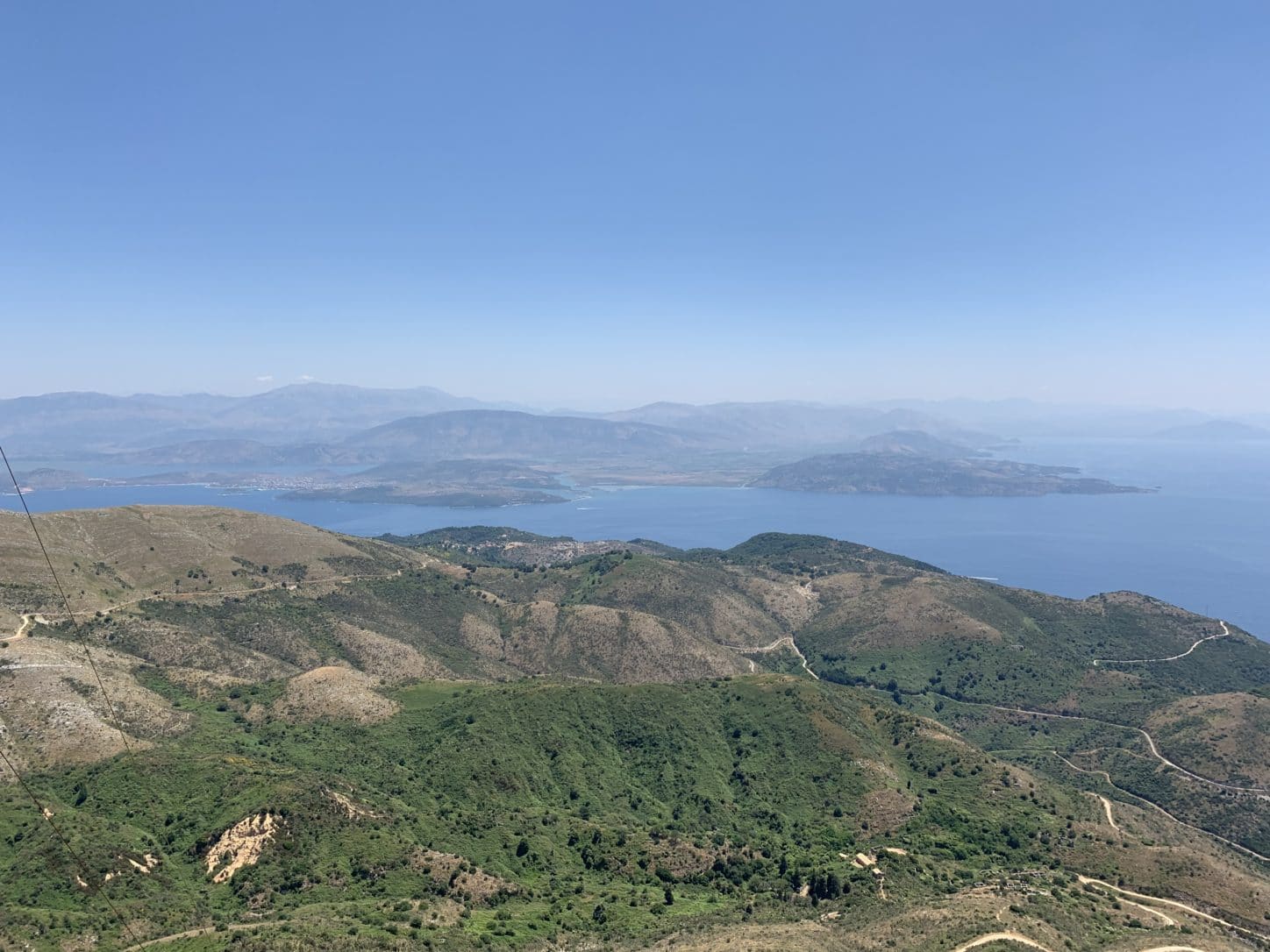
But right there on top of the mountain the monastery maintains a small church that dates to 1347. The outside isn’t much.
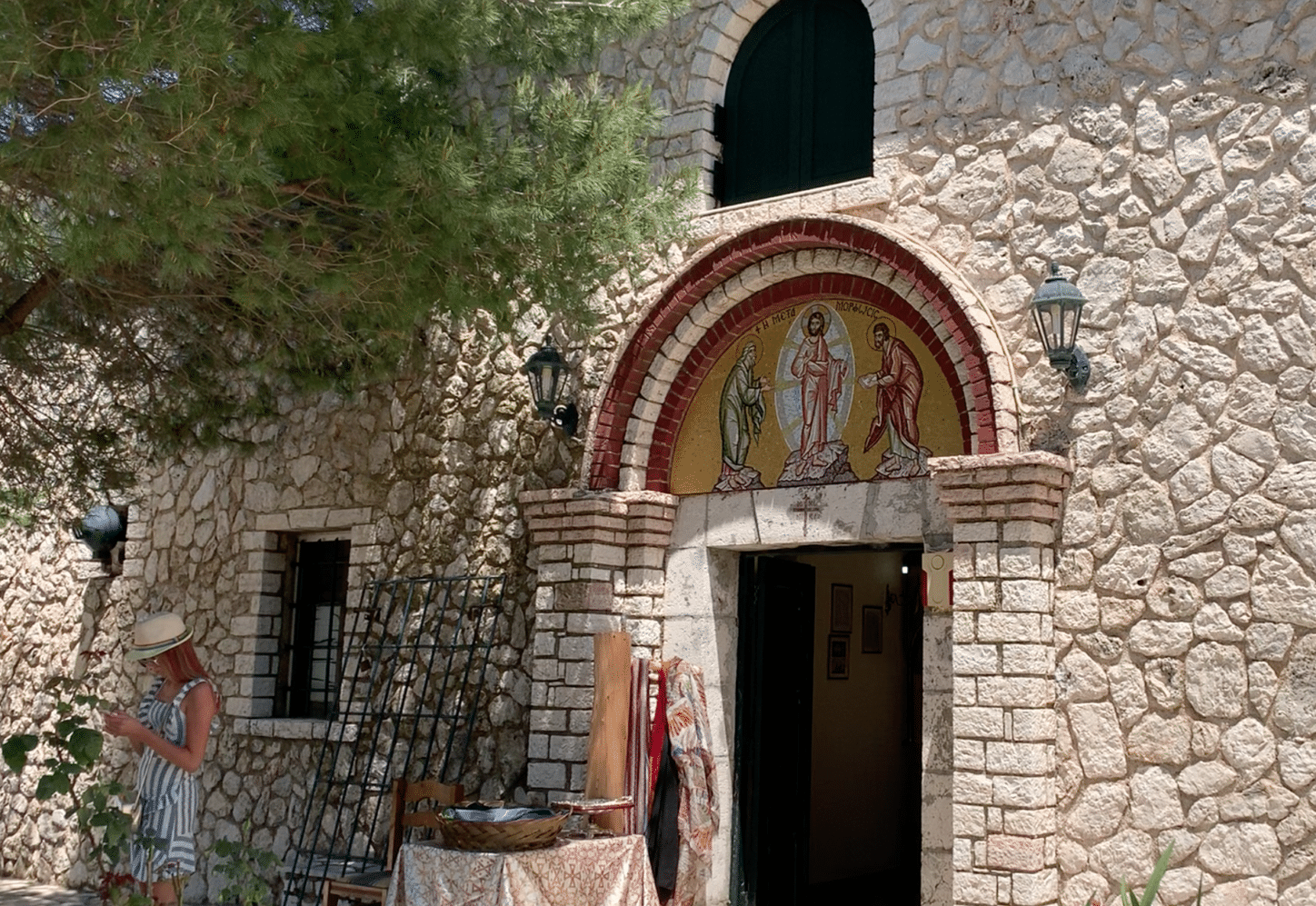
But when you step inside it feels like a little jewel box.
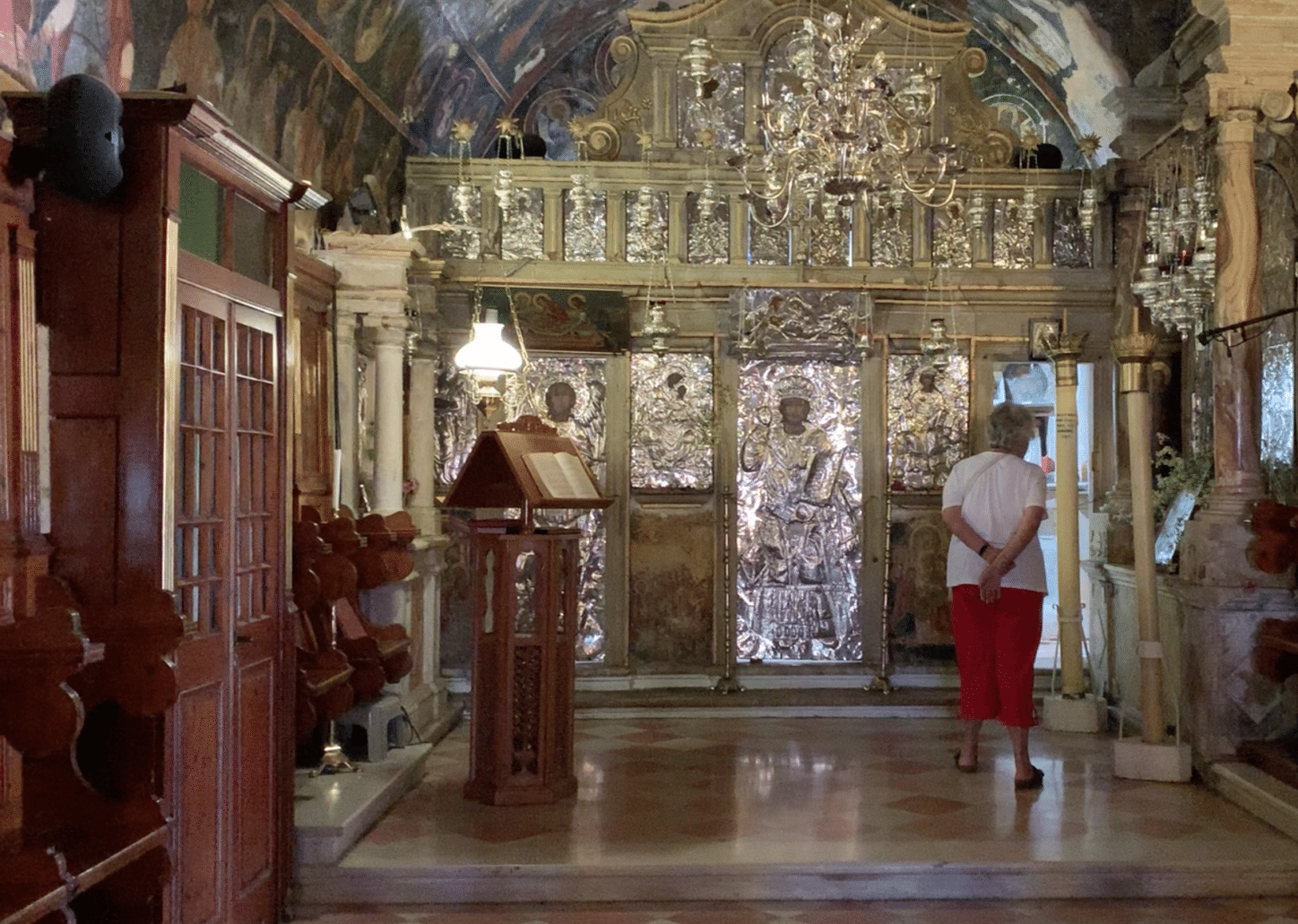
While it is a sacred space, the artistry and craftsmanship seem transcendent.
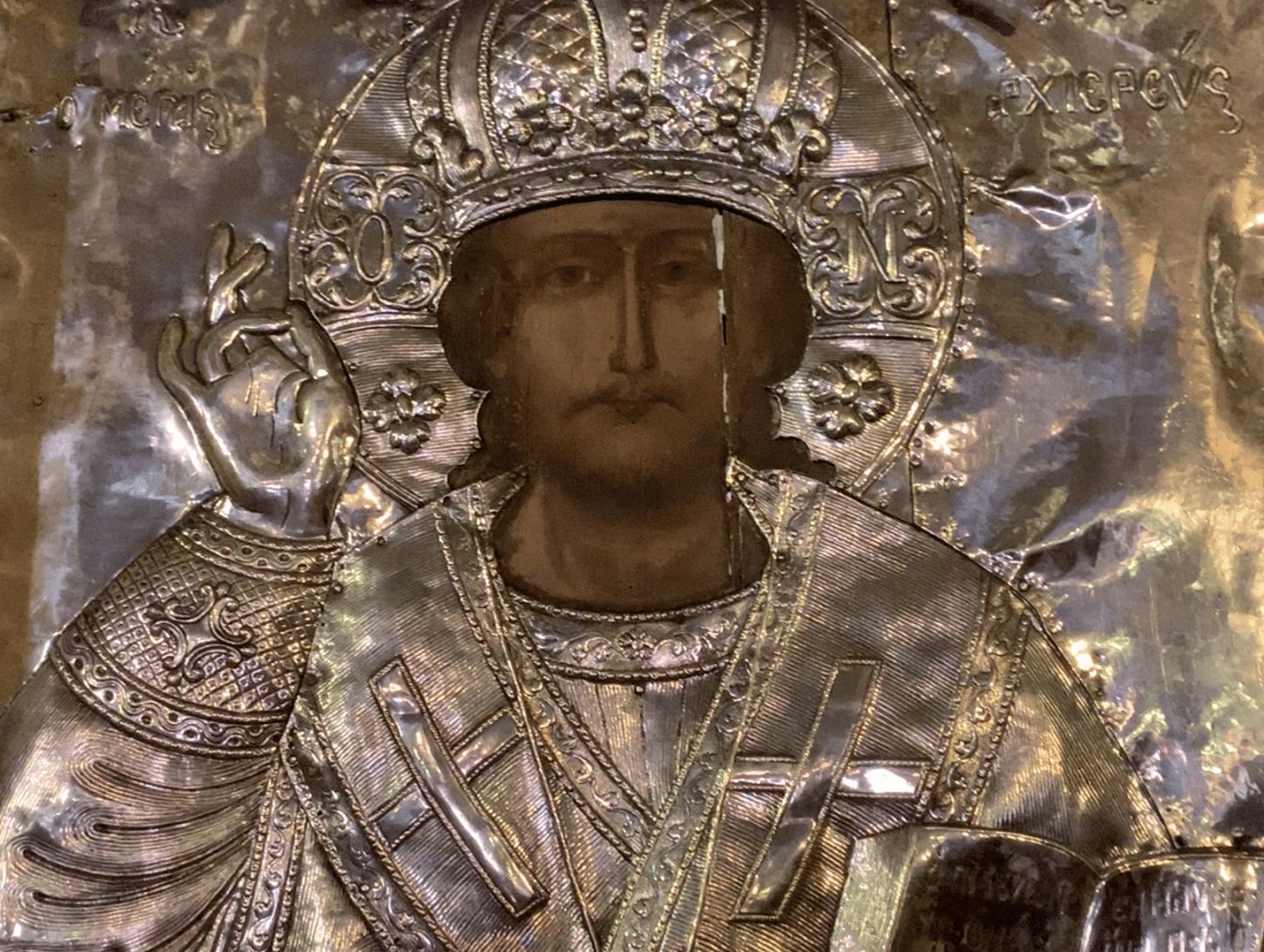
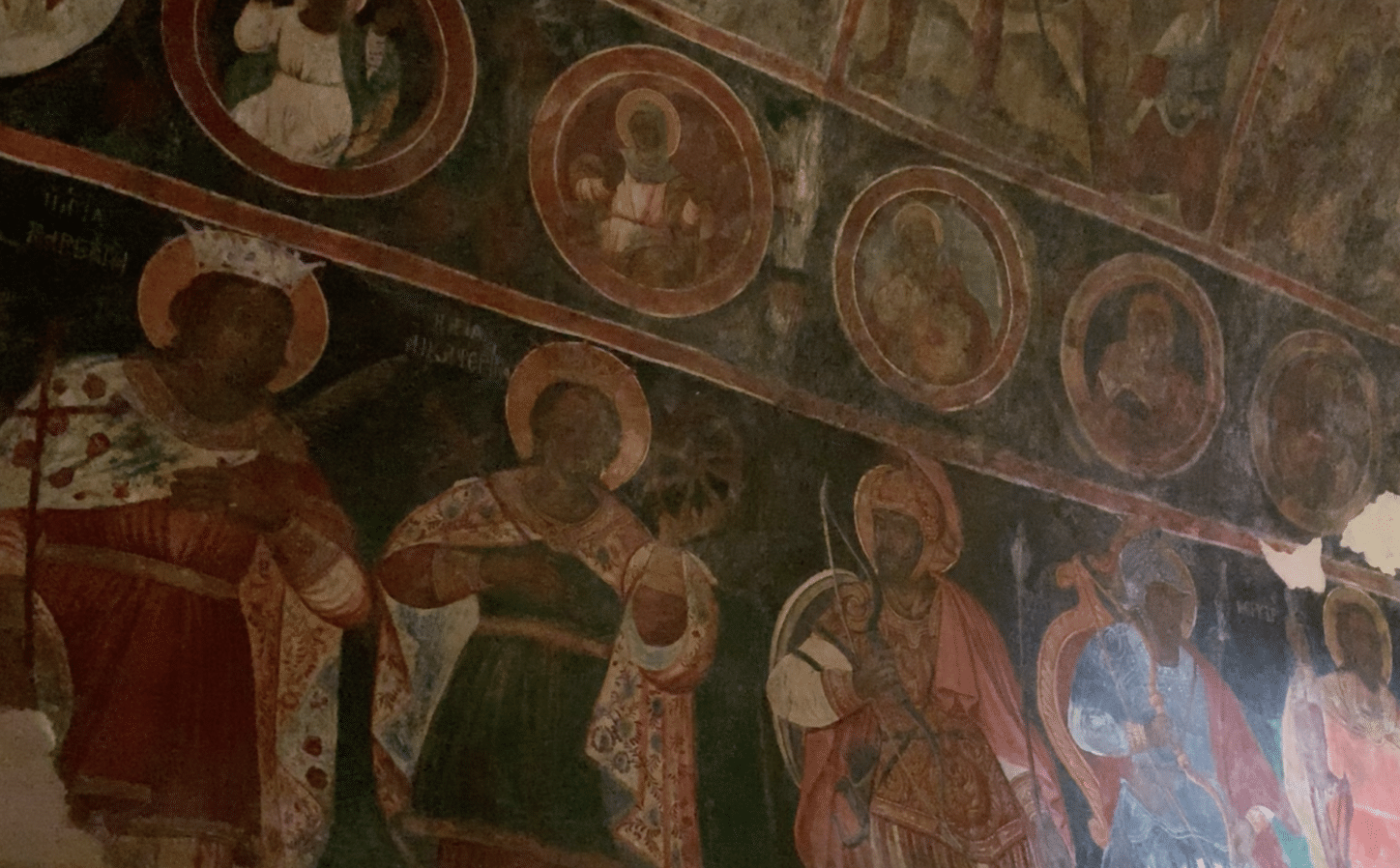
We took our last photos, chased some more butterflies, retraced our route and stopped in a small town on the mountain called Strinilas.
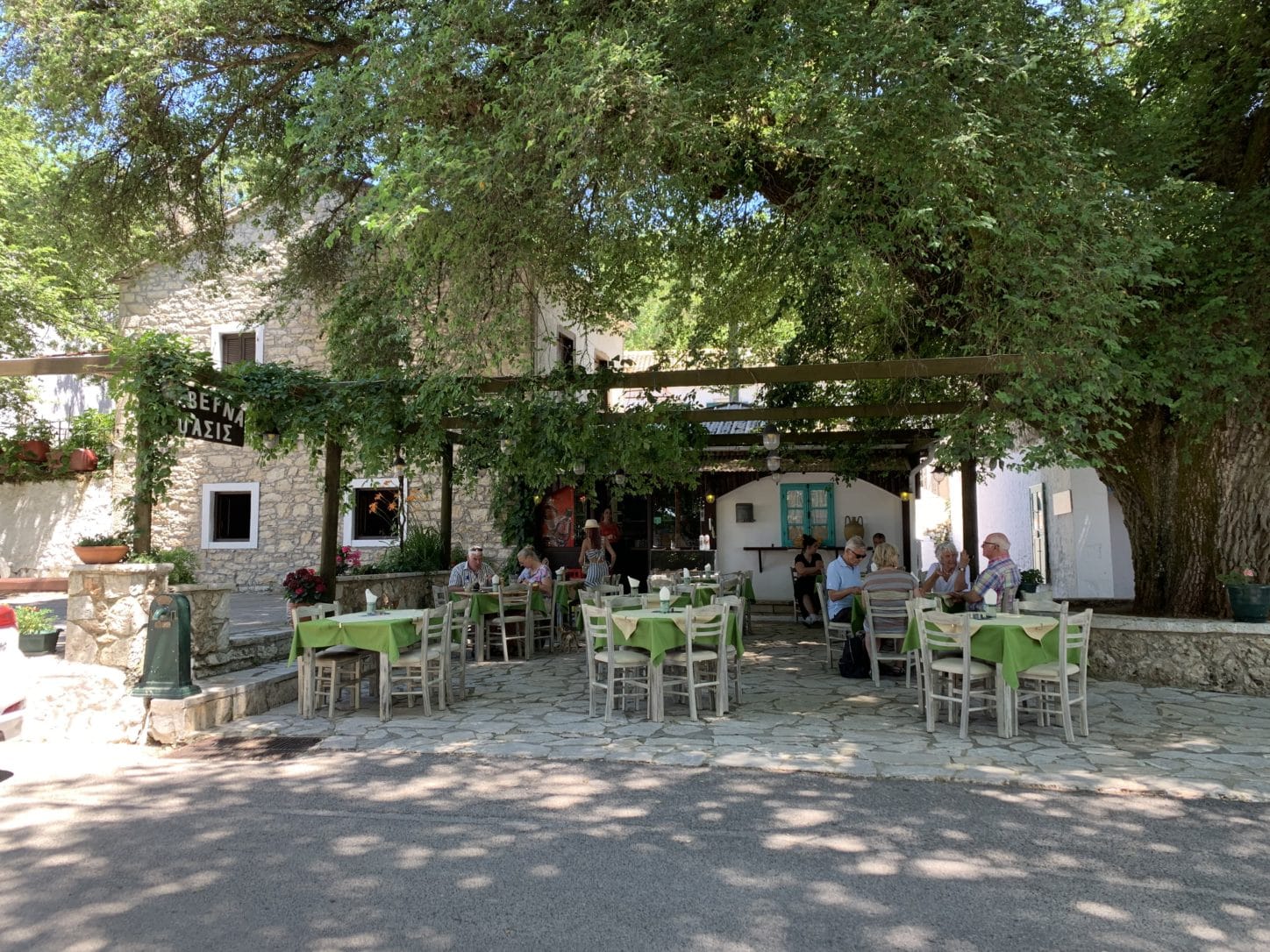
The local store beckoned.
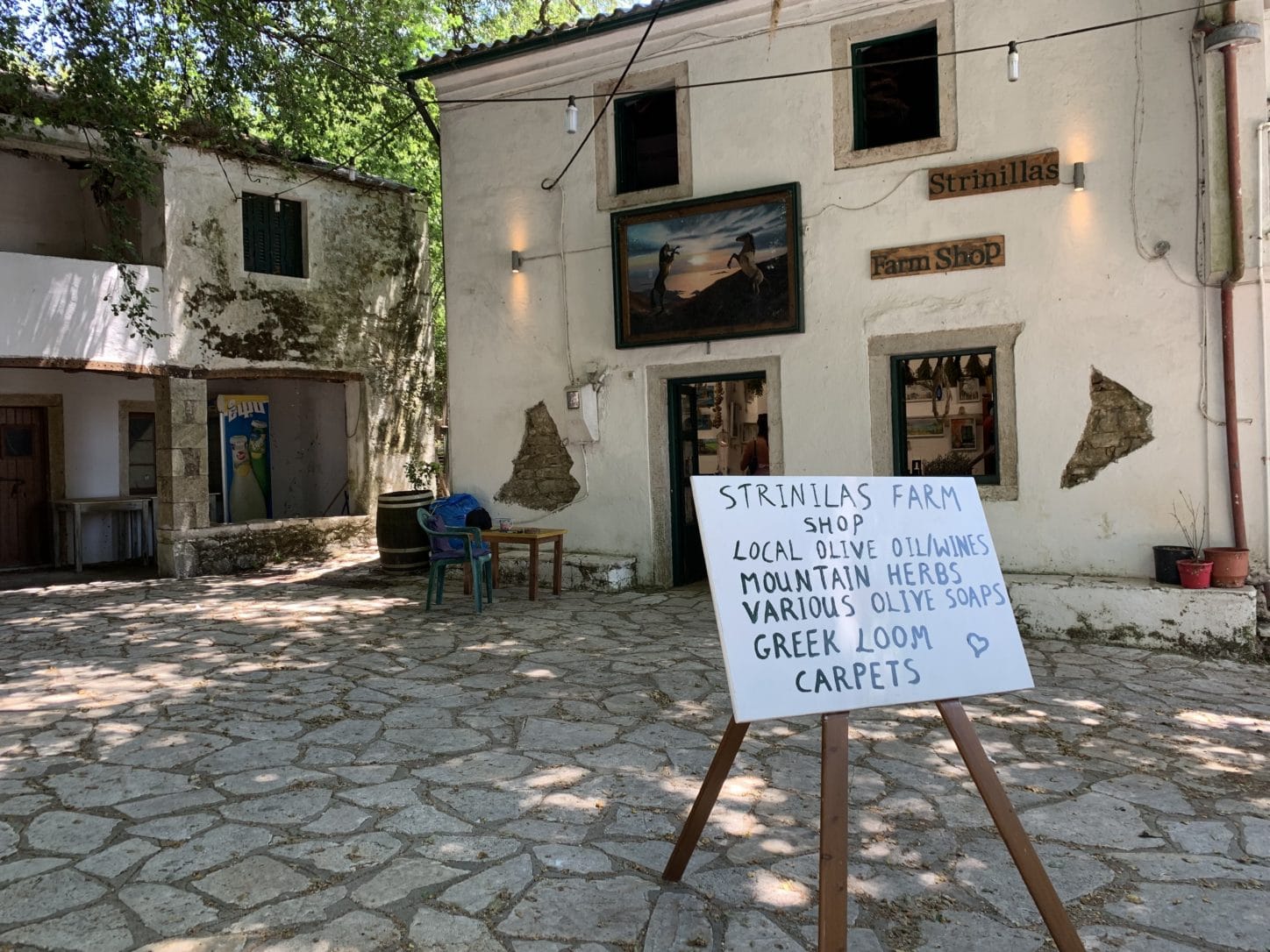
We struck up a conversation with the owner Mario Karas. He told us had lived and worked in the U.K. and the U.S., but his heart was in the hillside olive groves and he returned.
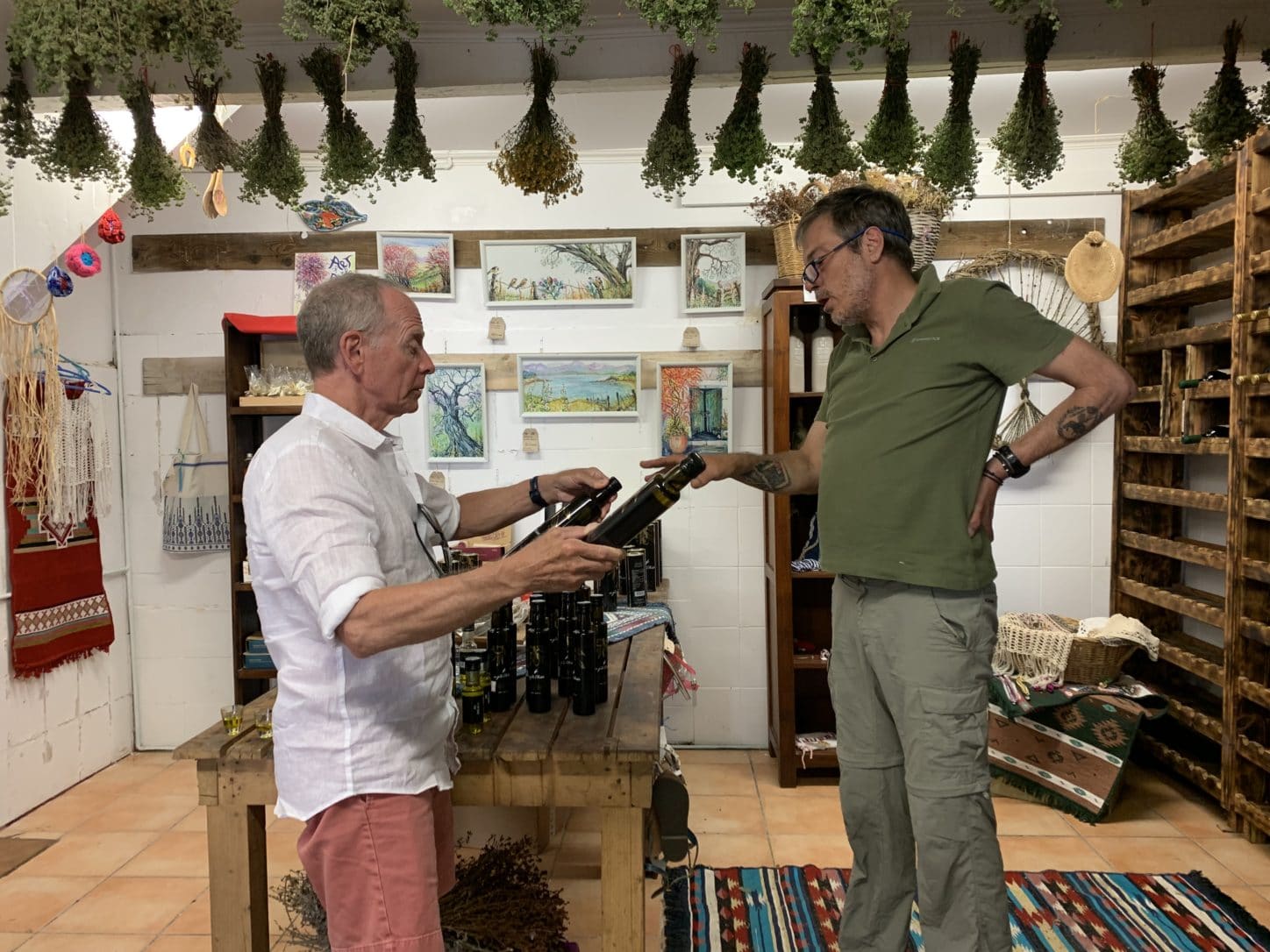
He made and sold olive oil and olive oil soap in his small shop, and also pressed oil from wild olives. “I can’t bottle that. Government regulations,” he said. “But I can sell you some,” he added, holding a plastic container under the tap of a bottle on a shelf.
Mario had little good to say about politicians in Greece and the European Union. He, like others we talked with, bemoaned the rules that govern commerce and seem to make everything harder.
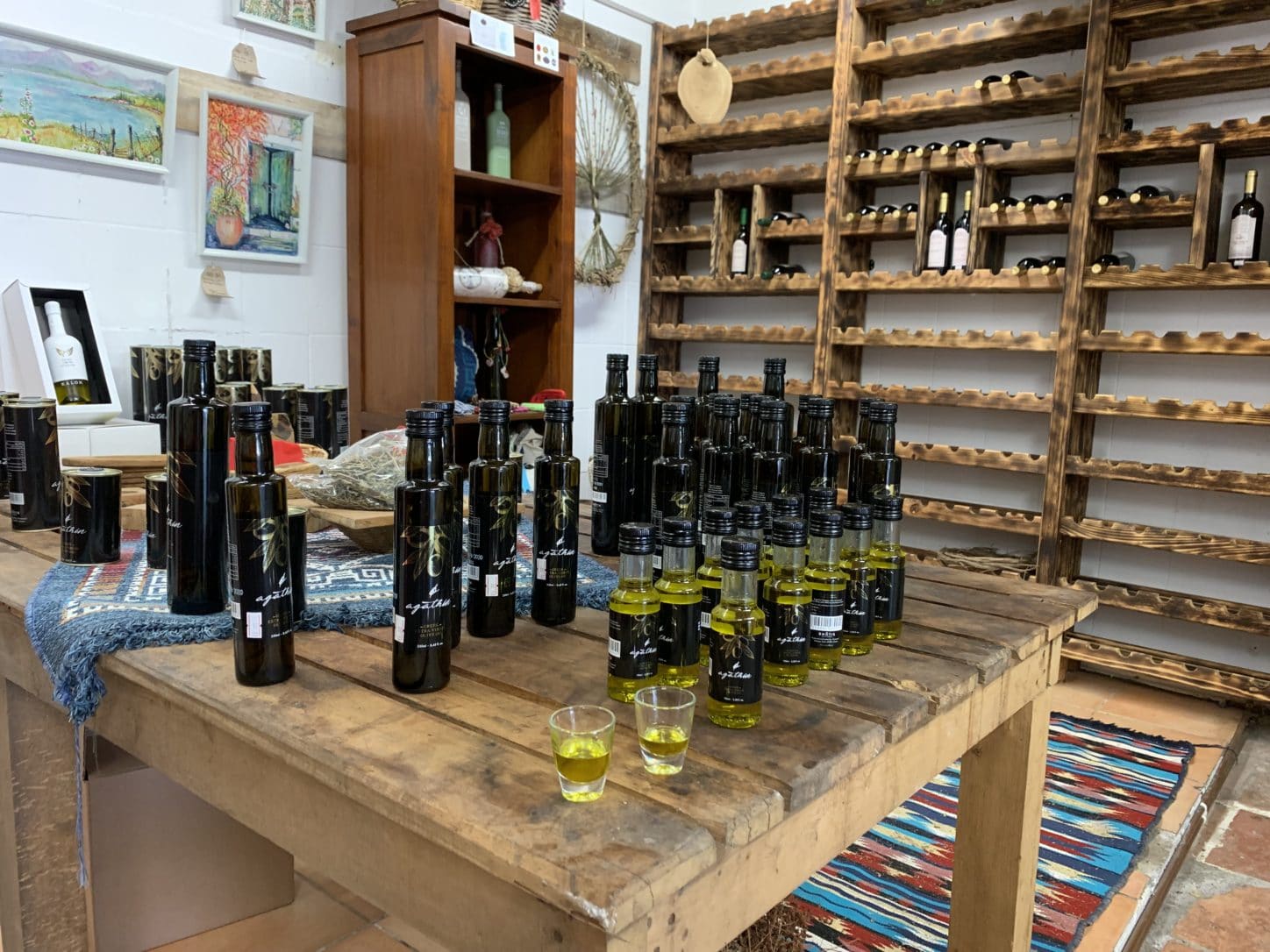
Three airline flights from home was too much for a plastic soda bottle filled with olive oil in our luggage. But we bought a small glass bottle of his regular stock, soap made locally and an embroidered apron.
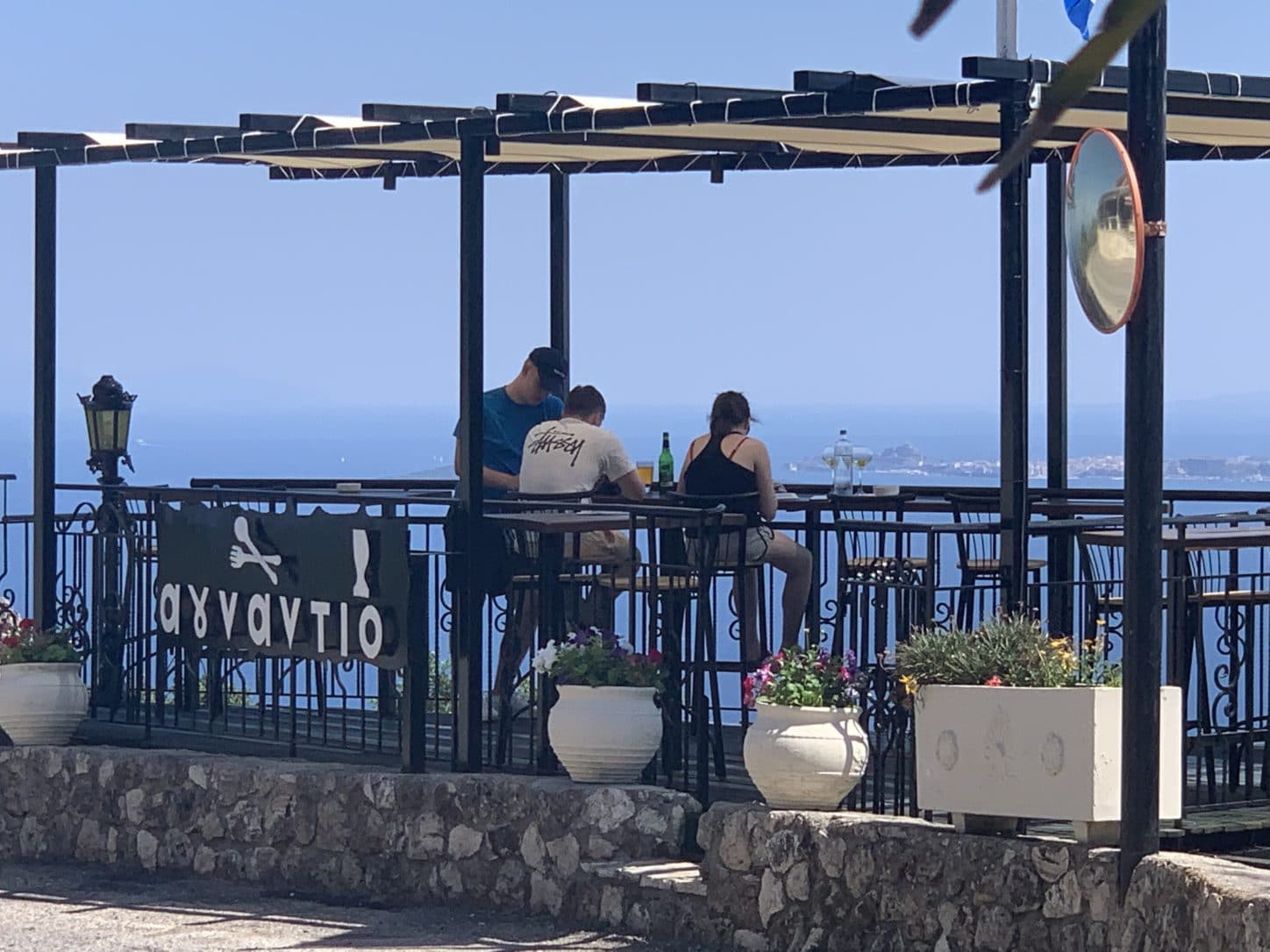
Now was the time to stop at Agnadio Taverna for lunch. George, whether he knew it or not, had been right about the view. The hillside taverna looked out on Ipsos Beach and down the east coast of Corfu.
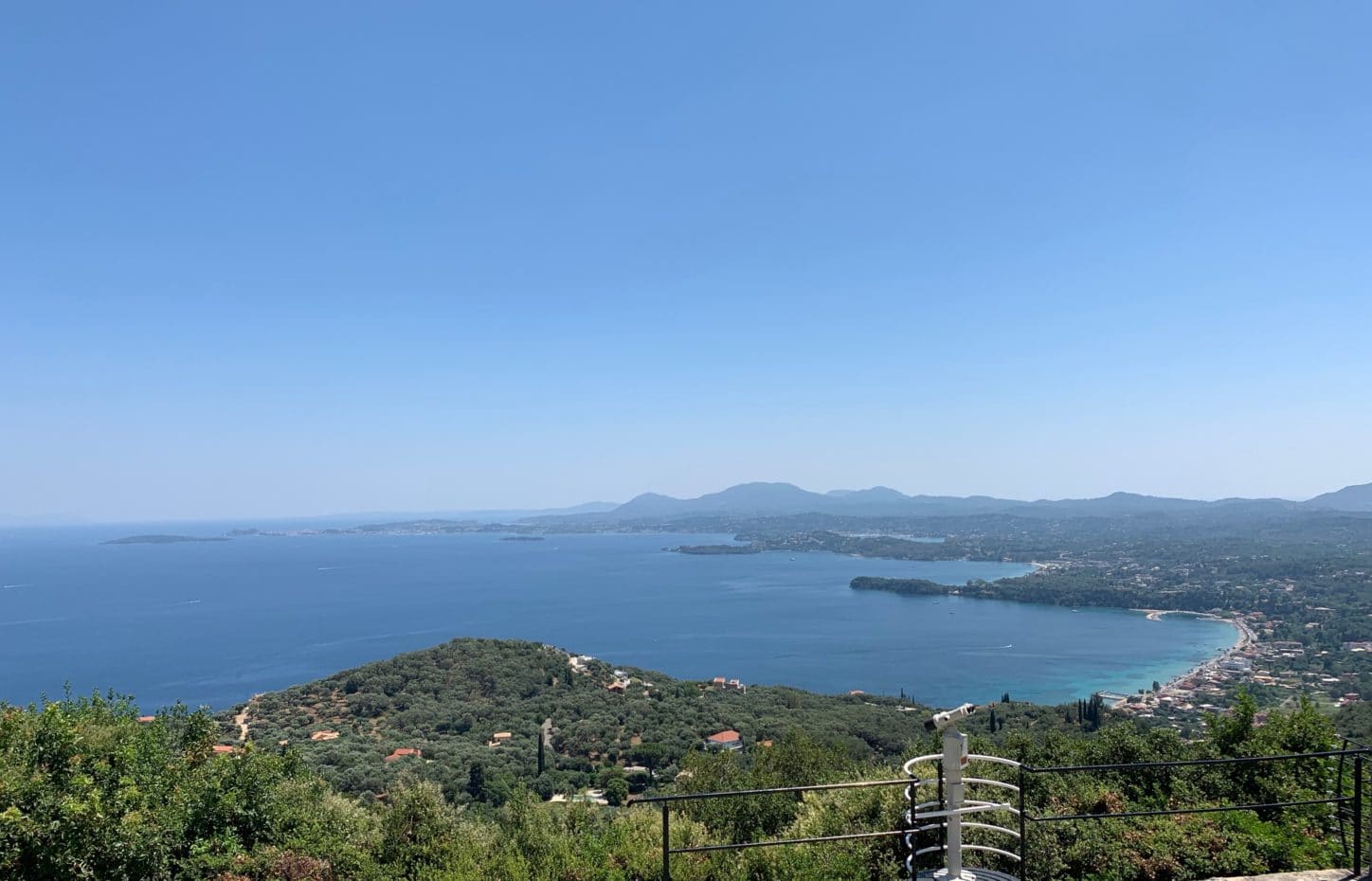
The food was good, too.
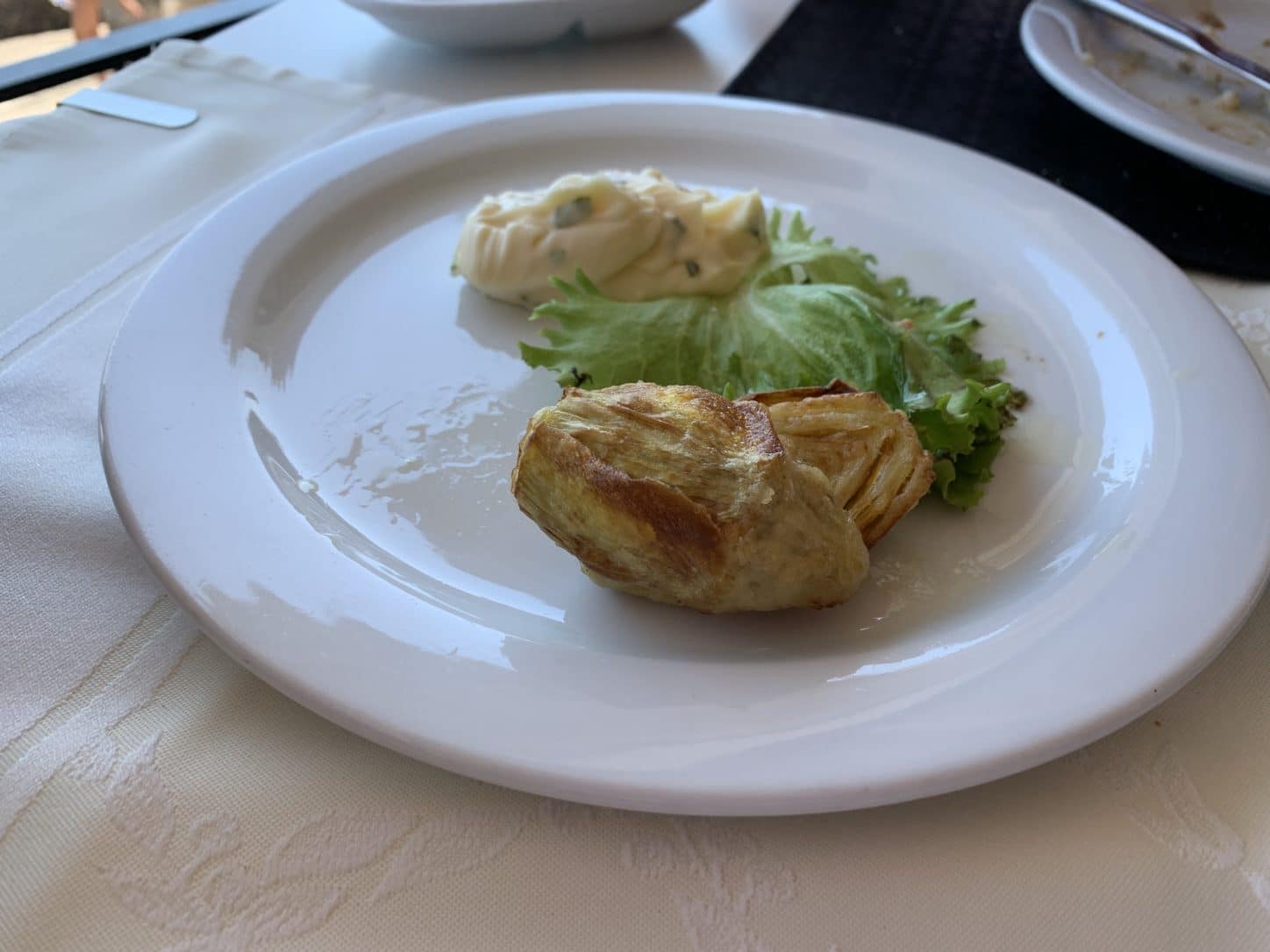
Leaving the tavern and descending the mountain, we took a short detour. Corfu’s northeast coast is known as Kensington-on-Sea for the well-off Brits that summer there. The Durrells lived in the area, and Gerald and his novelist brother Lawrence’s descriptions have lured their fellow Britons ever since. They’re discreet, though. We didn’t see their villas from the road, and we didn’t seek them out at any of the pebbled beaches. The more visible Brits, Corfiots told us, are those who flock to Corfu’s southern beaches to party from morning to night with other young Europeans. We took their word for it.
On the way back to Castello di Vista, we took a closer look at Ipsos Beach. Its pebbly beach didn’t seem to trouble the swimmers splashing in the water.
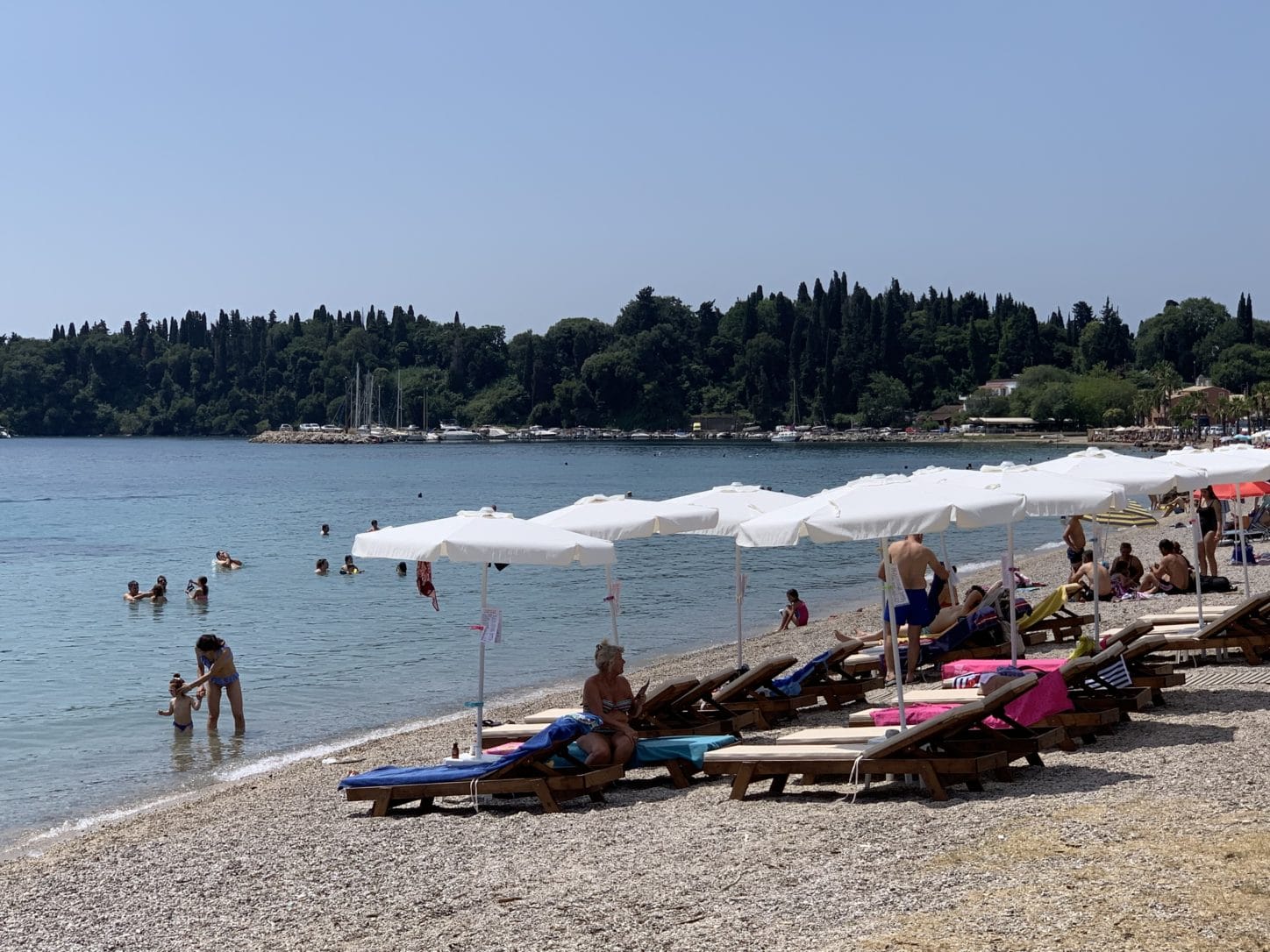
Our beach day was behind us, though. We had an early flight in the morning, first to Athens and from there to Paris. So we hit the hotel pool, played paddle ball as badly as we had the day before, and started packing.
We decided to take a taxi to Gerekos Taverna , a fish place in a town called Gouvia about fifteen minutes south. George called a taxi and was telling us a story about a solo trip to Munich his father had sent him on when he was still a boy, to groom him for a diplomatic career. He sat down in a restaurant, looked at a menu he couldn’t understand, and ordered something. The waiter asked, “Are you sure?”
At that moment, before George could deliver the punchline, a large black Mercedes sedan pierced the gates of Castello di Vista and ascended the driveway. Our taxi had arrived. We’d known George only forty-eight hours and already knew his story had no quick ending. We climbed into the taxi with Christina, a blonde far too slight for the big car she piloted. She backed down the driveway eyeing the rear-view camera dash display, executed a neat turn and plunged into the maze of Kato Korakiana, which she seemed to know perfectly. “I’m from Kato Korakiana and I’ve been driving a taxi for years,” she said to quell any fears we might have had.
Within fifteen stress-free minutes we got out of the taxi, asked Christina to pick us up at 10 o’clock, and sat down outside Taverna Gerekos.
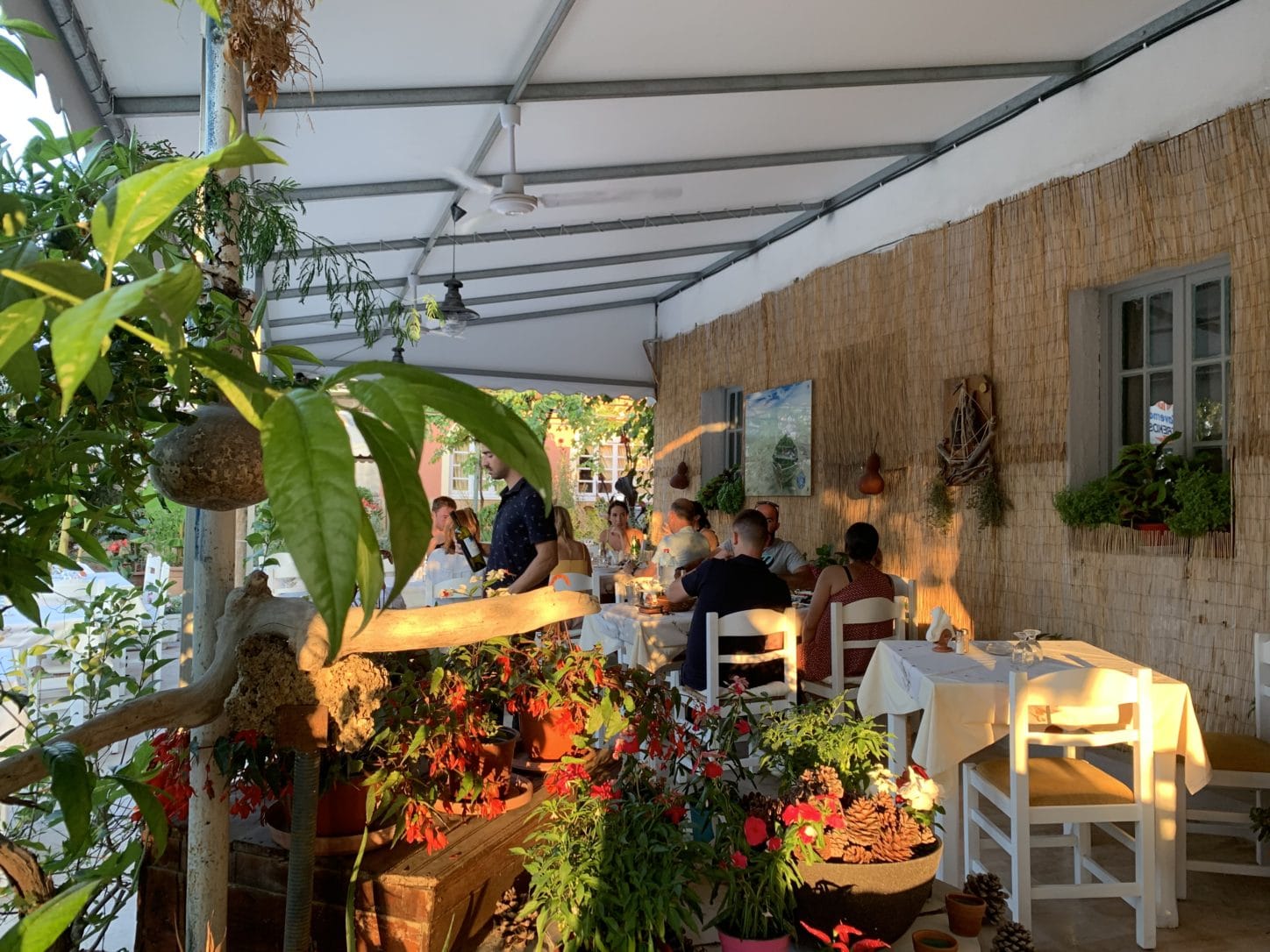
Minutes later the waiter — and owner’s son; it’s a family-run restaurant — came and invited us across the street into the kitchen.
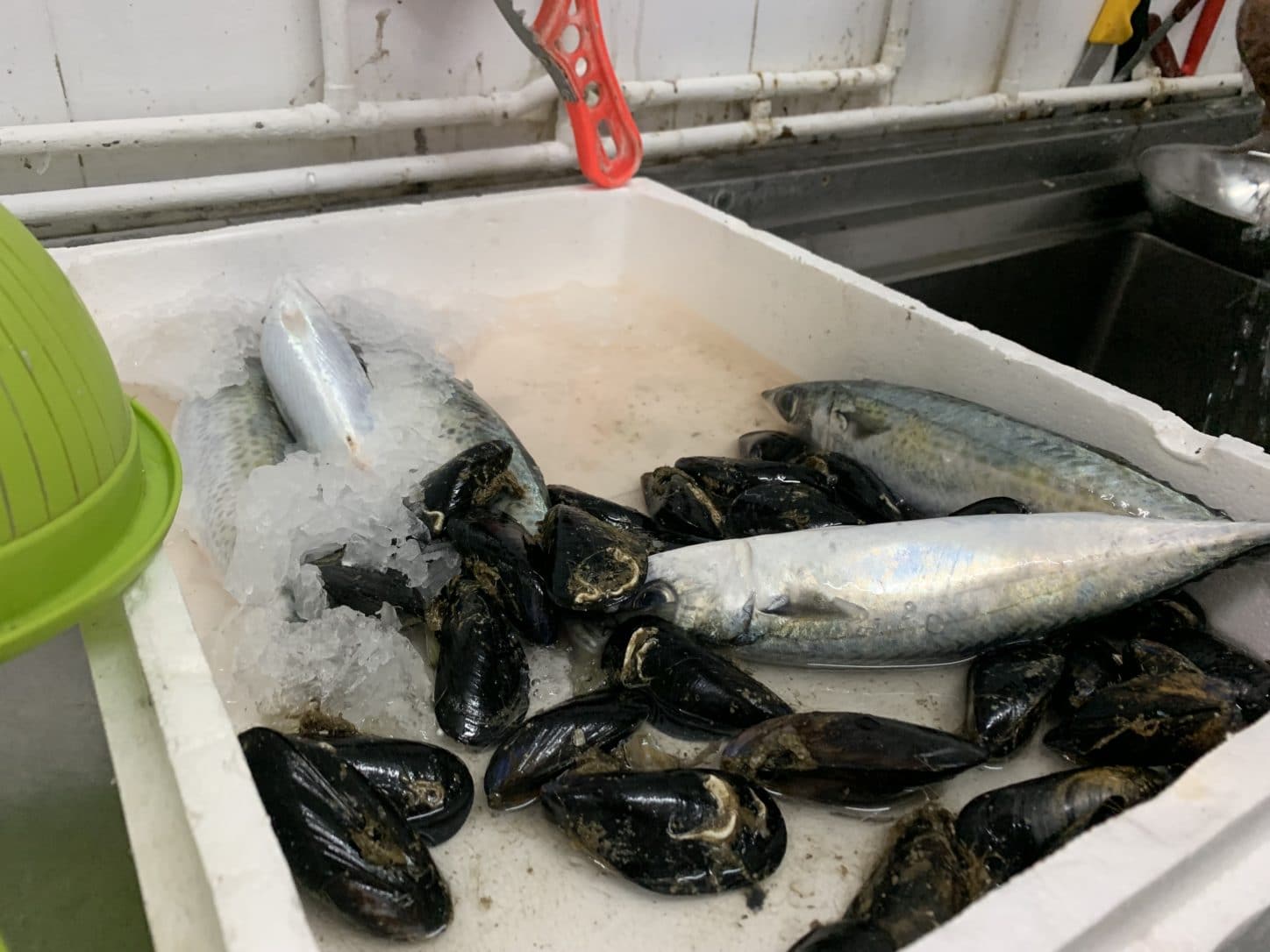
There a large man wearing an apron and a look that said he knew seafood stood in front of a deep sink edged with bins of the day’s catch.
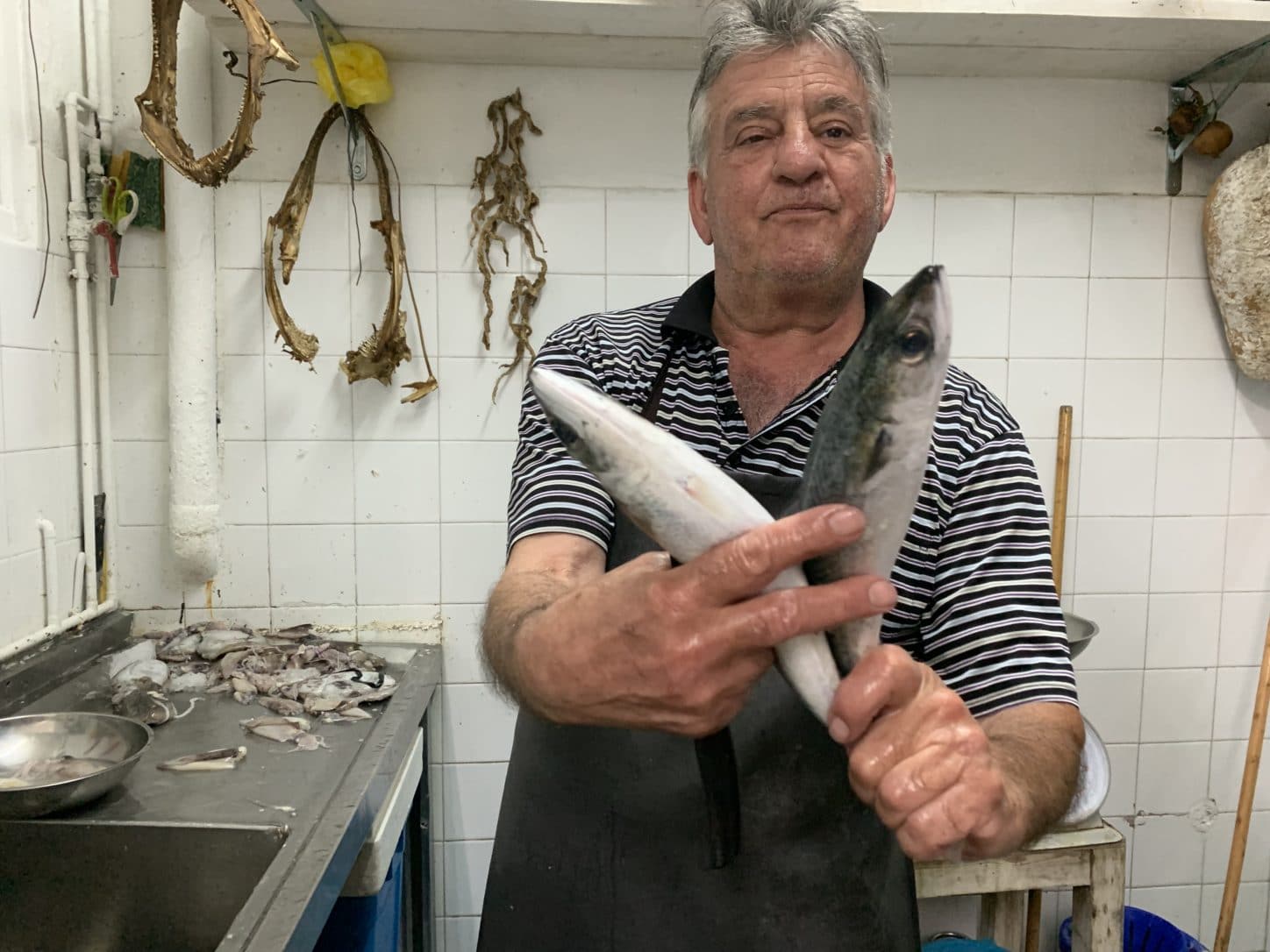
He pointed to some squid and langoustine, then picked up two mackerel and waved them in front of us to show us they were fresh. “He says you should have this tonight,” the waiter said.
Nearby, two women gave us a preview of the cooking method.
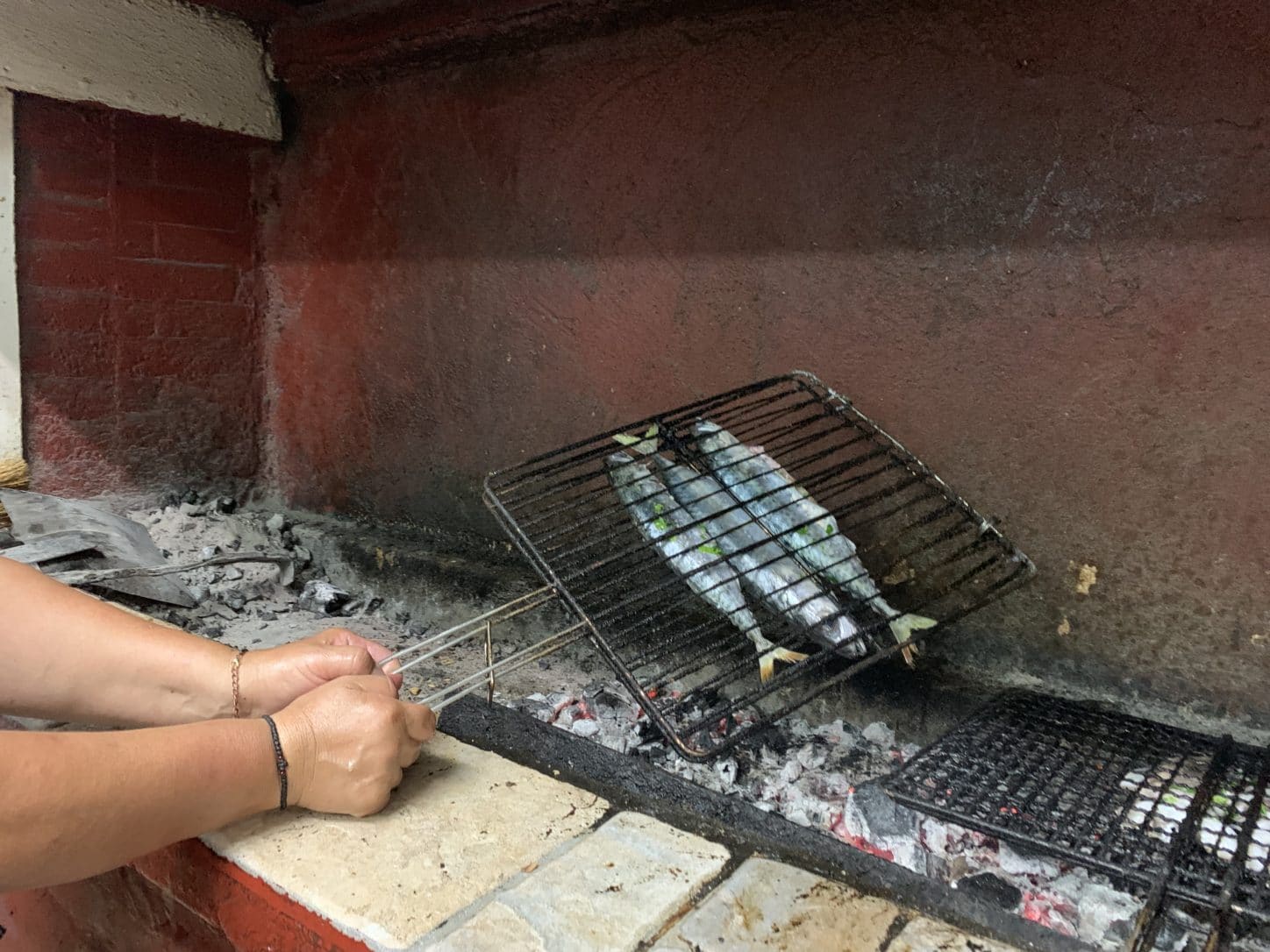
We went back to our table, enjoyed salads, and minutes later the waiter put platters of squid before us.
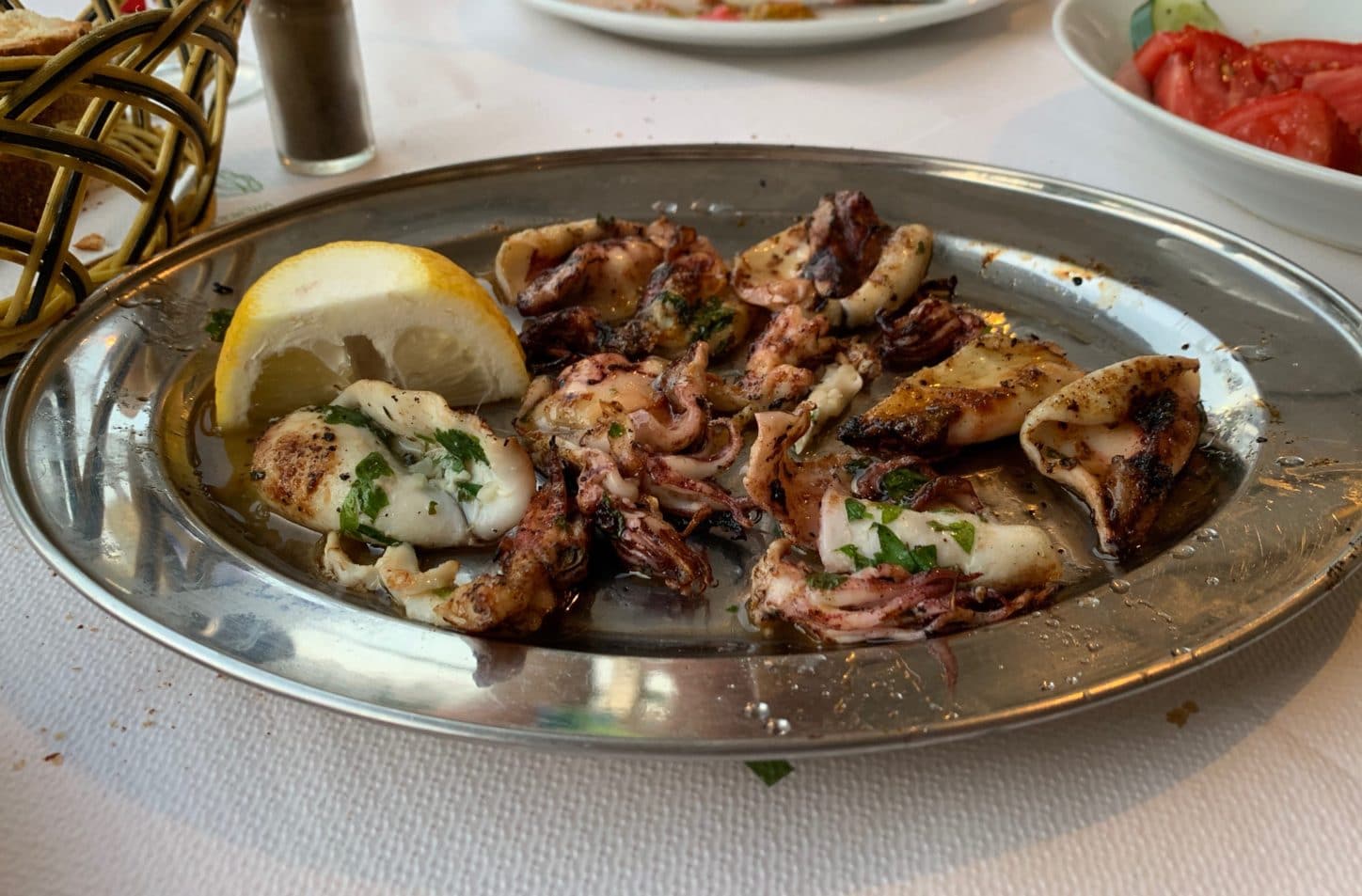
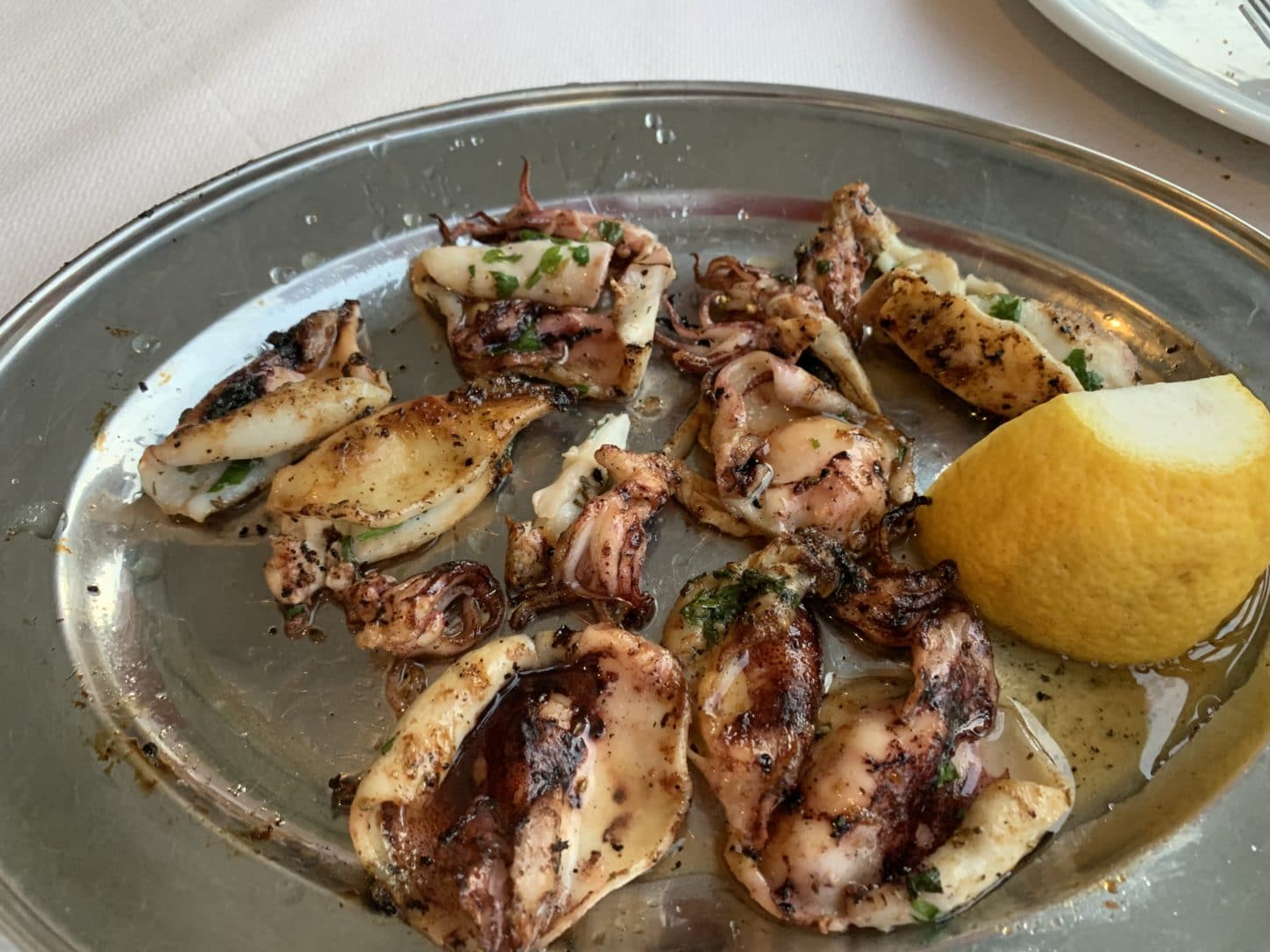
And then came a platter of langoustine.
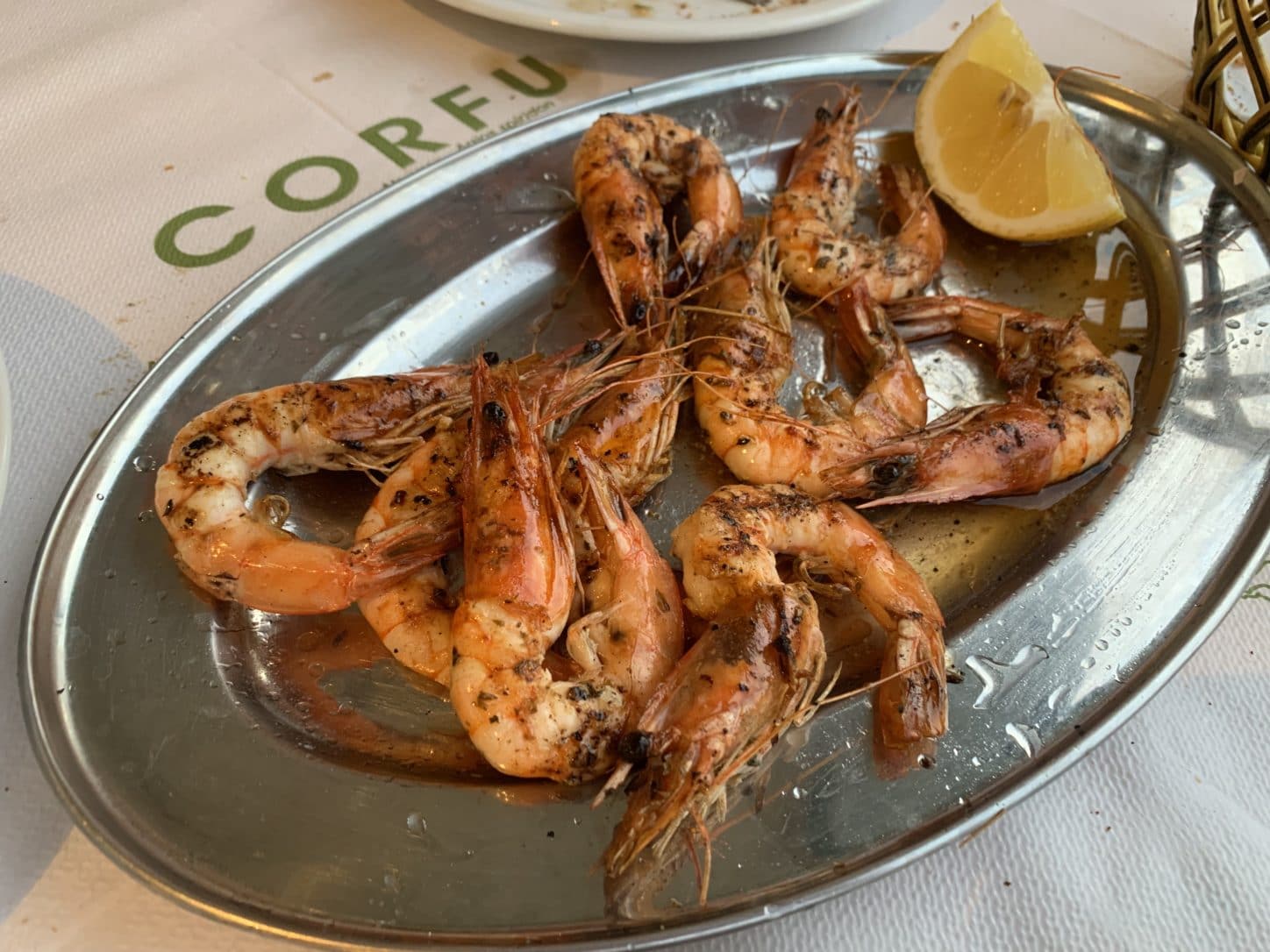
And then the promised mackeral.
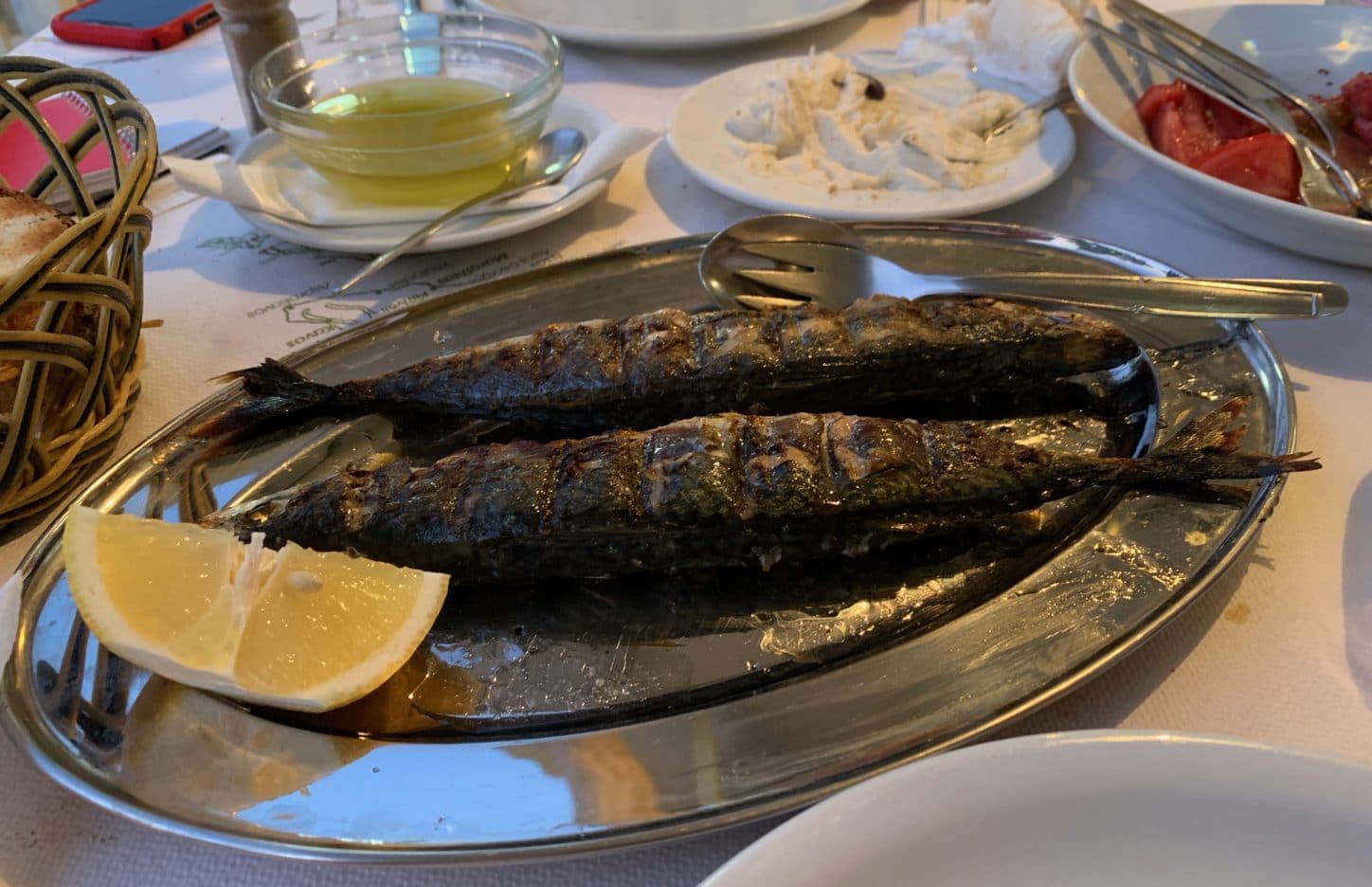
We loved the food and could eat in Gerekos every night. But we hadn’t reckoned on the cats.
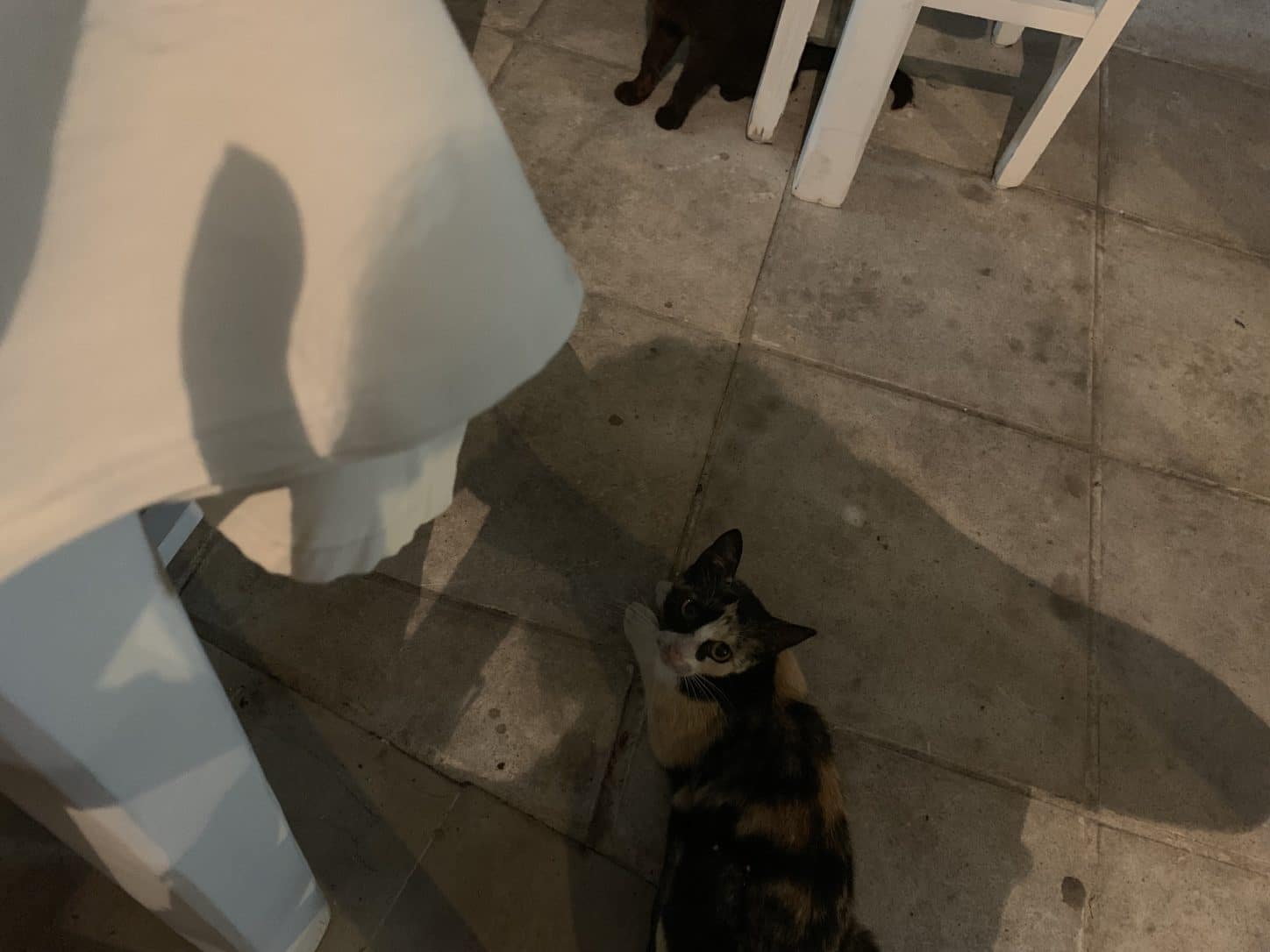
The cats appeared as soon as the fish did and we made the mistake of throwing them a few bits. Nick put his hand down and one scratched and drew blood when it grabbed the food.
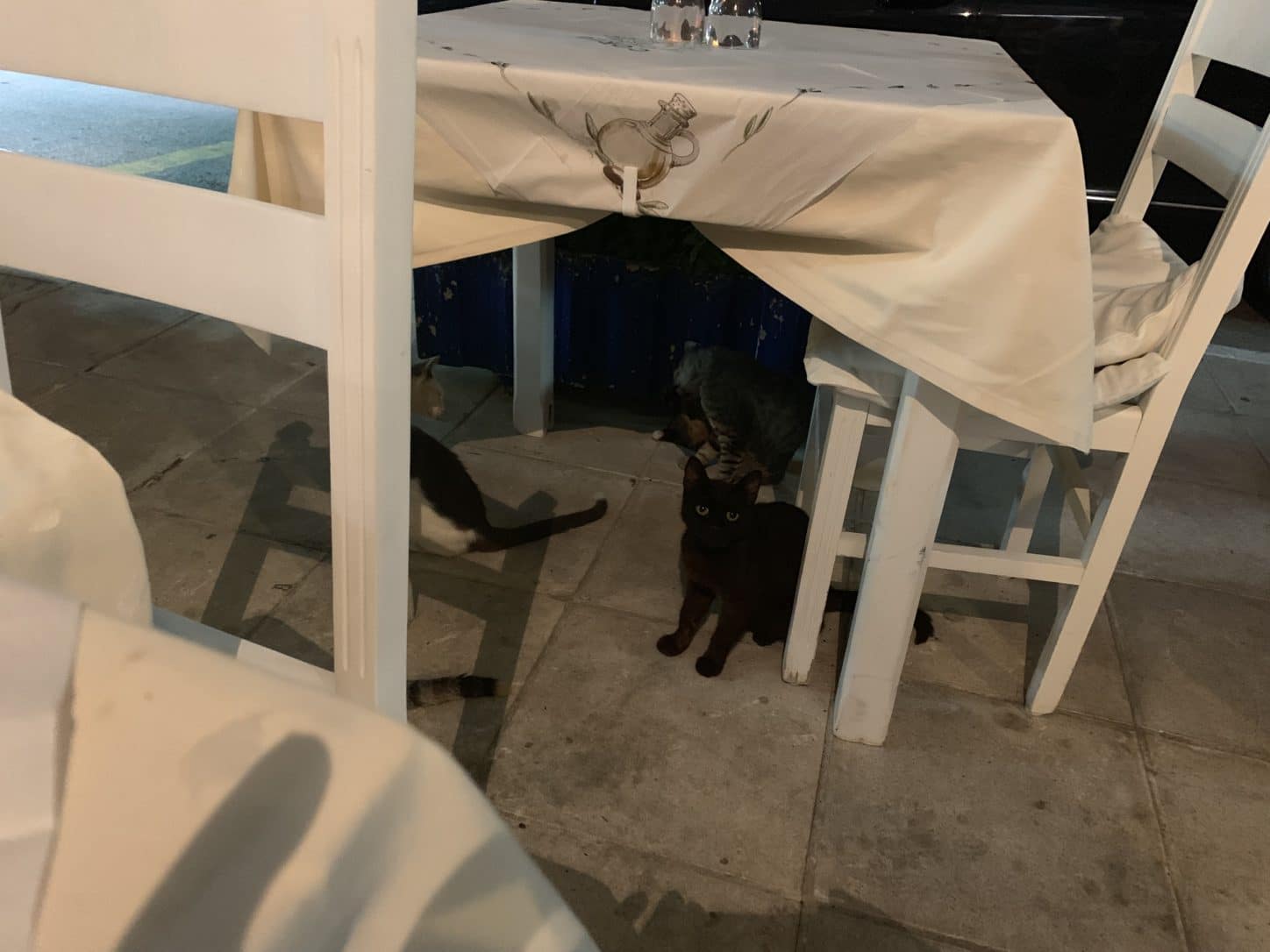
Despite the cats we enjoyed our meal and when Christina returned to pick us up we took what was left of our bottle of Assyrtiko. She found Castello di Vista more easily than we would have. We fixed Nick’s cat scratch, had our nightcap and set the alarm for 5:30 a.m.
Our last morning on Corfu greeted us with a brilliant pink horizon to the east.
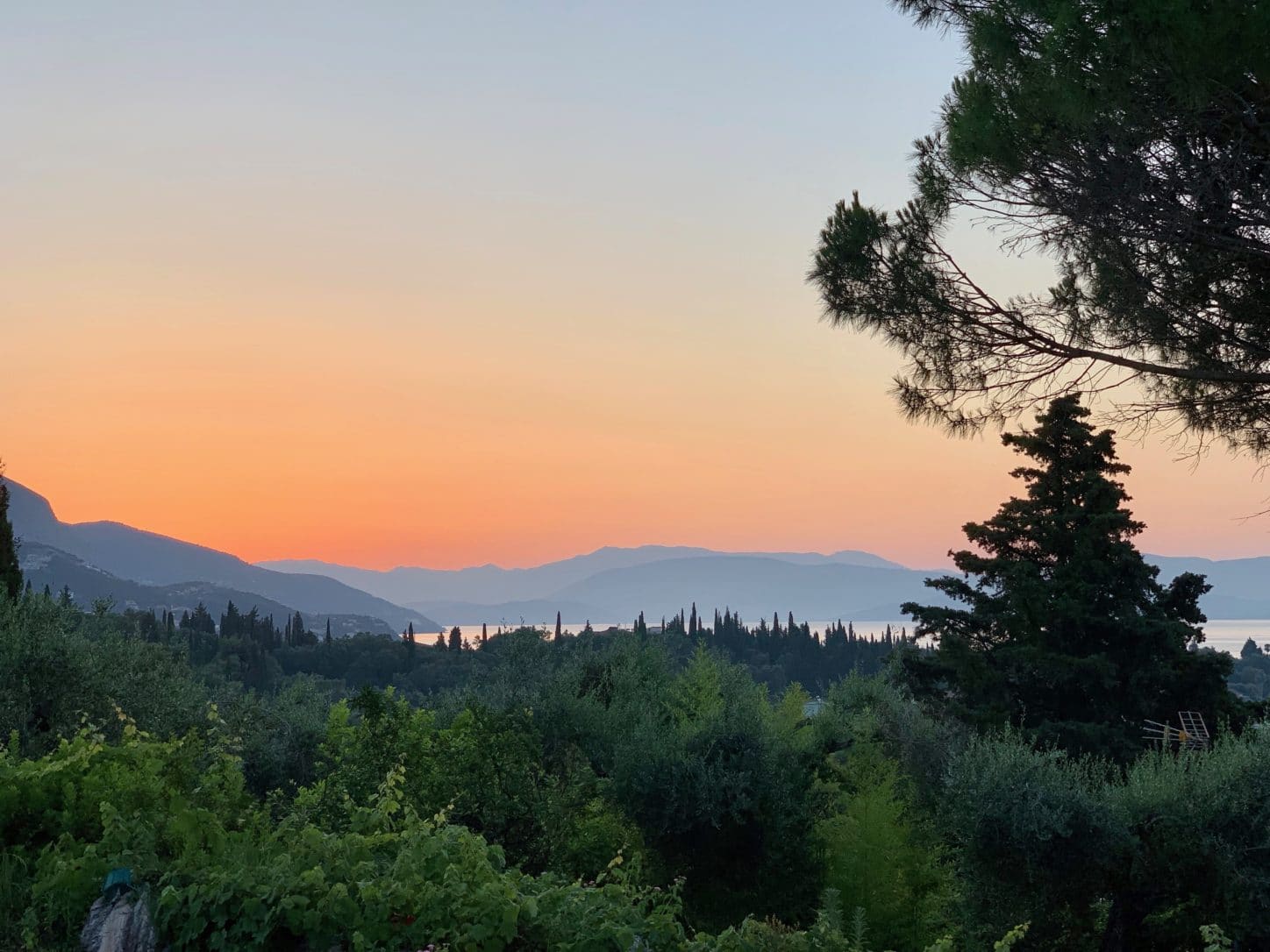
We reached the airport by 7:00, put our car keys through a slot at the unmanned Avis counter, and had time to wait for our Sky Express flight to Athens.
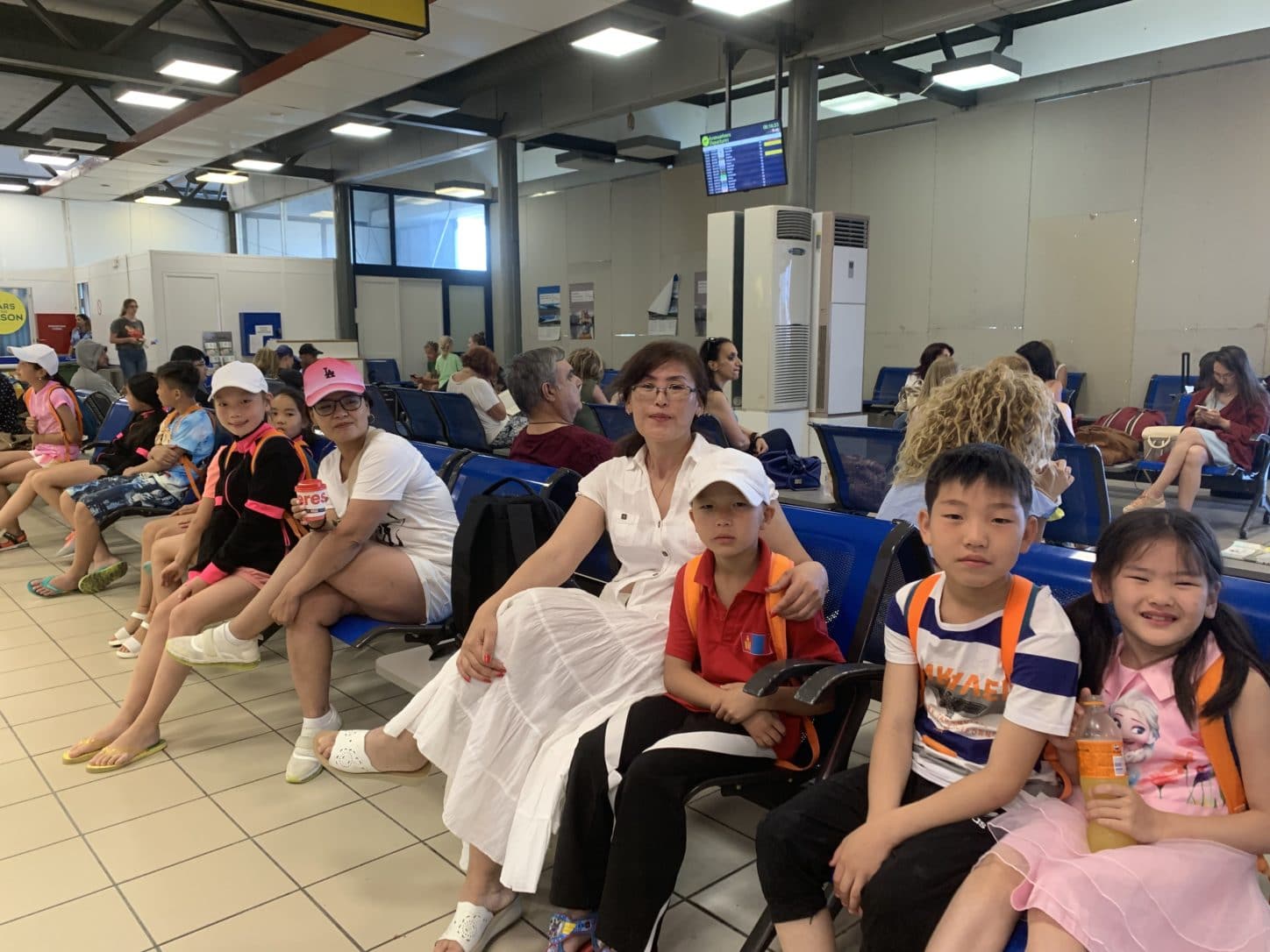
We had a delightful time talking to Augie, a fellow traveler who led the Mongolian Children’s Fitness Team. That’s her pretty daughter in pink. This group of kids, ages 8 to 13, had joined a one-day competition, run by the International Federation of Body Building Fitness, in Corfu and come away with a couple of medals and were headed home via Athens to Moscow and then Mongolia.
We were headed to Paris to enjoy the The City of Light for few days.
